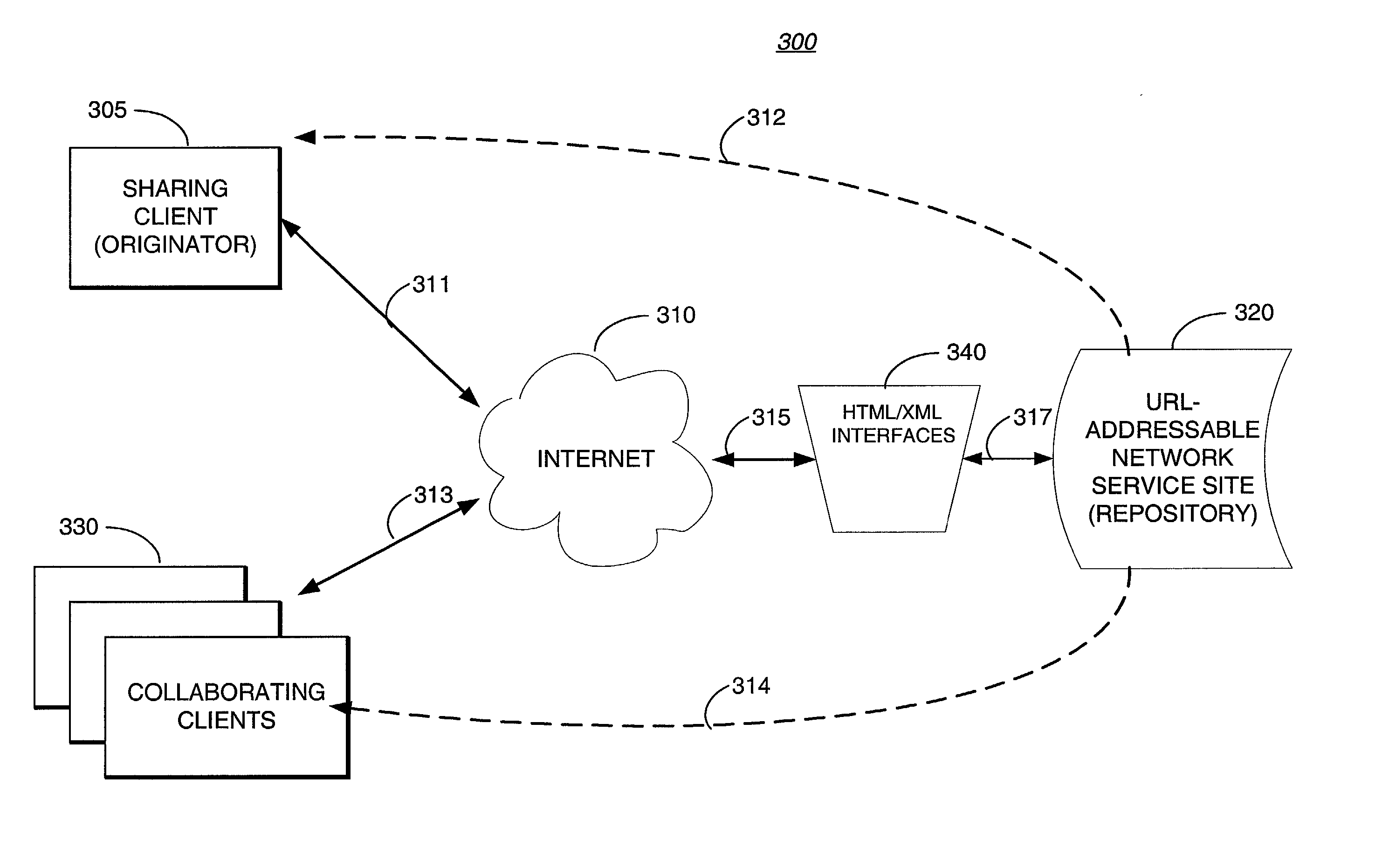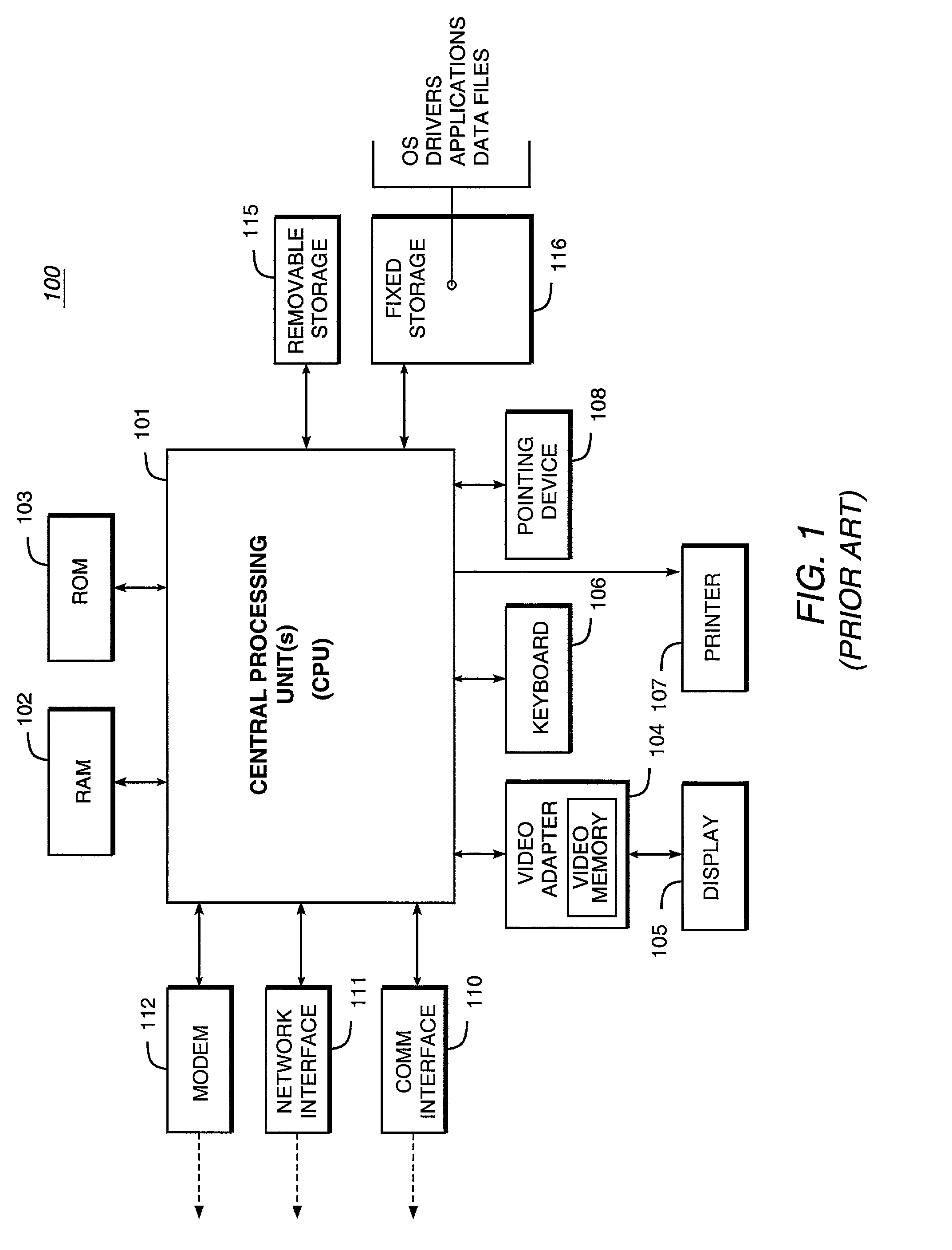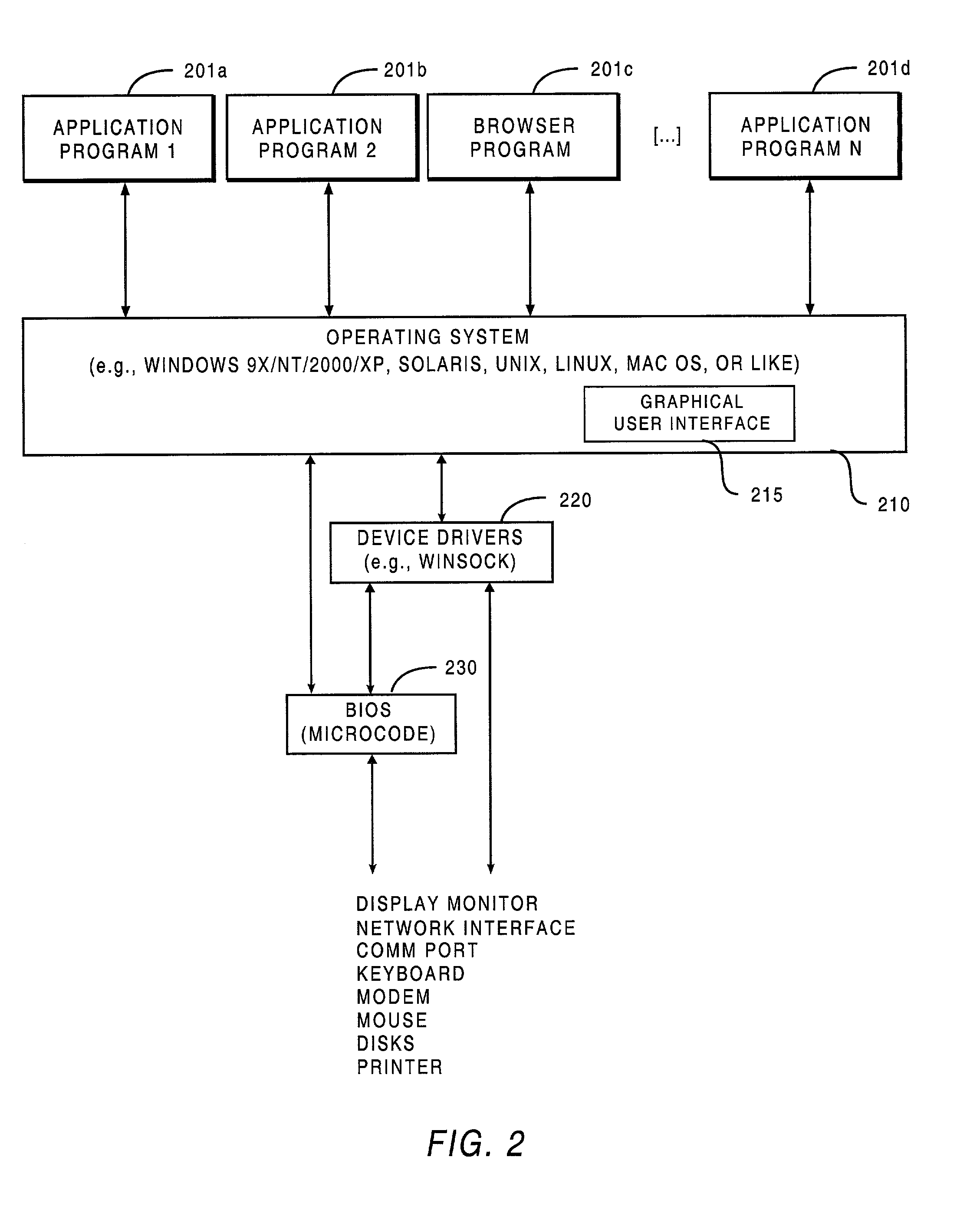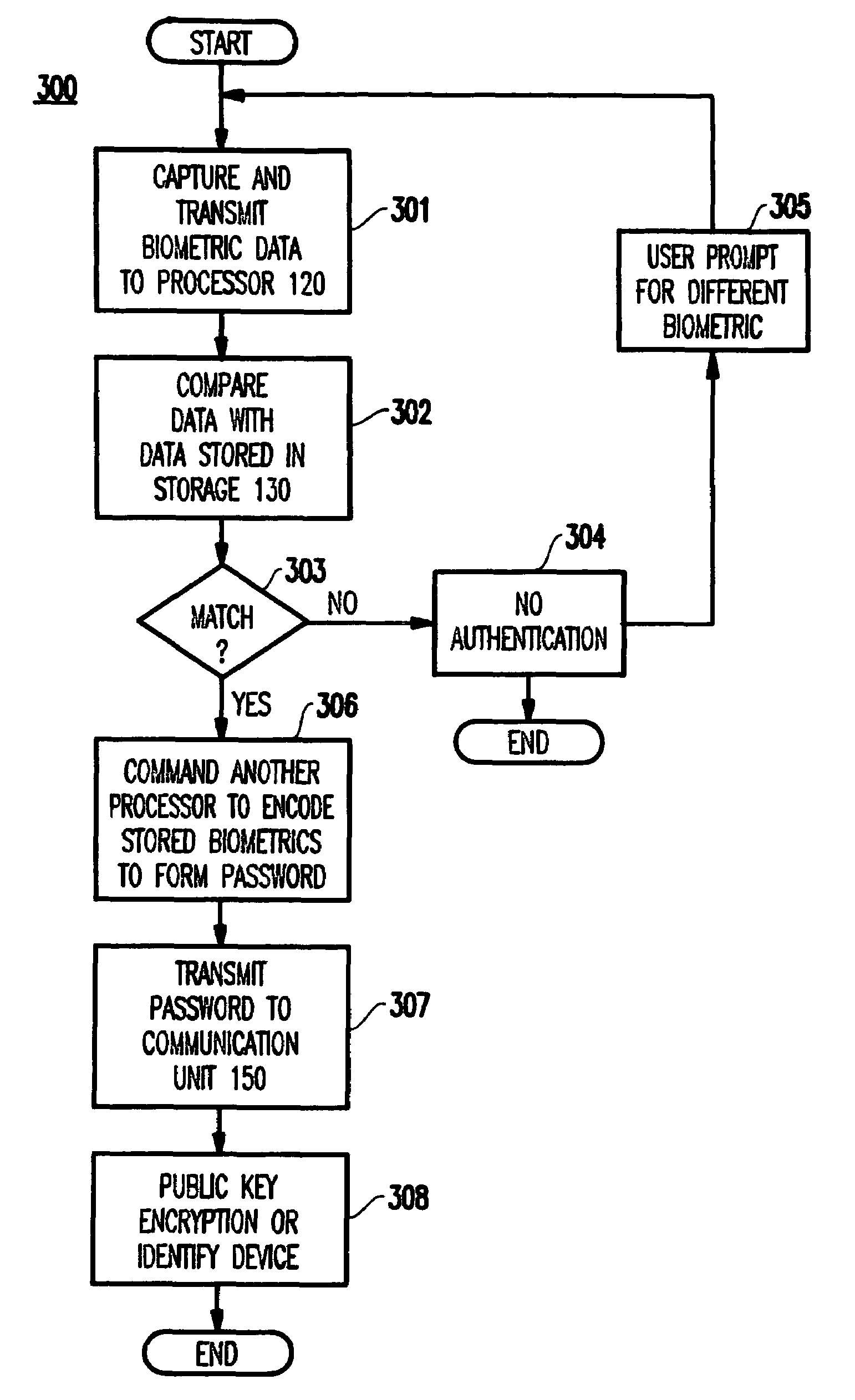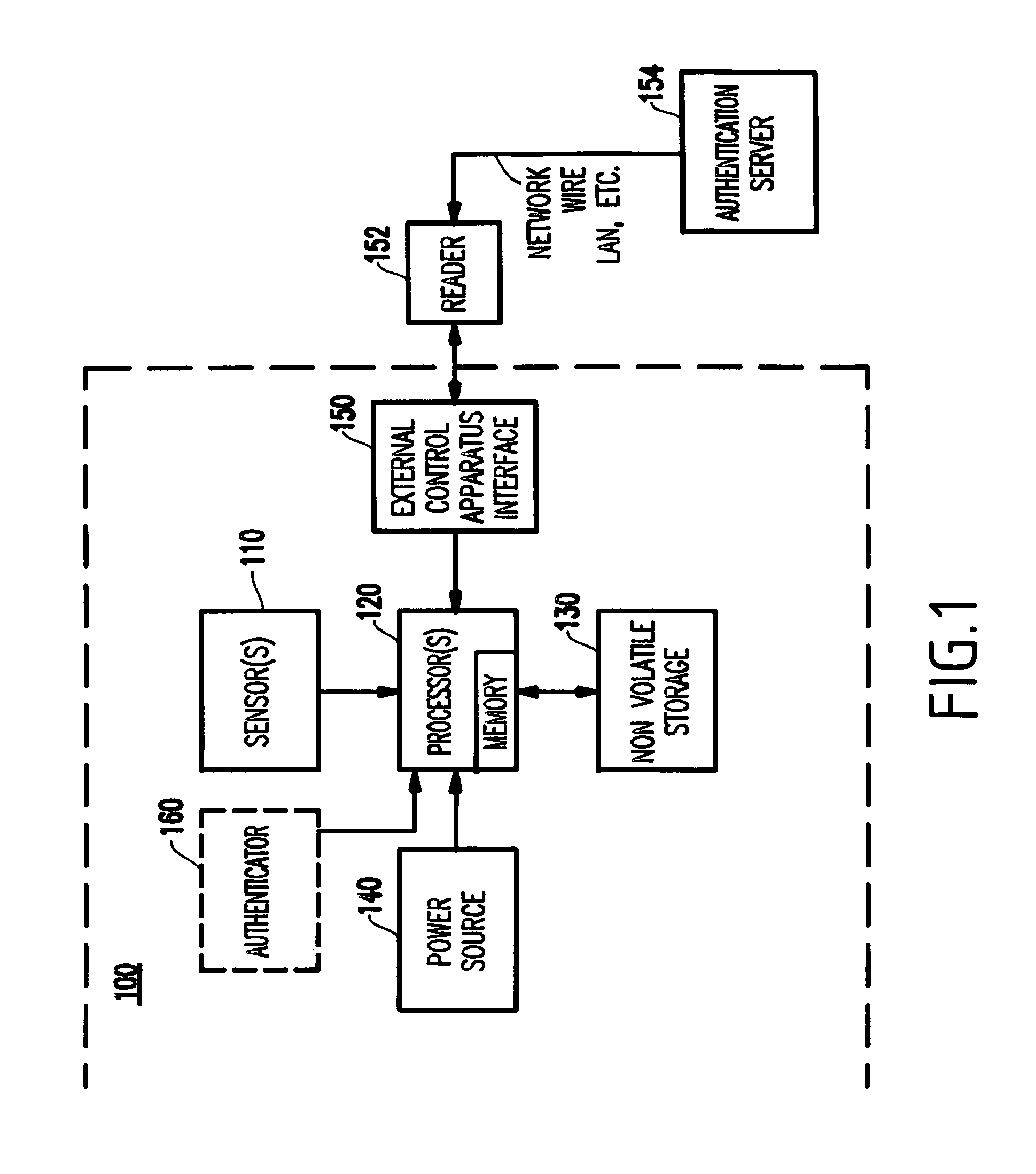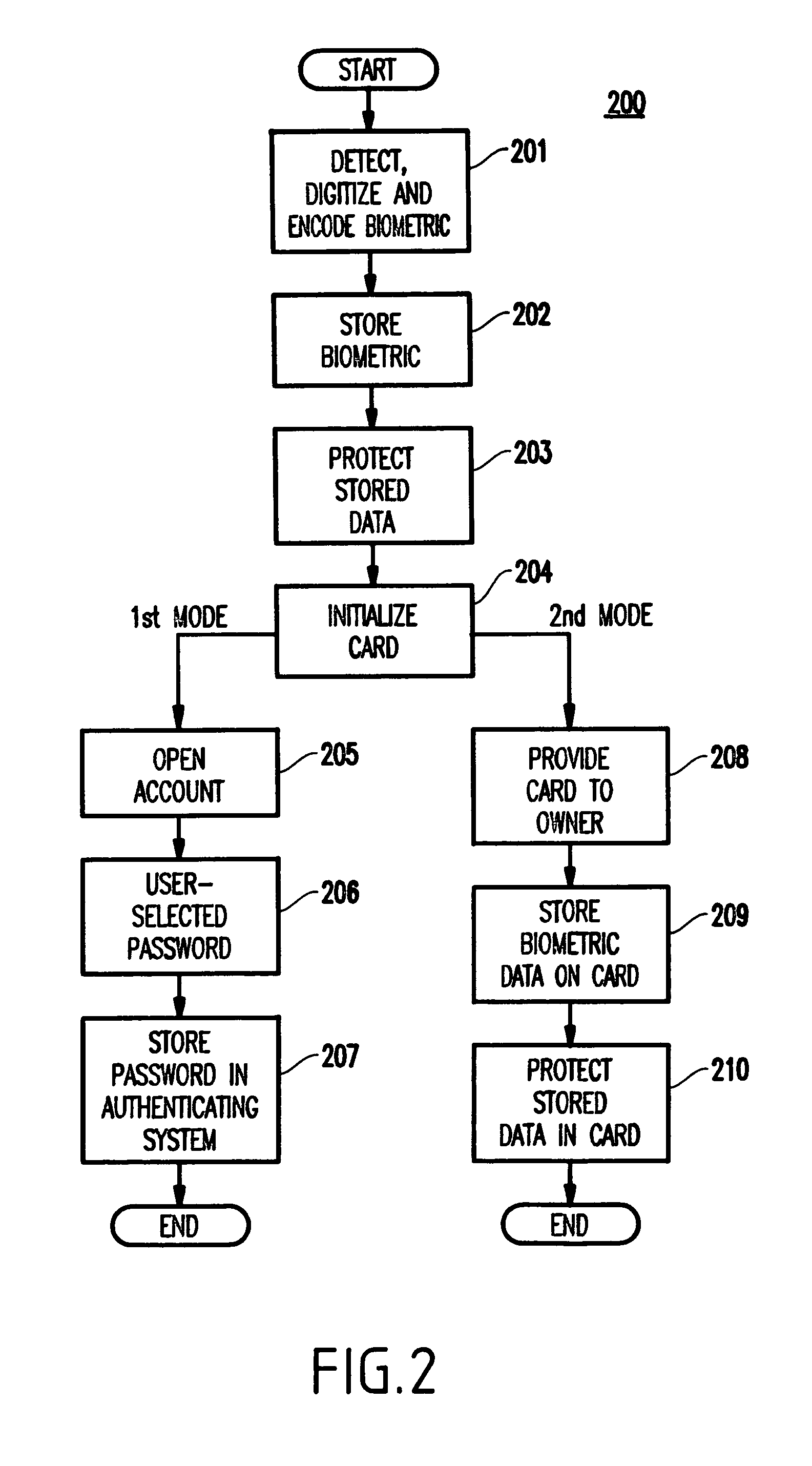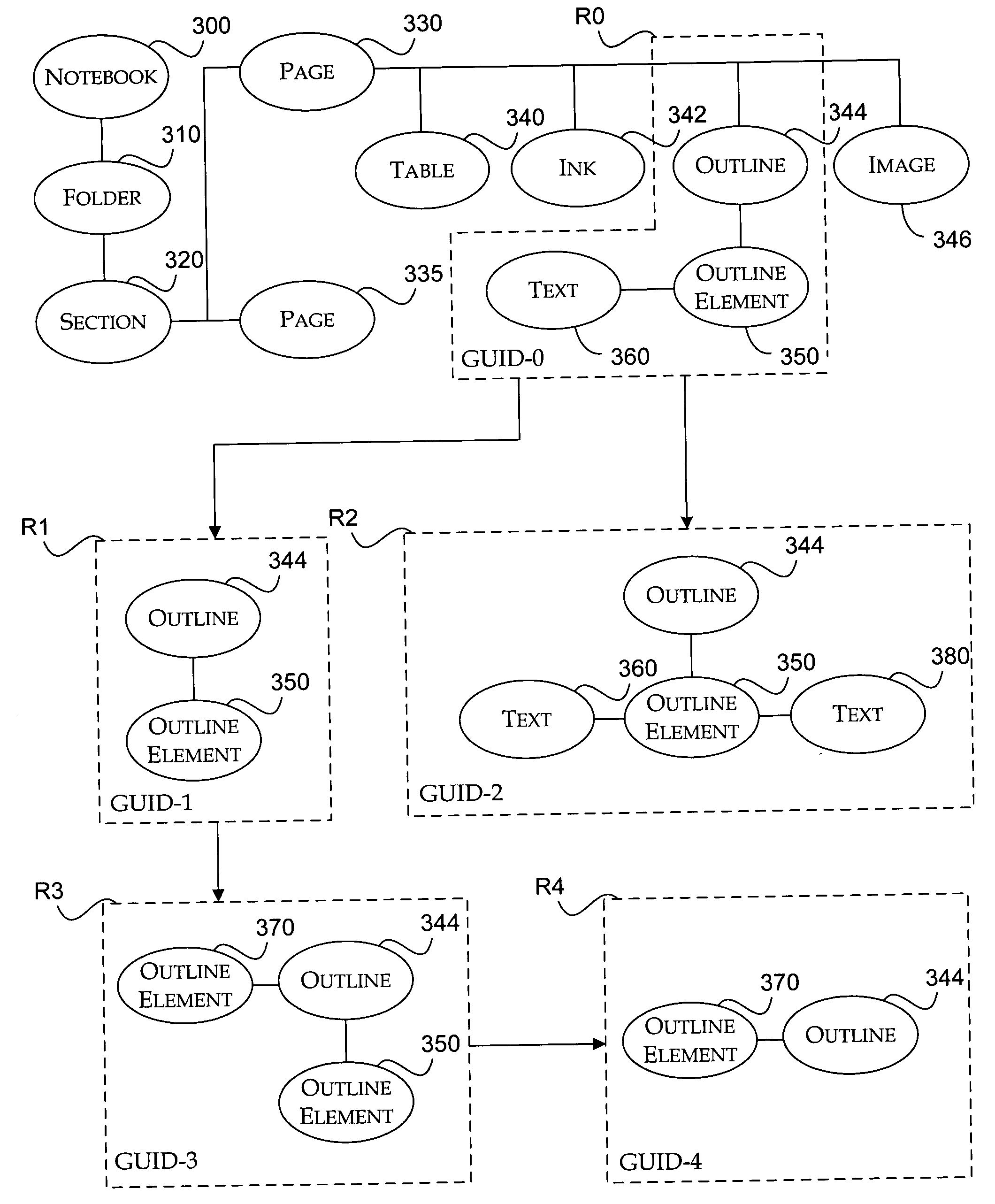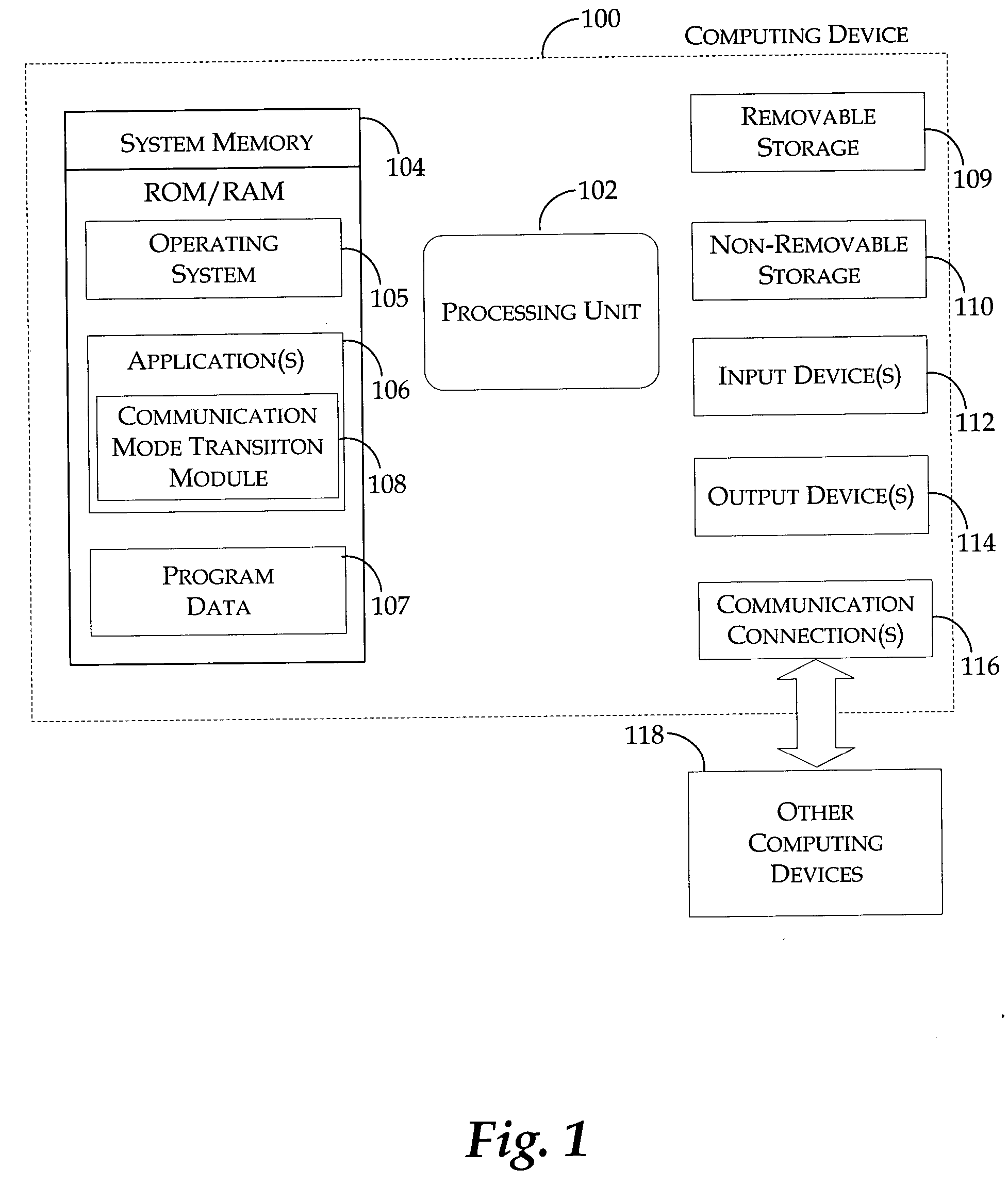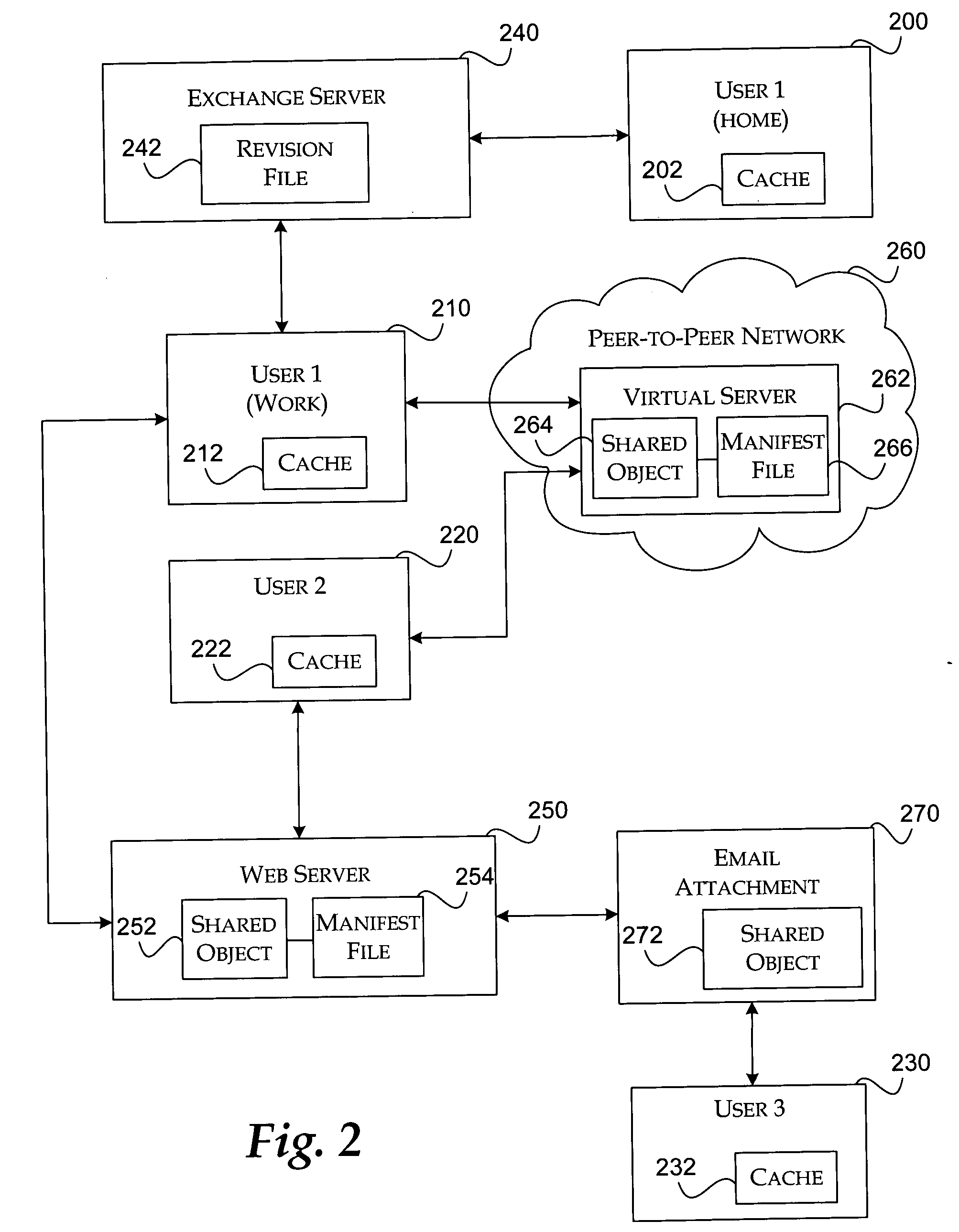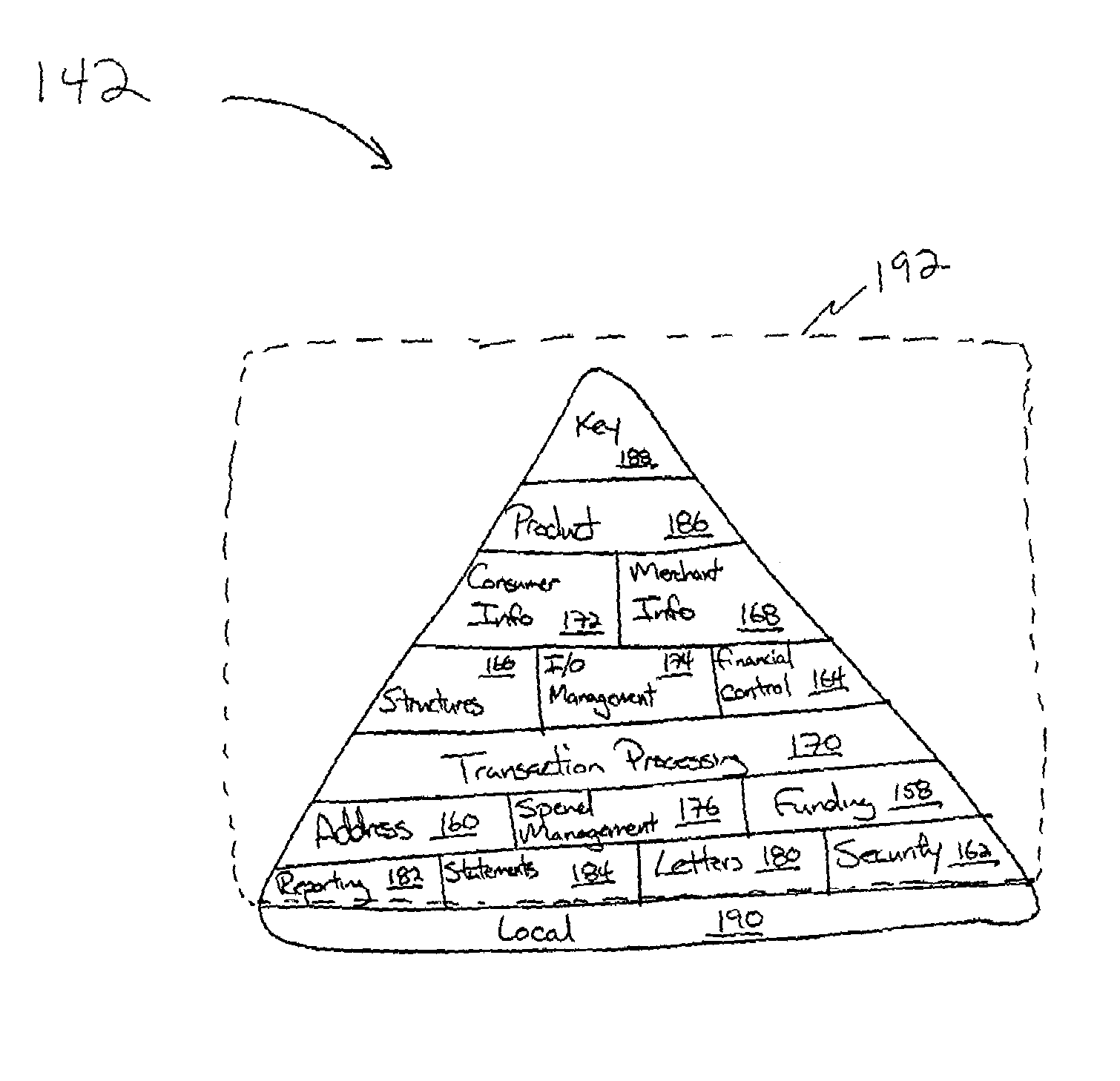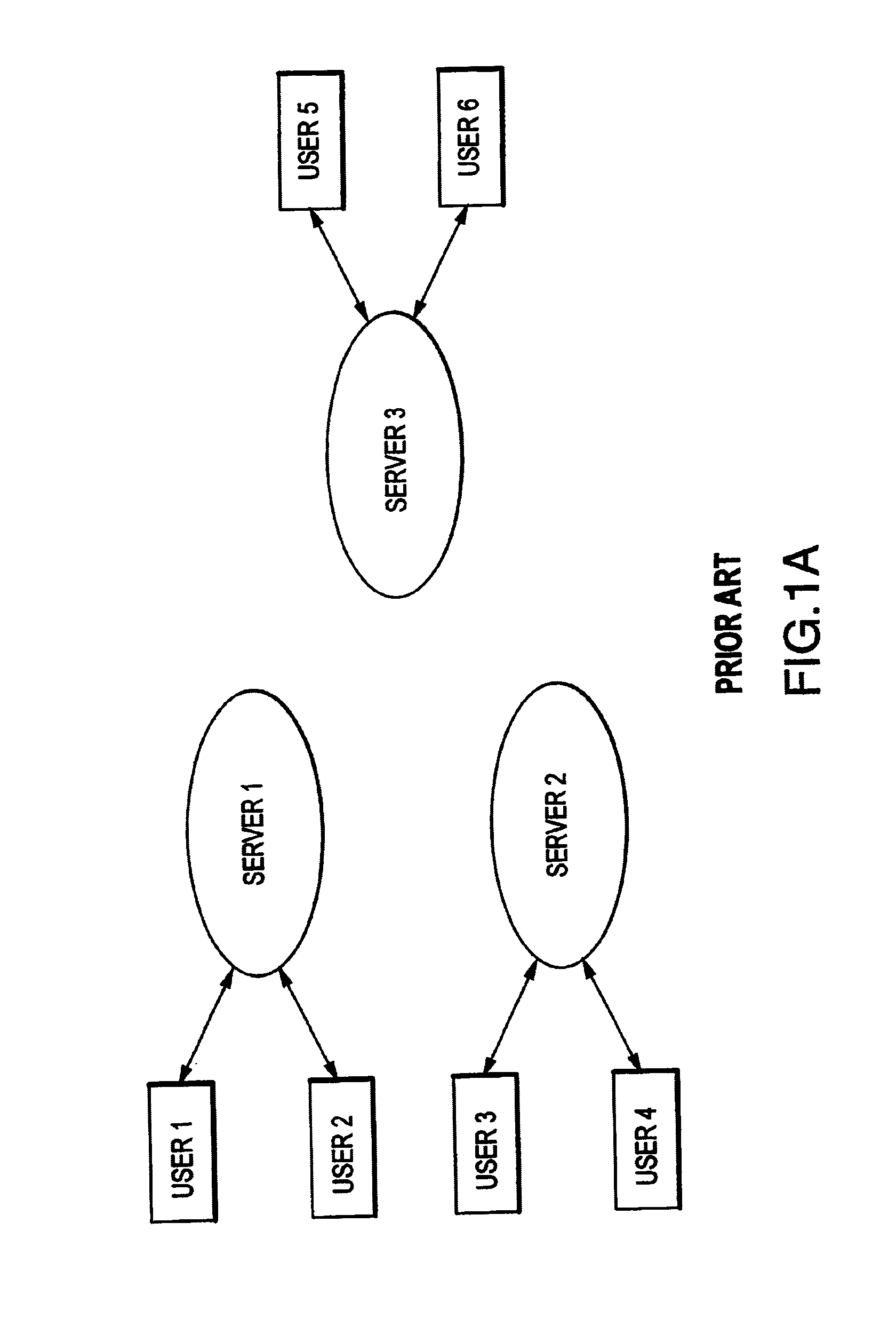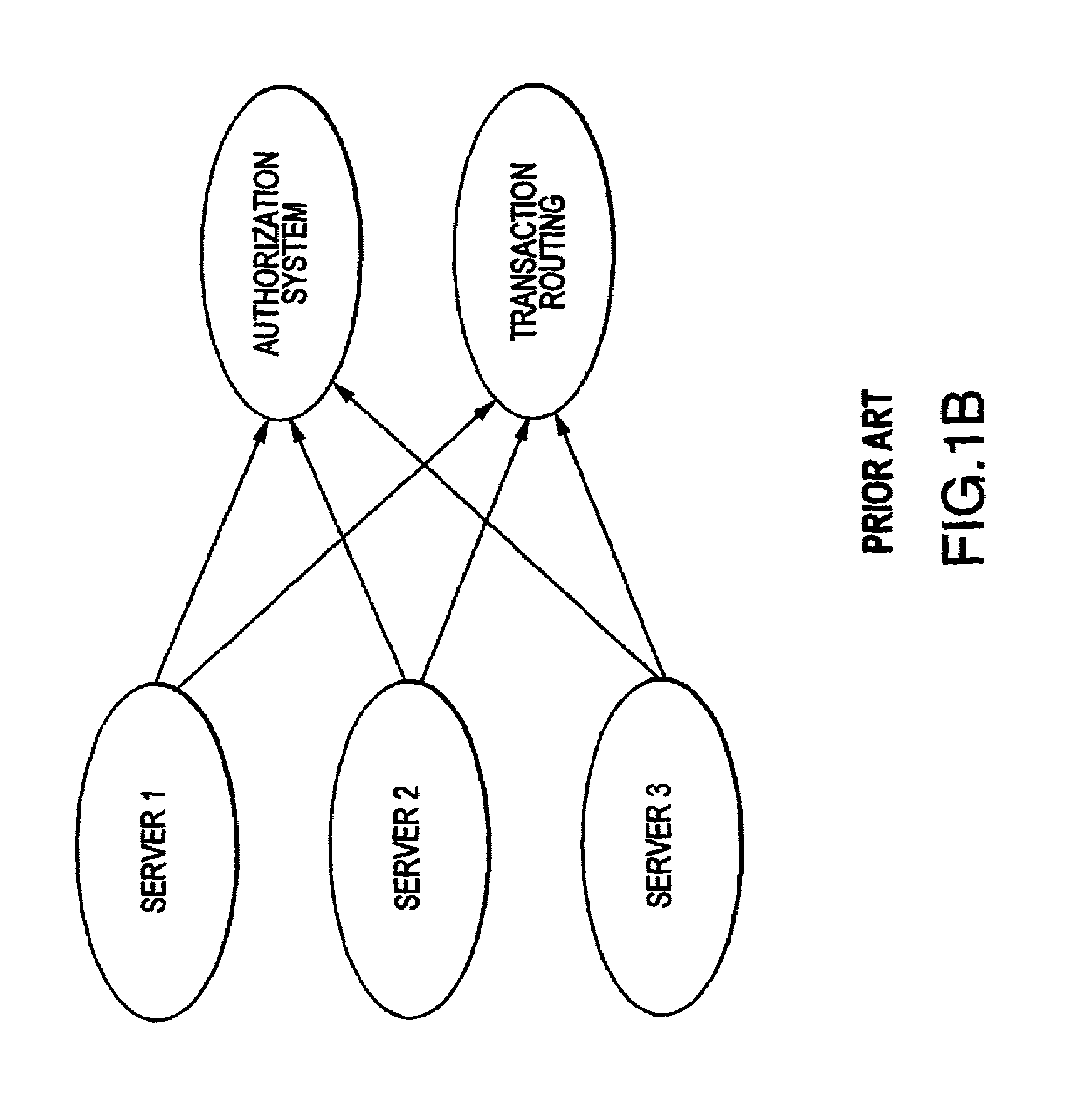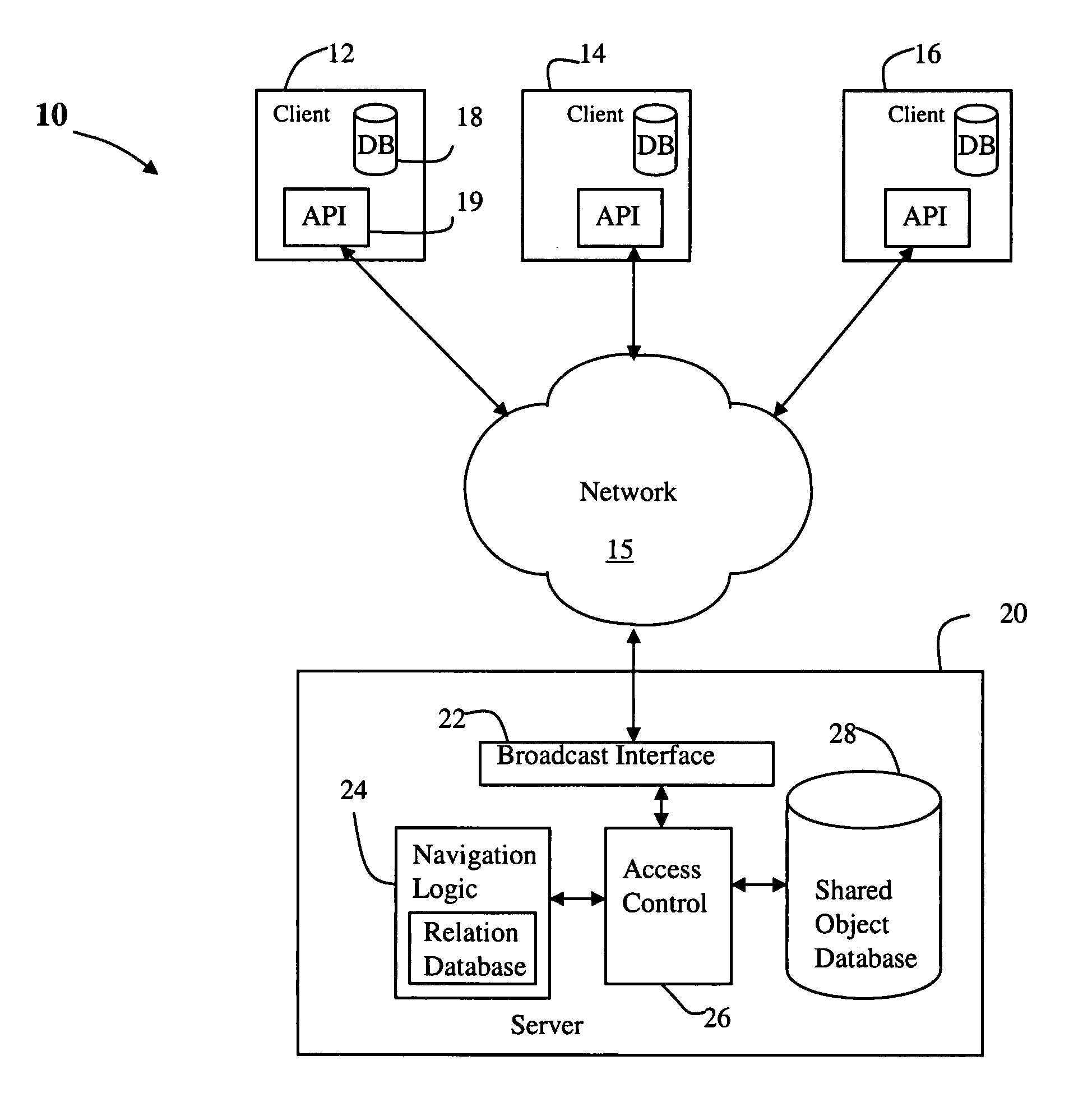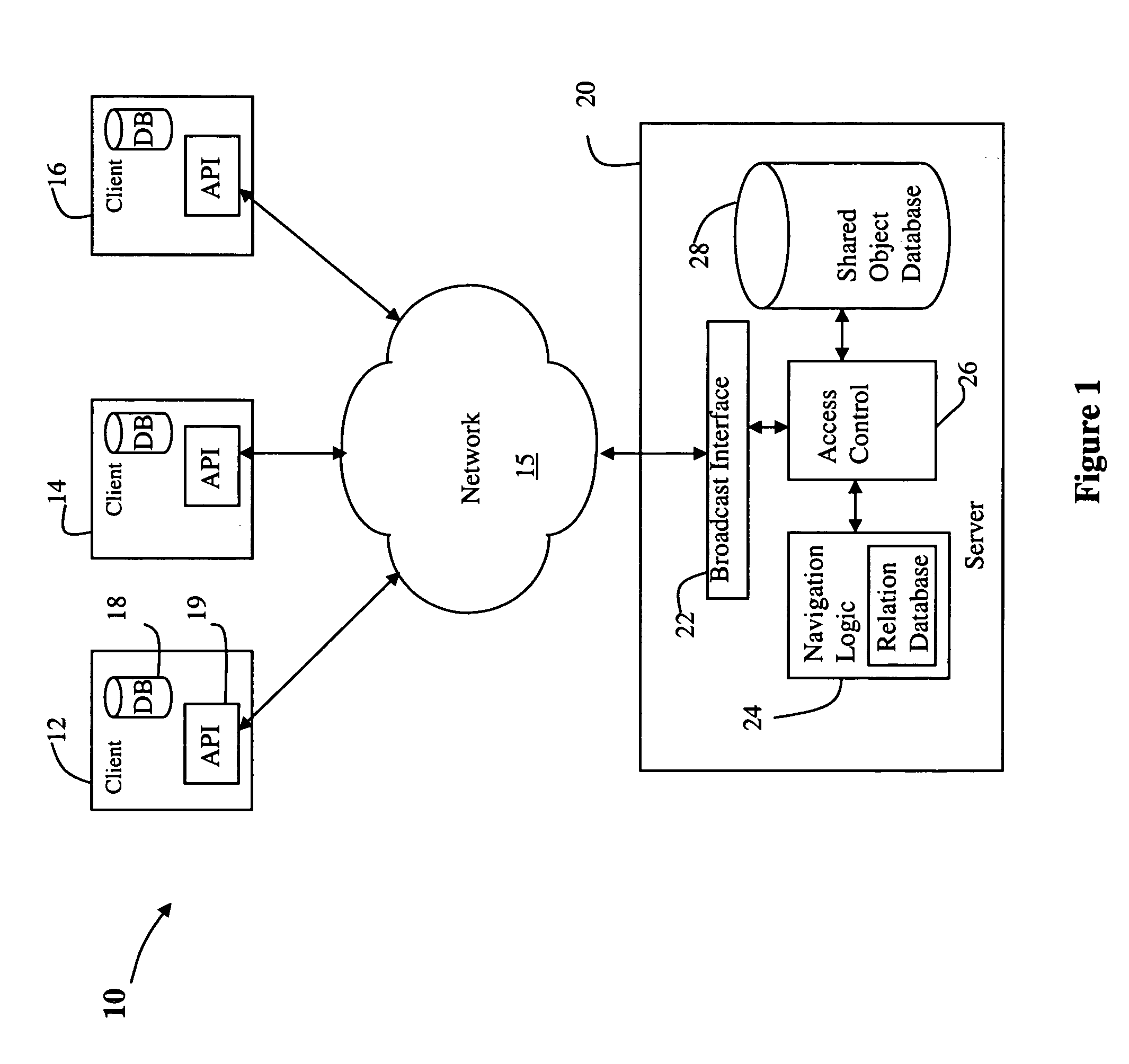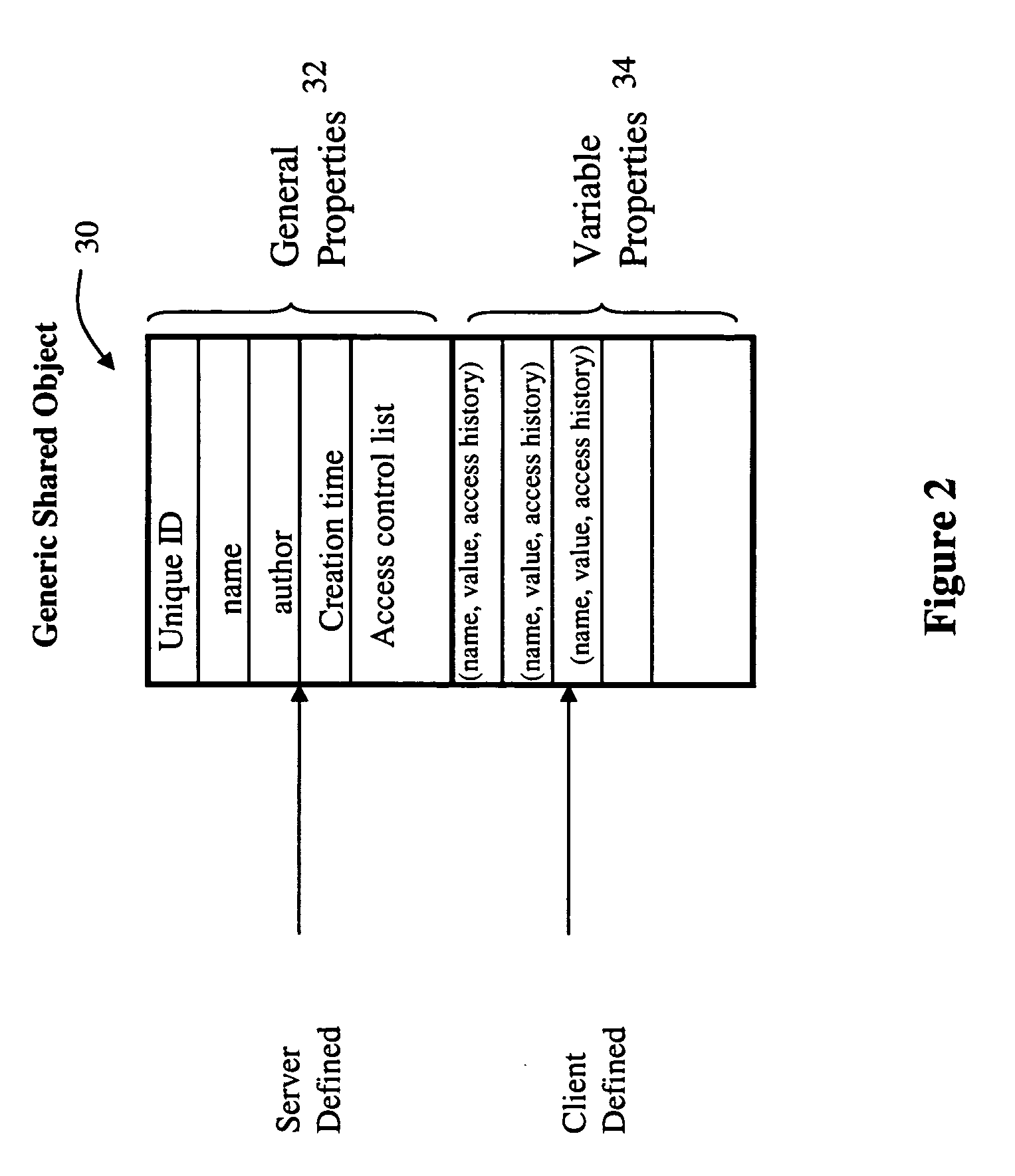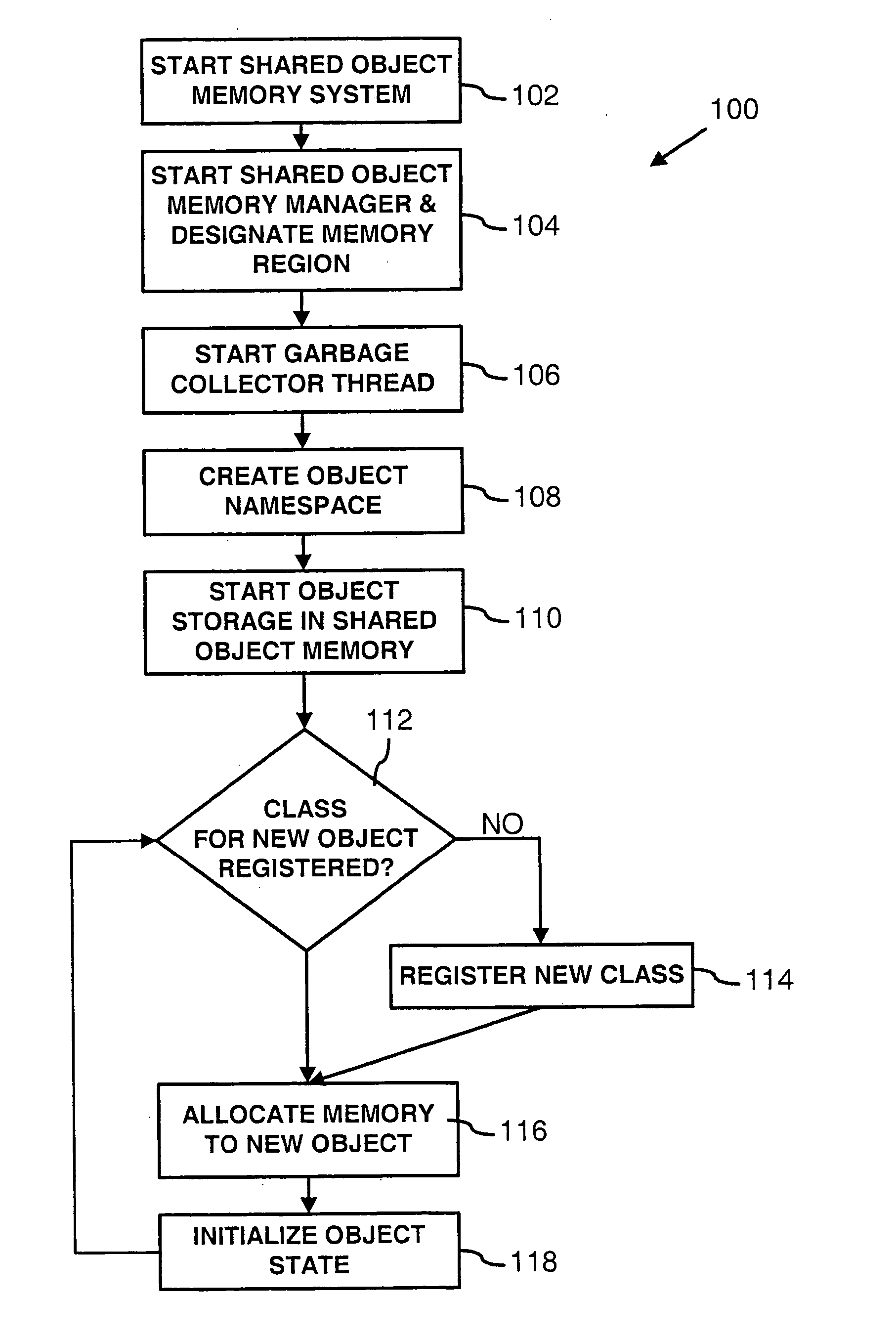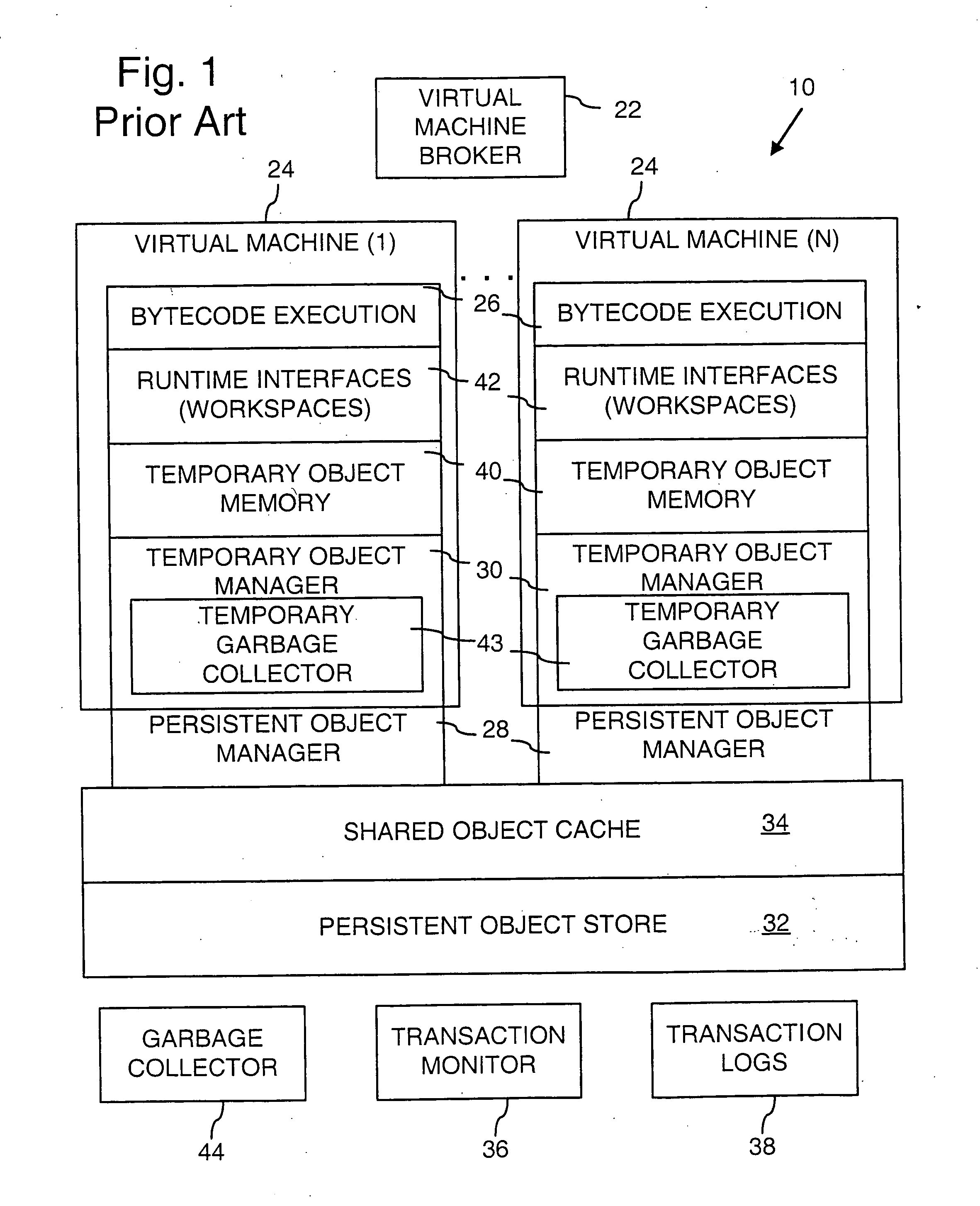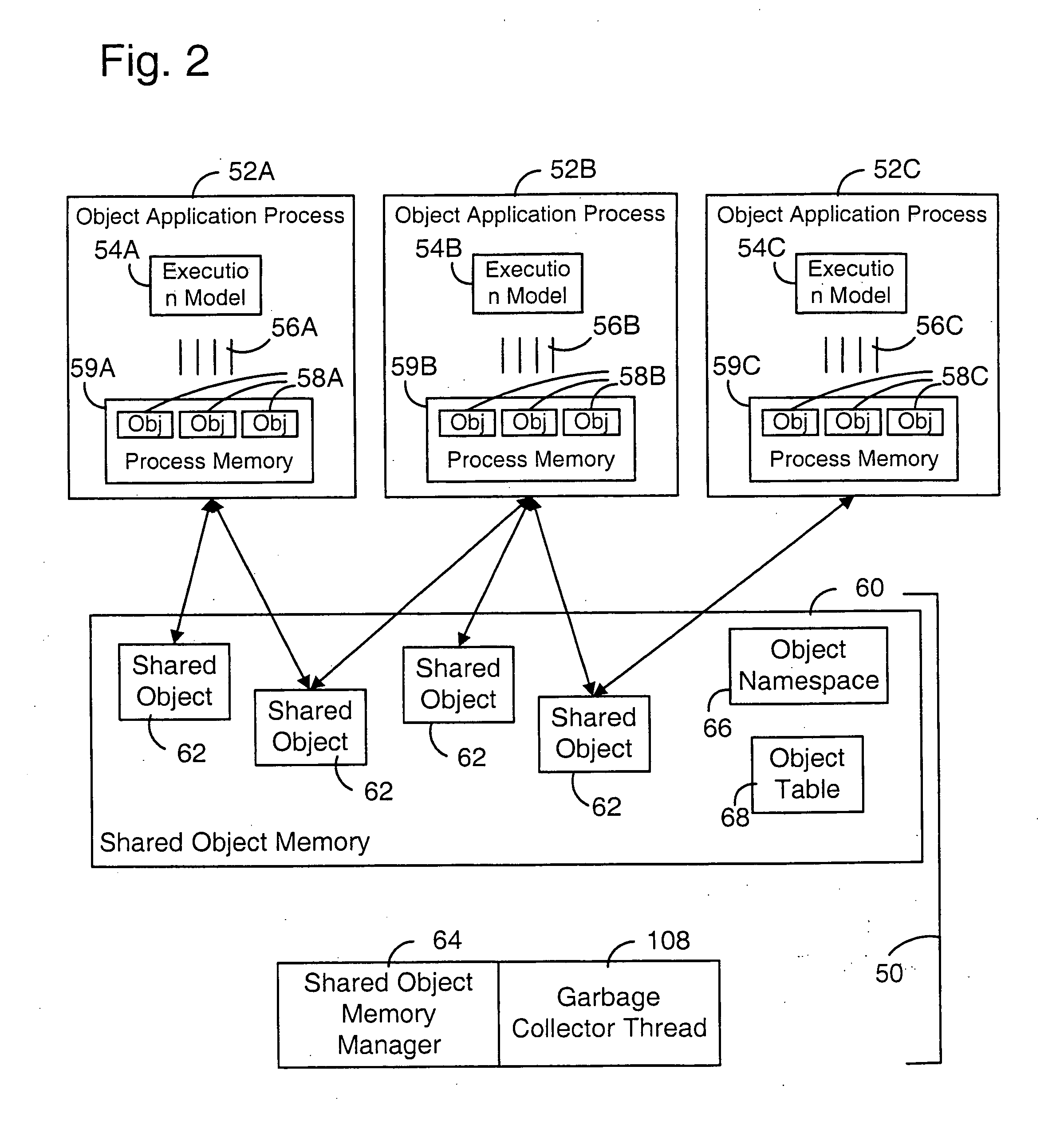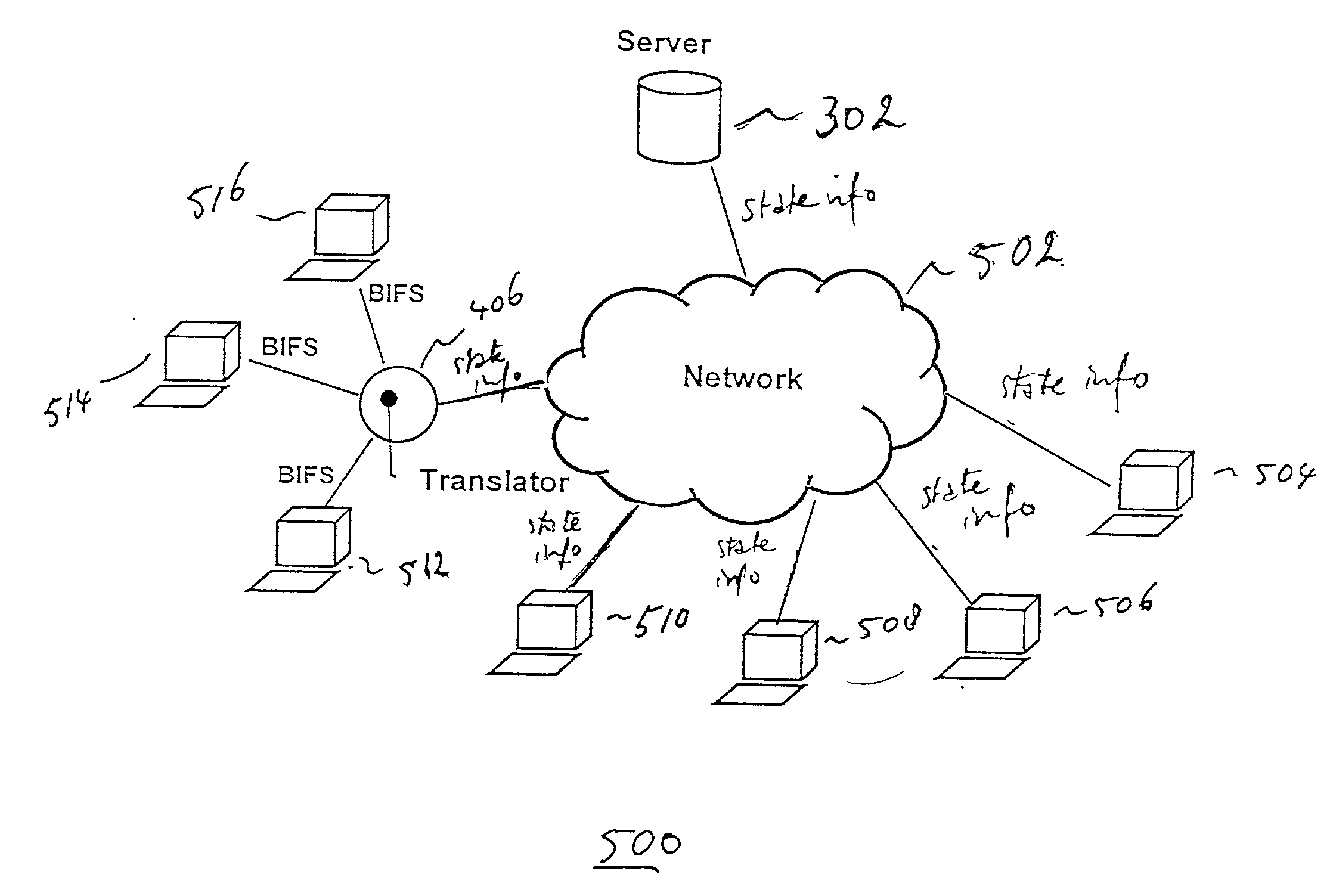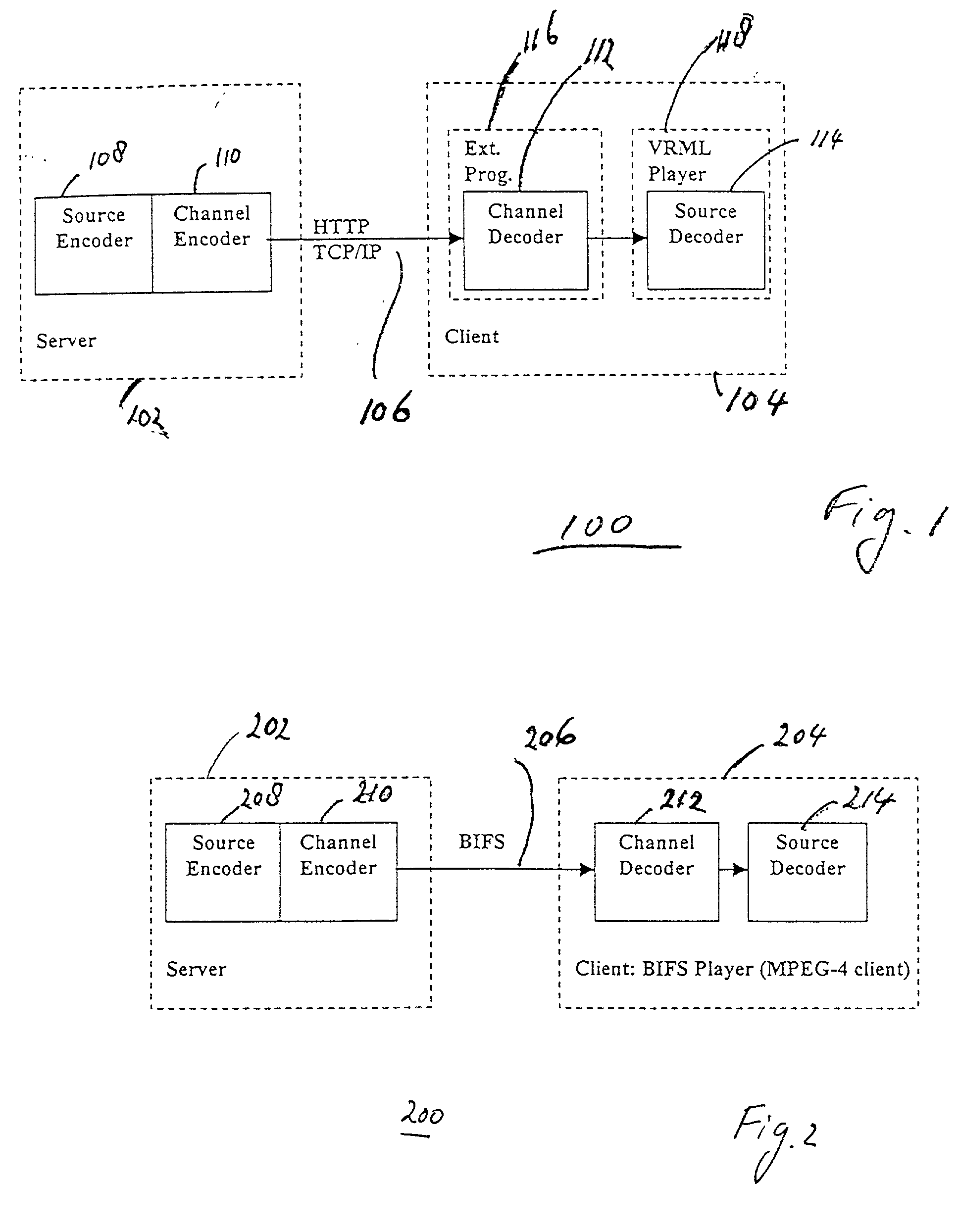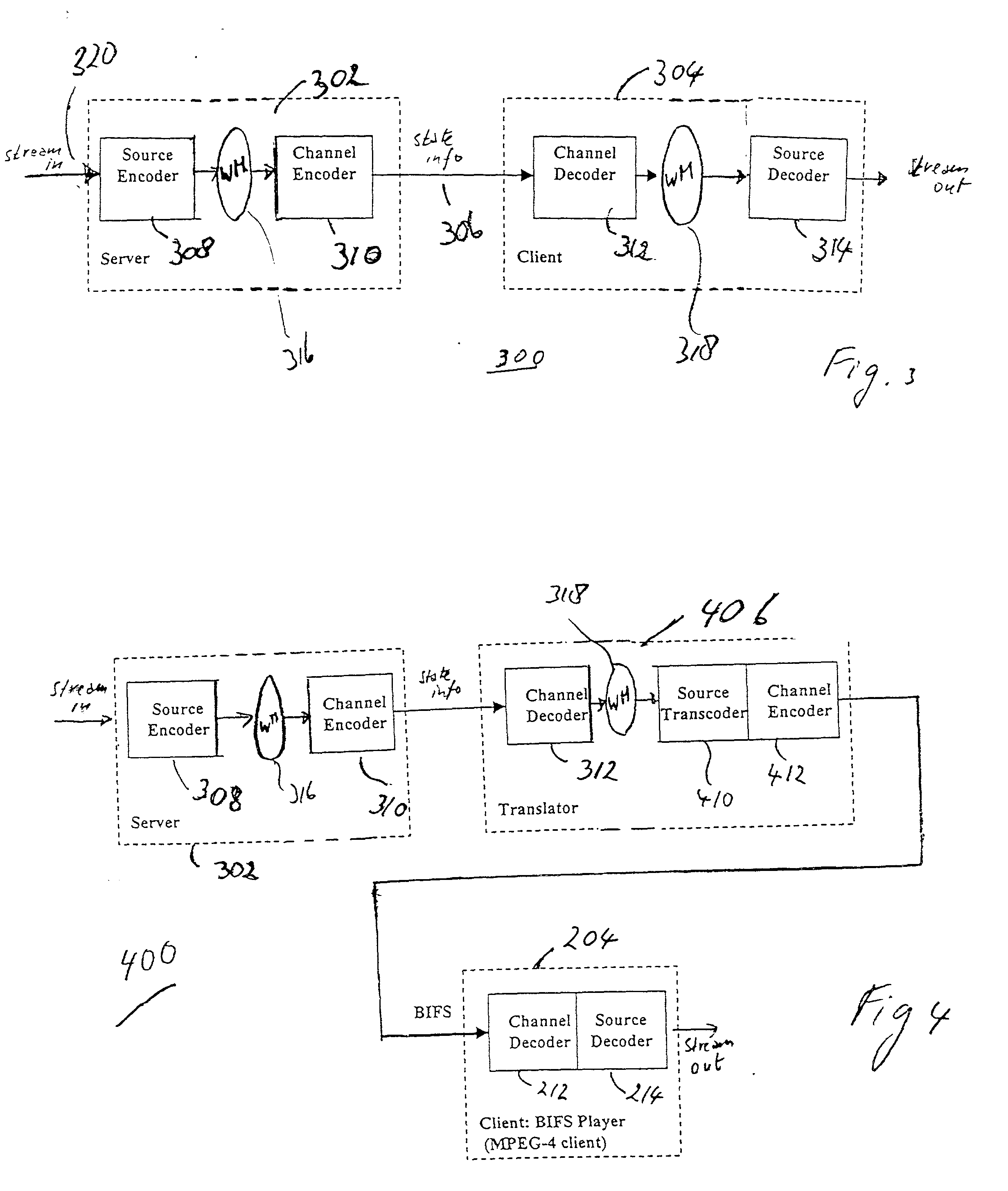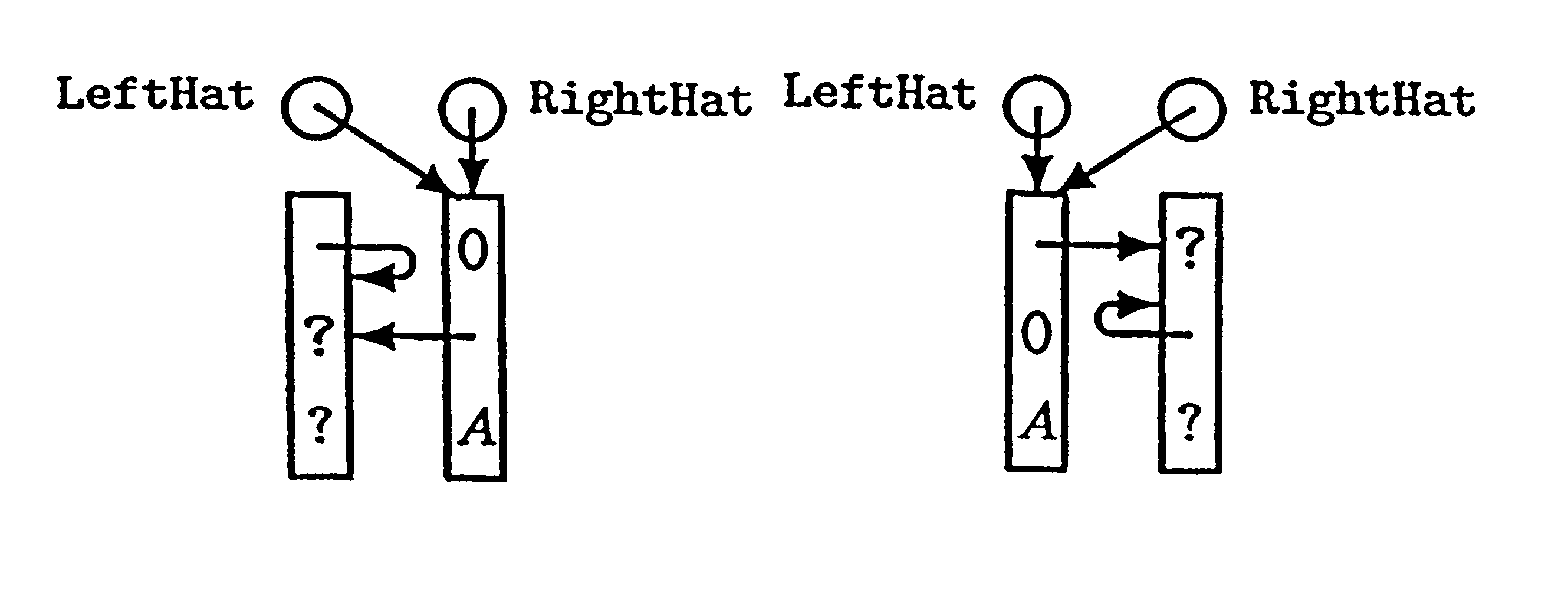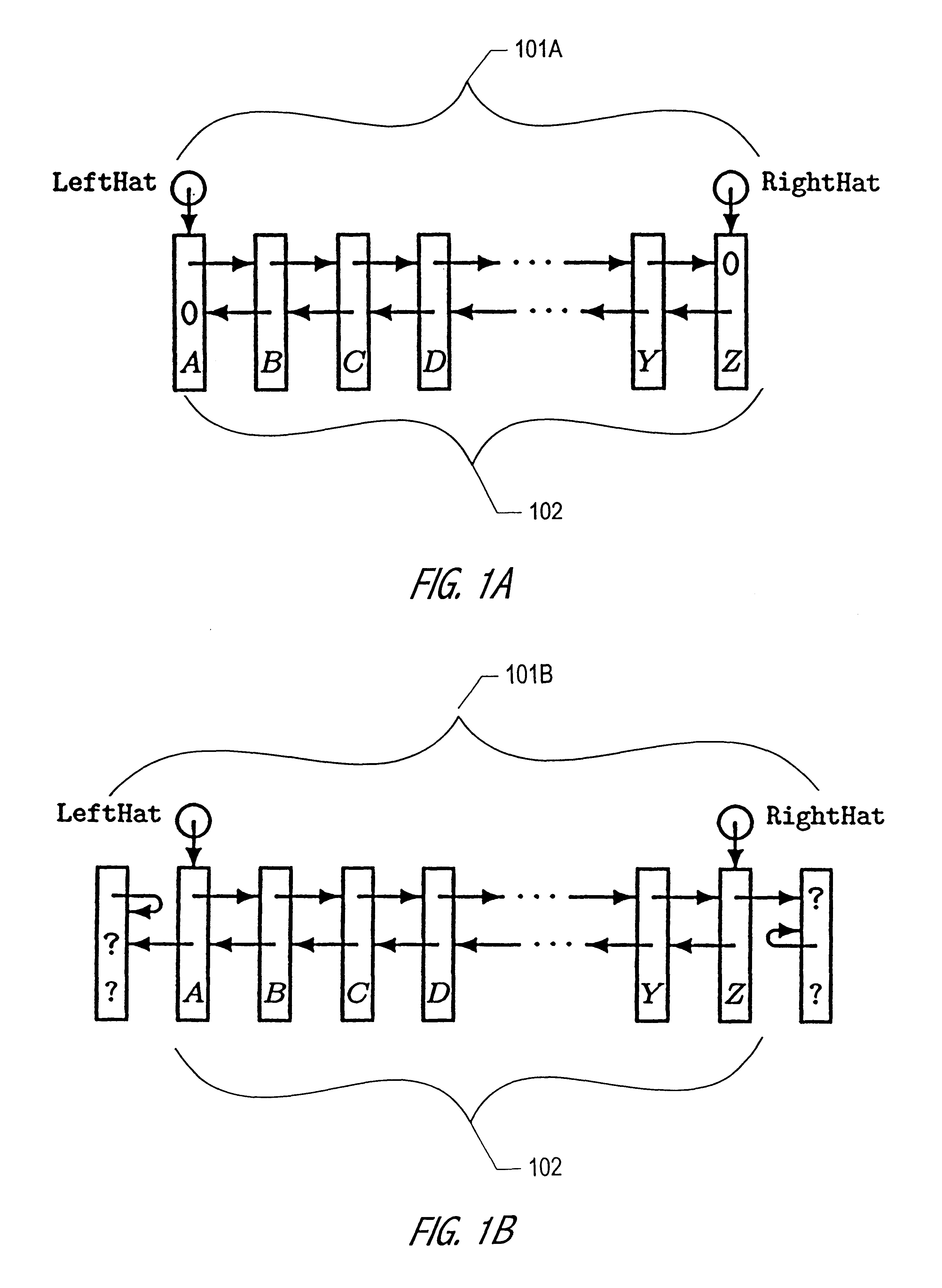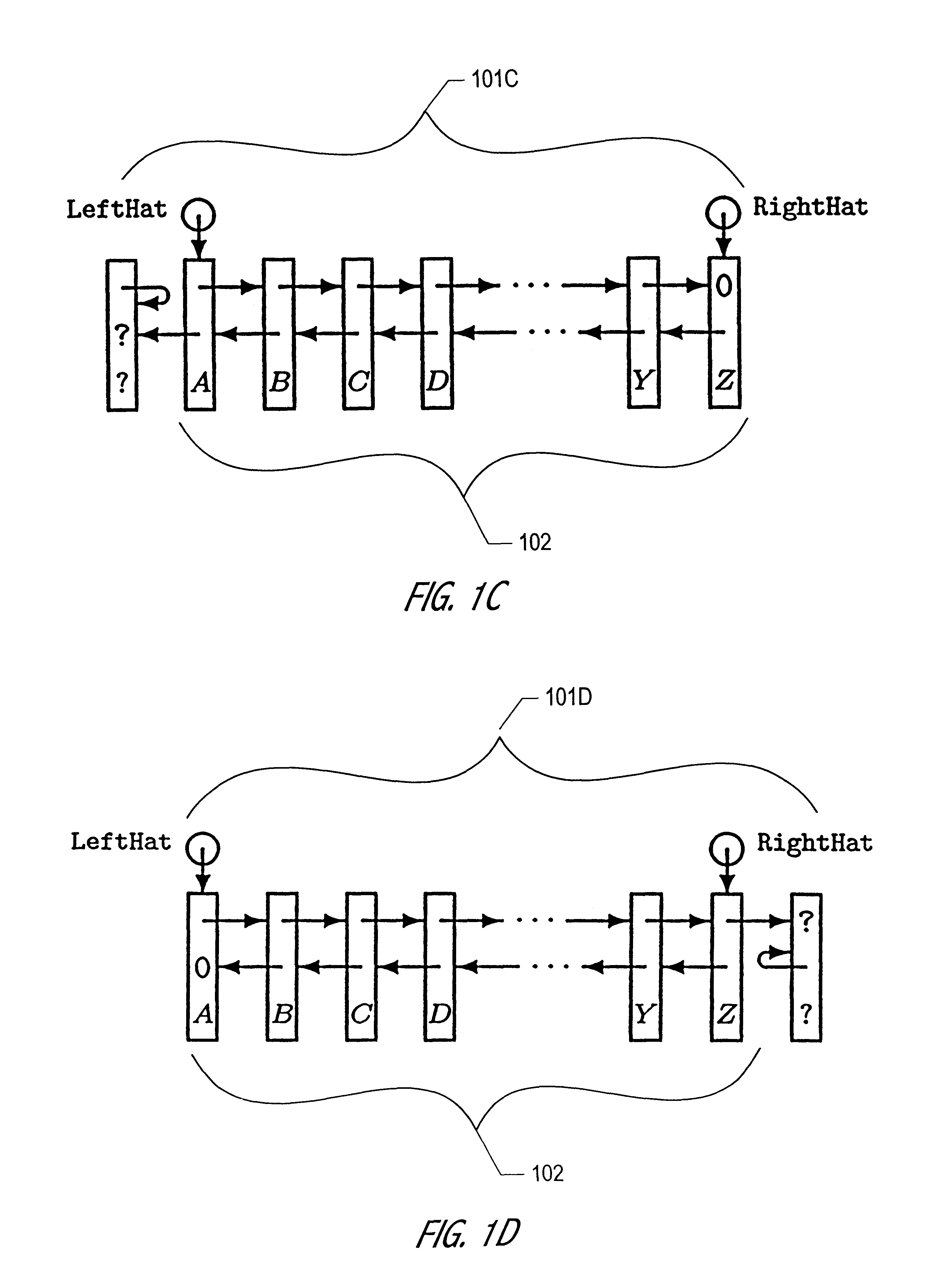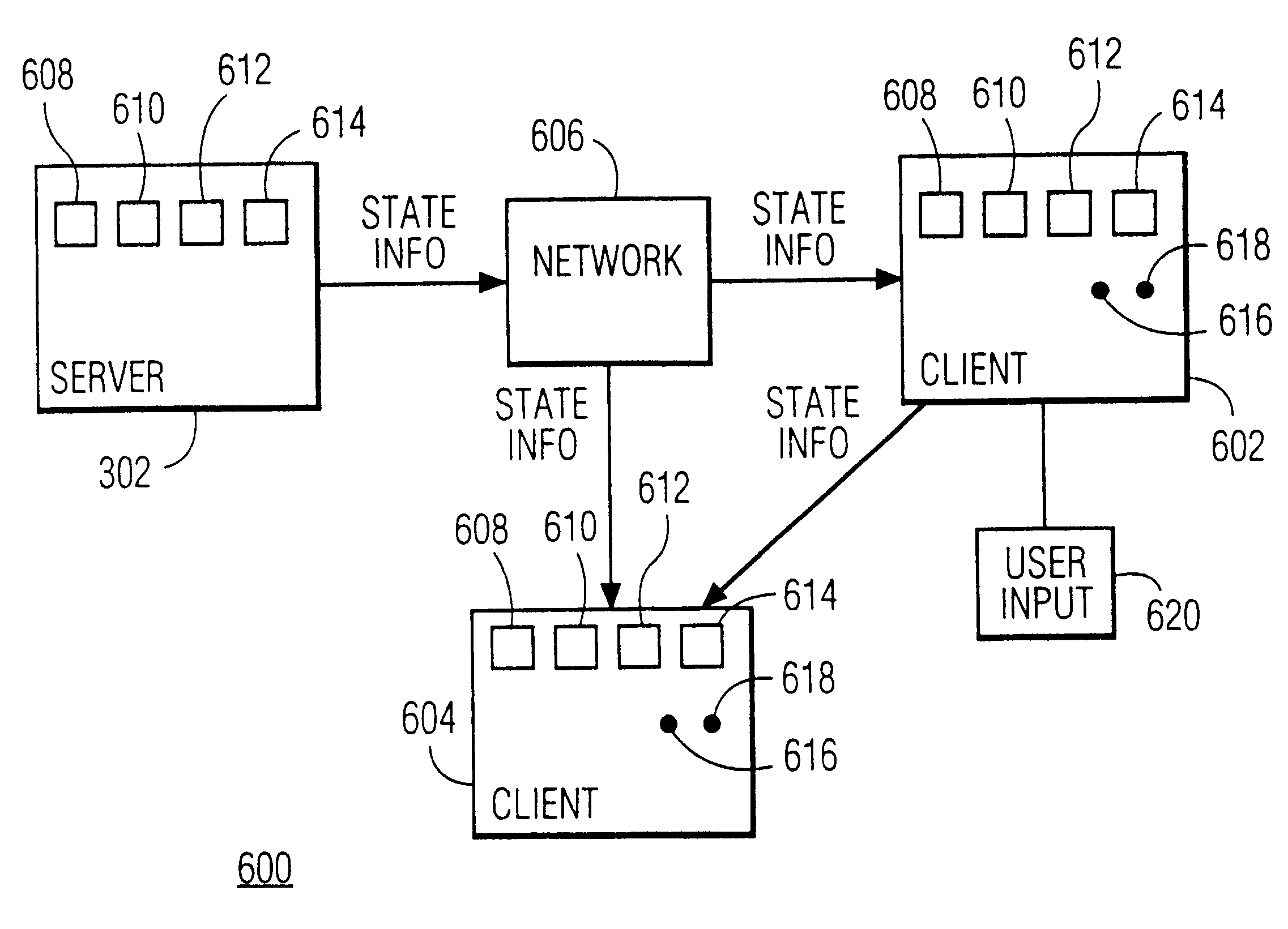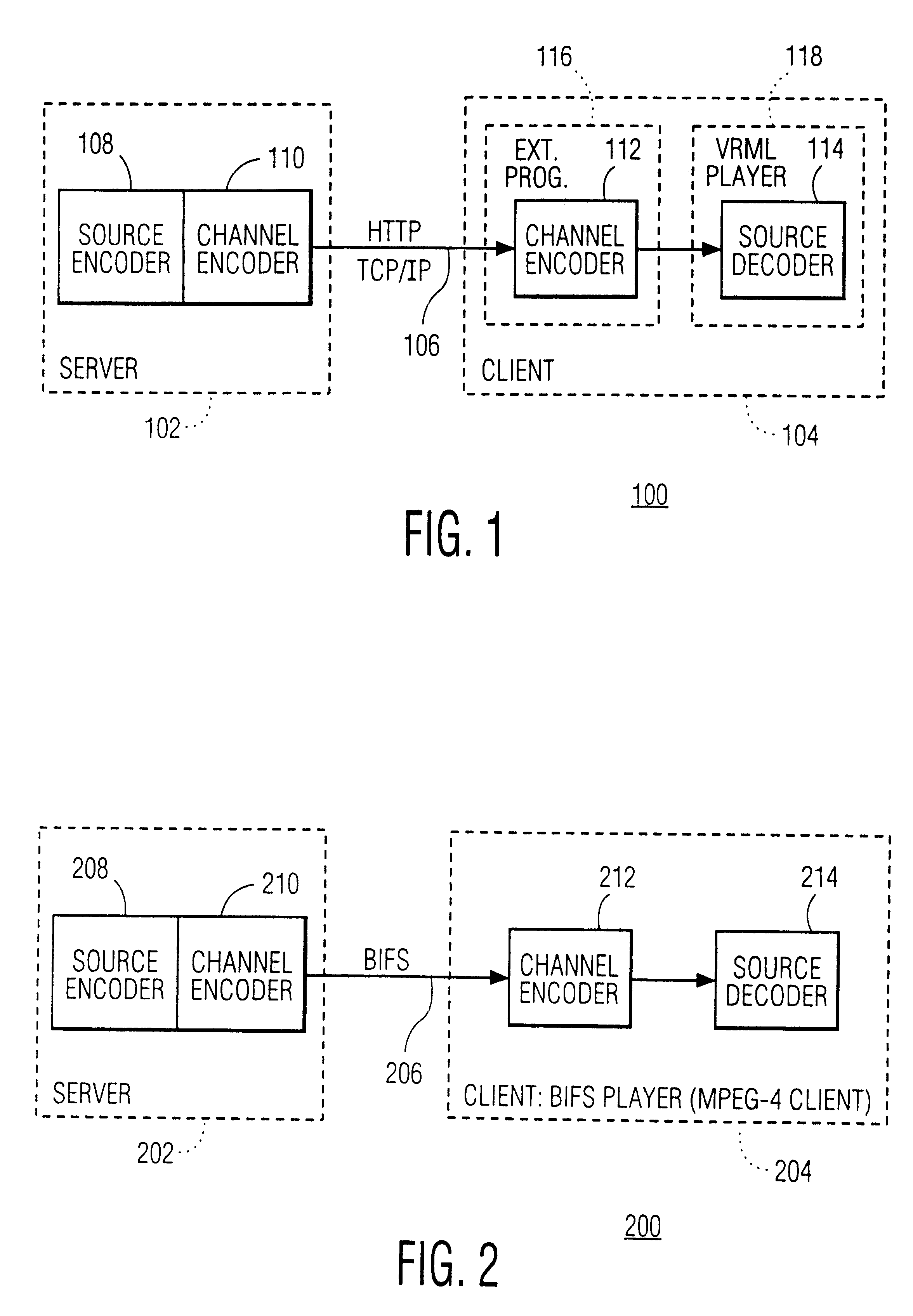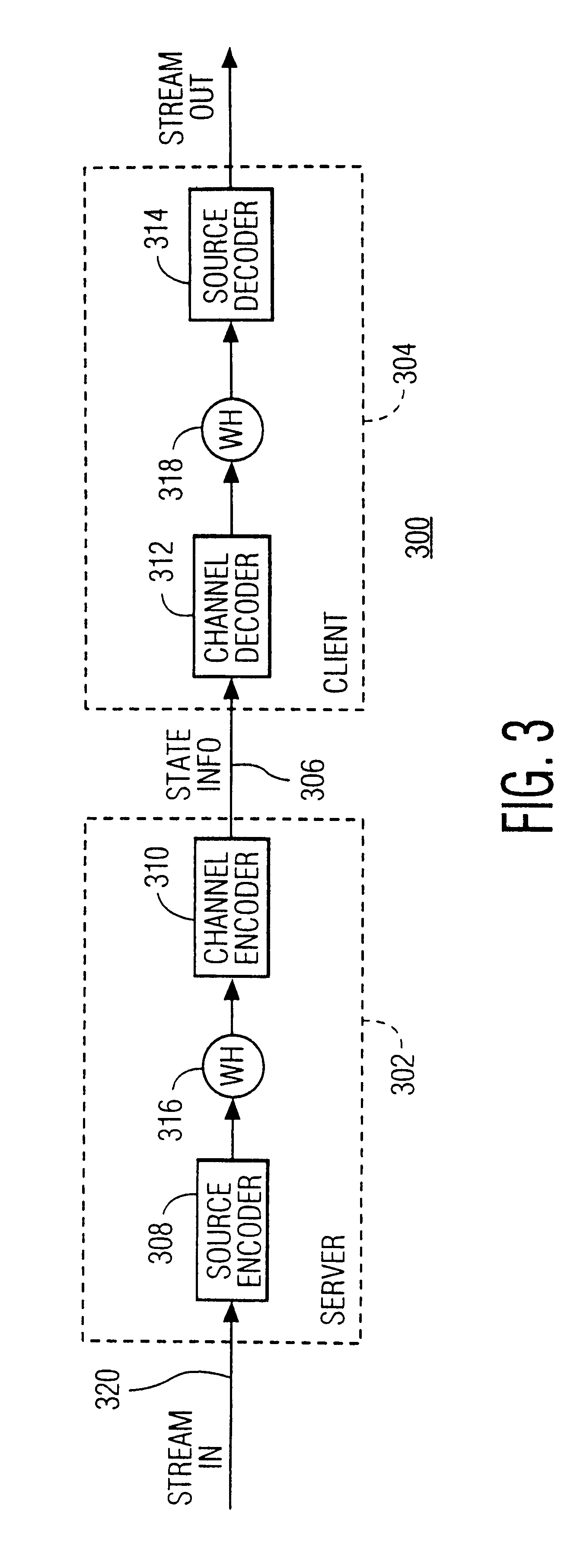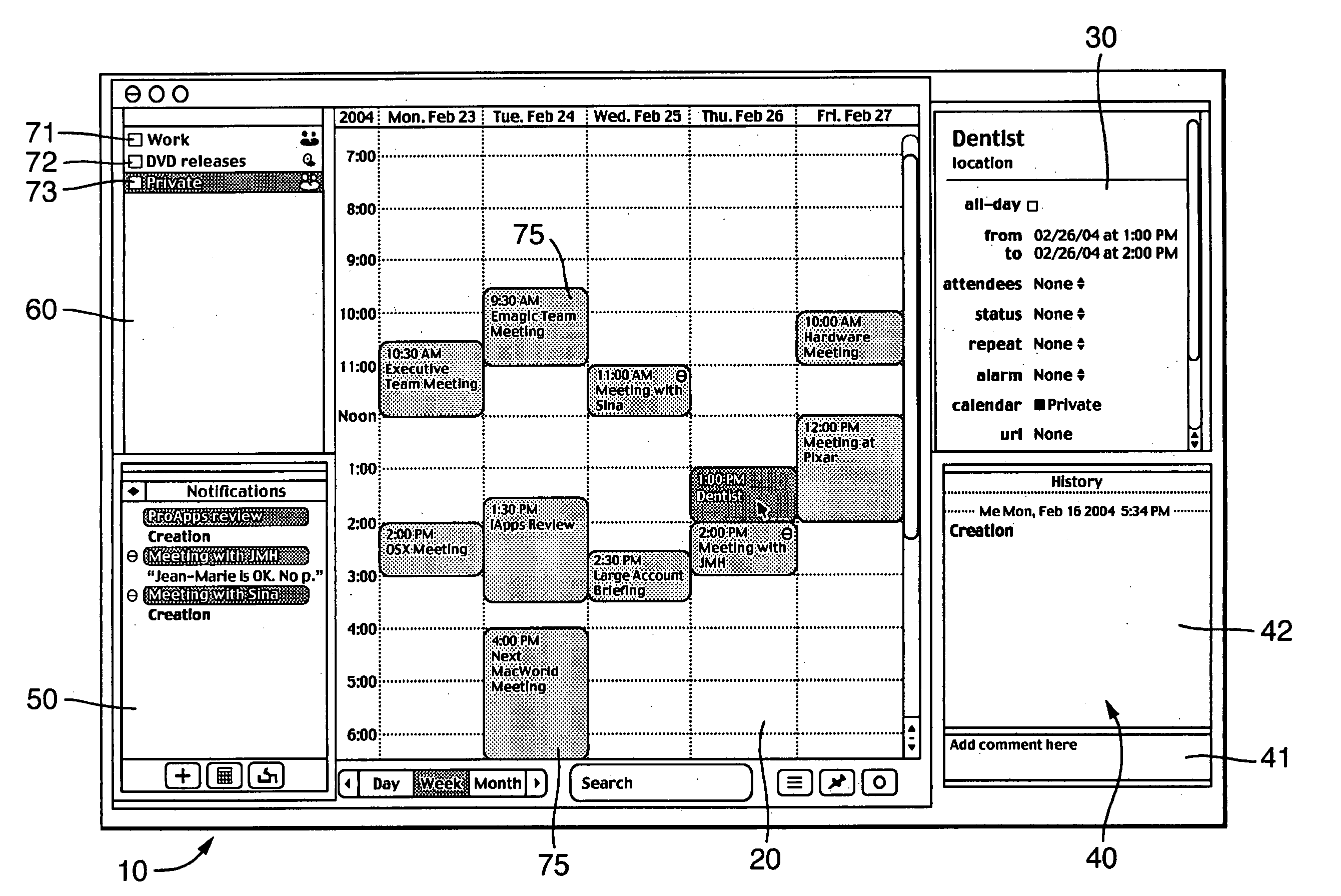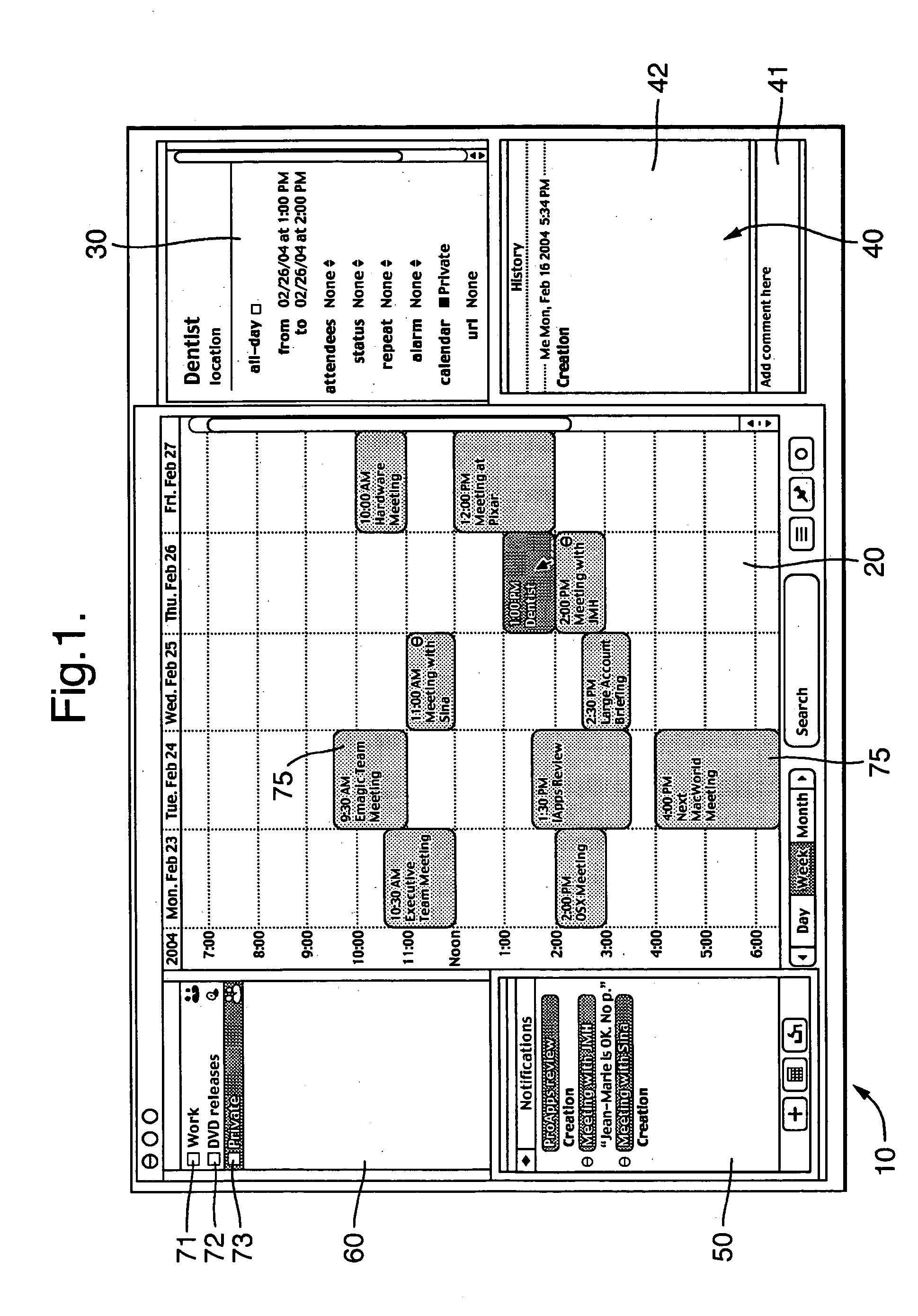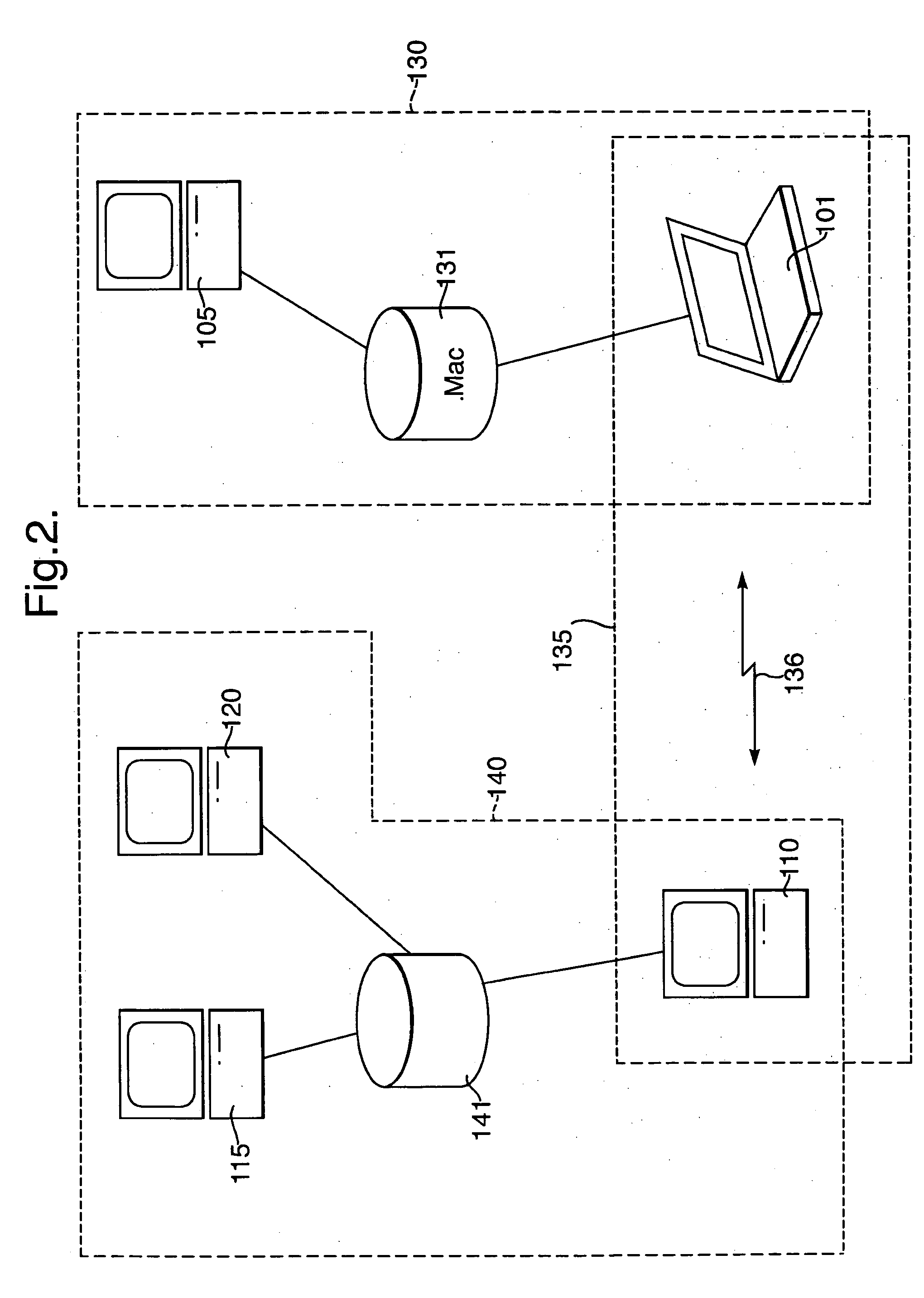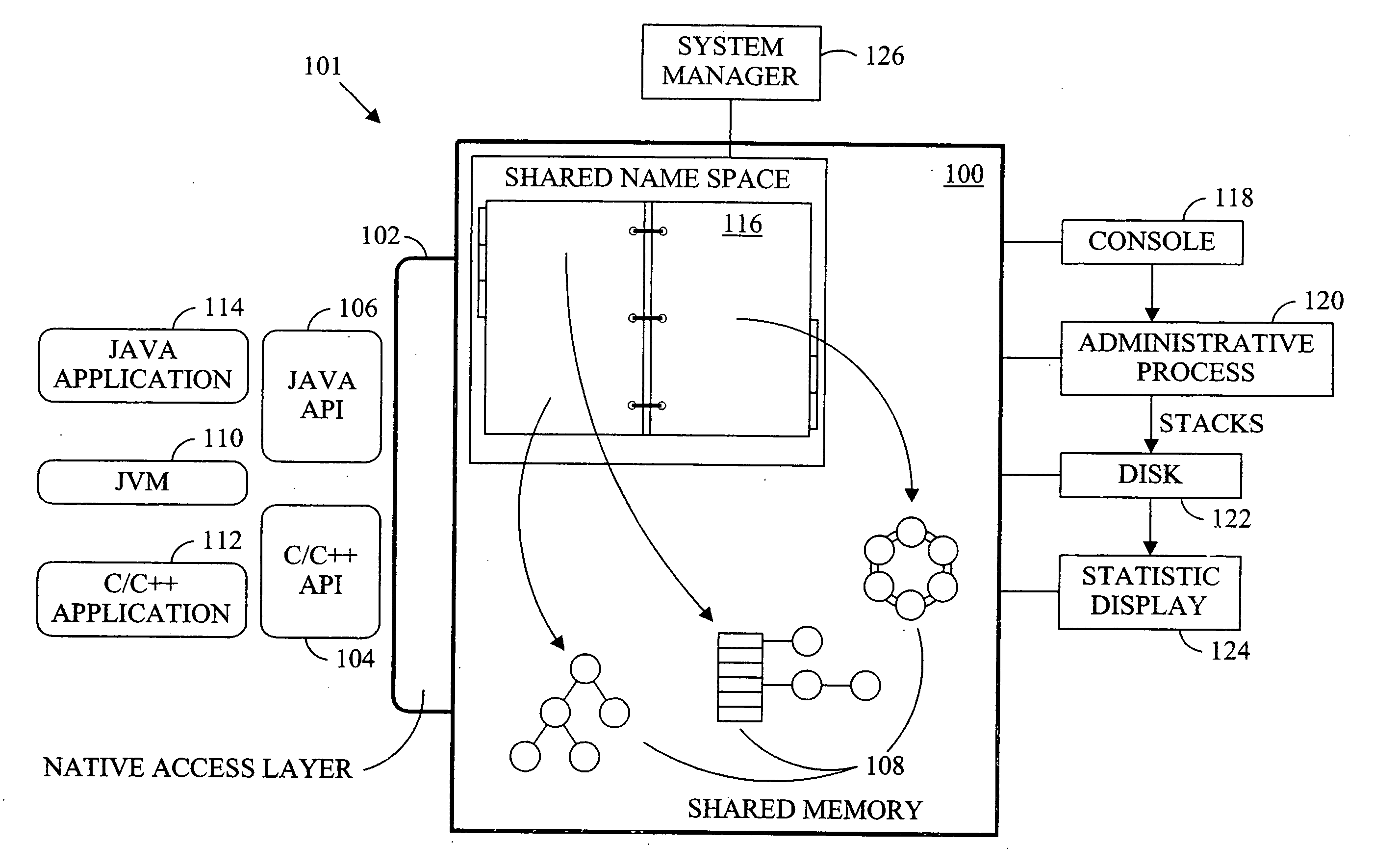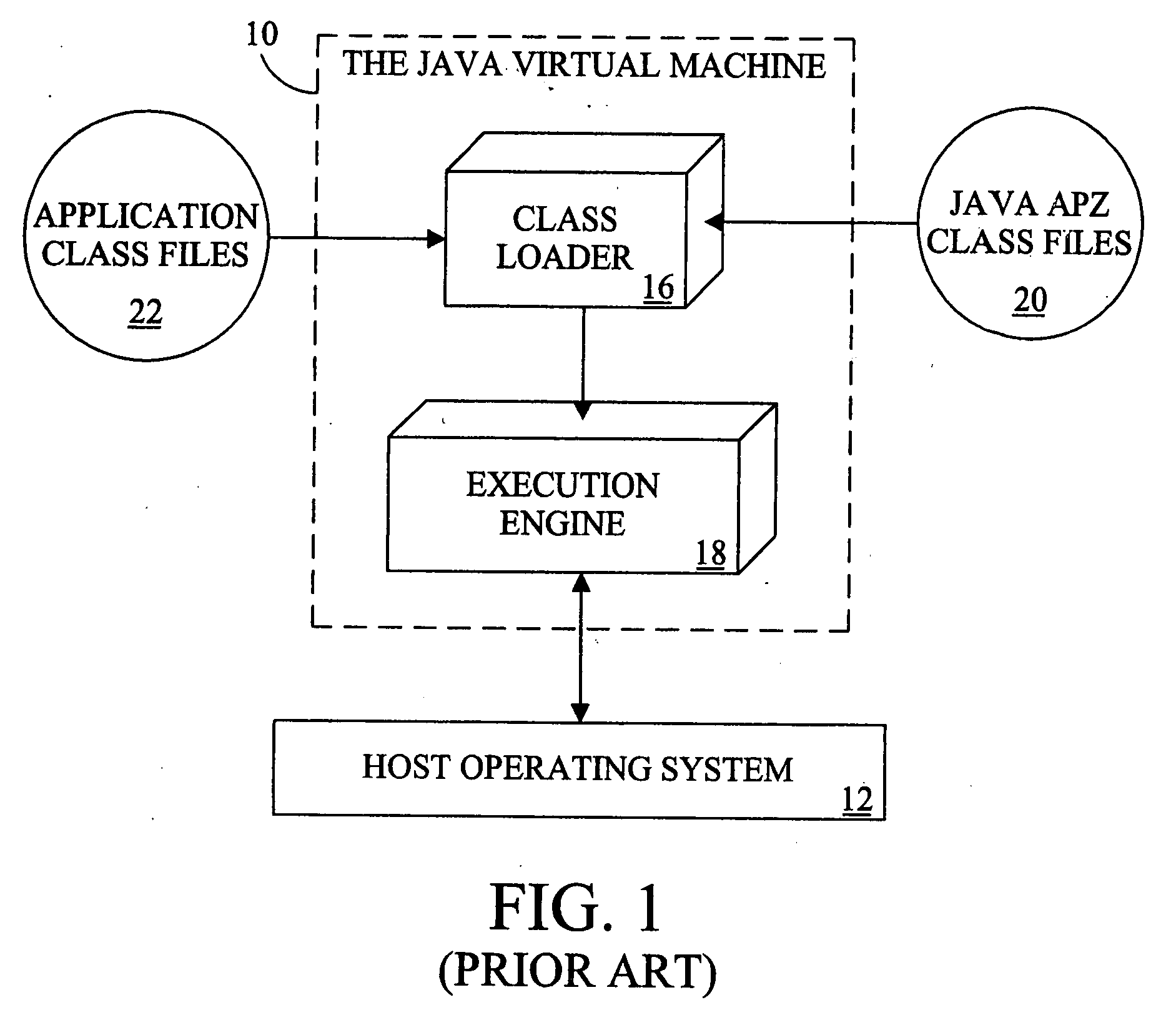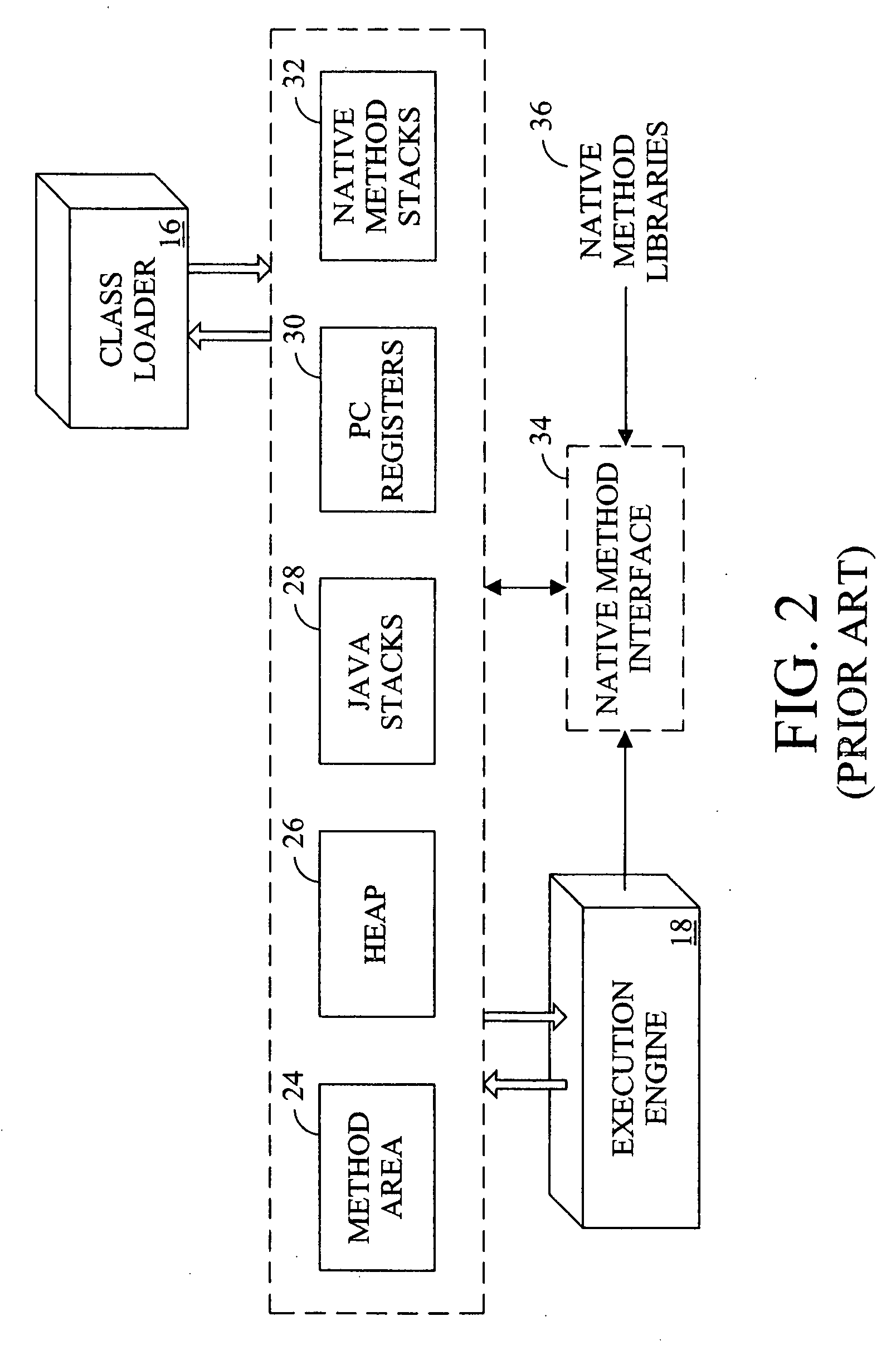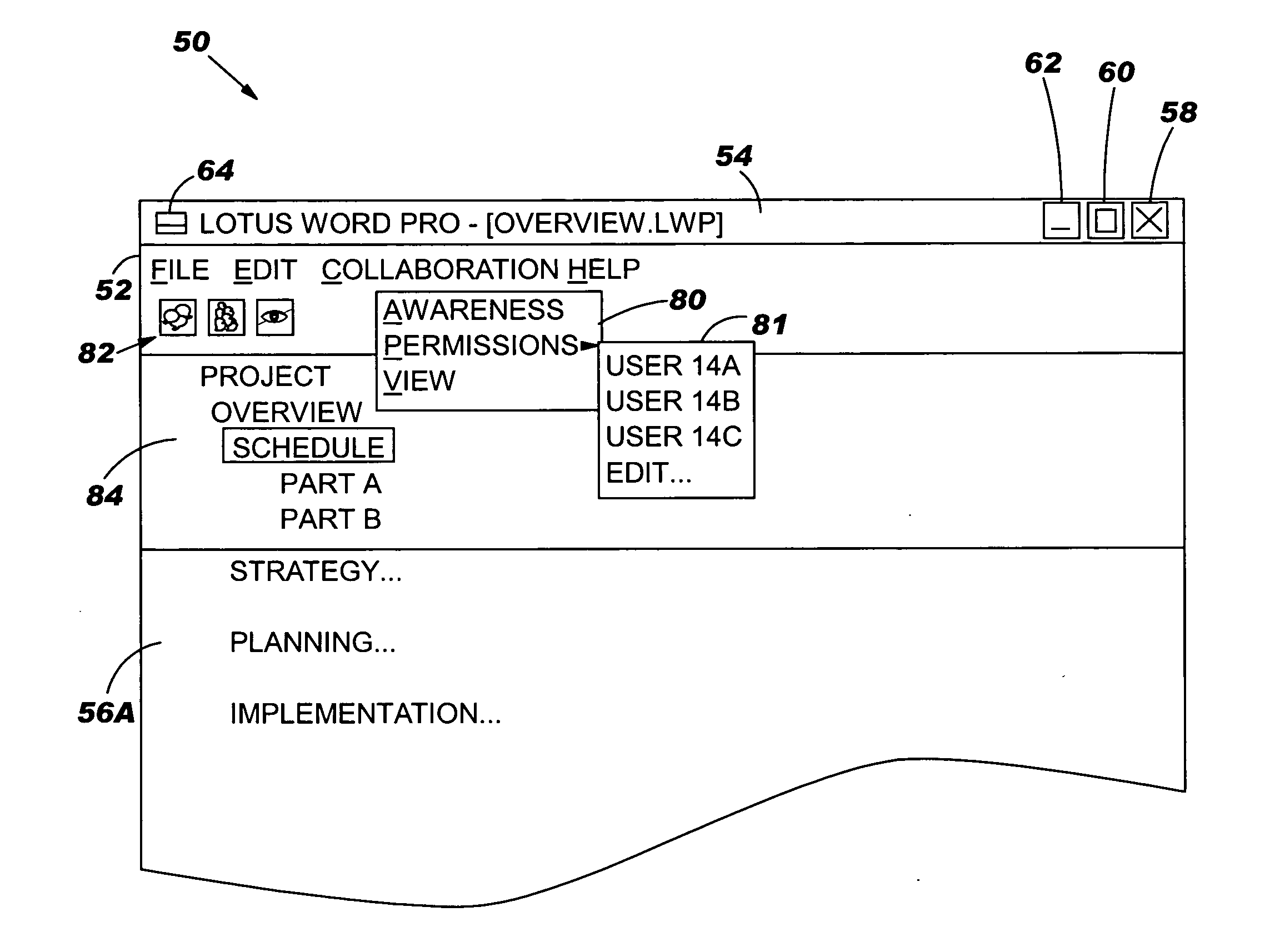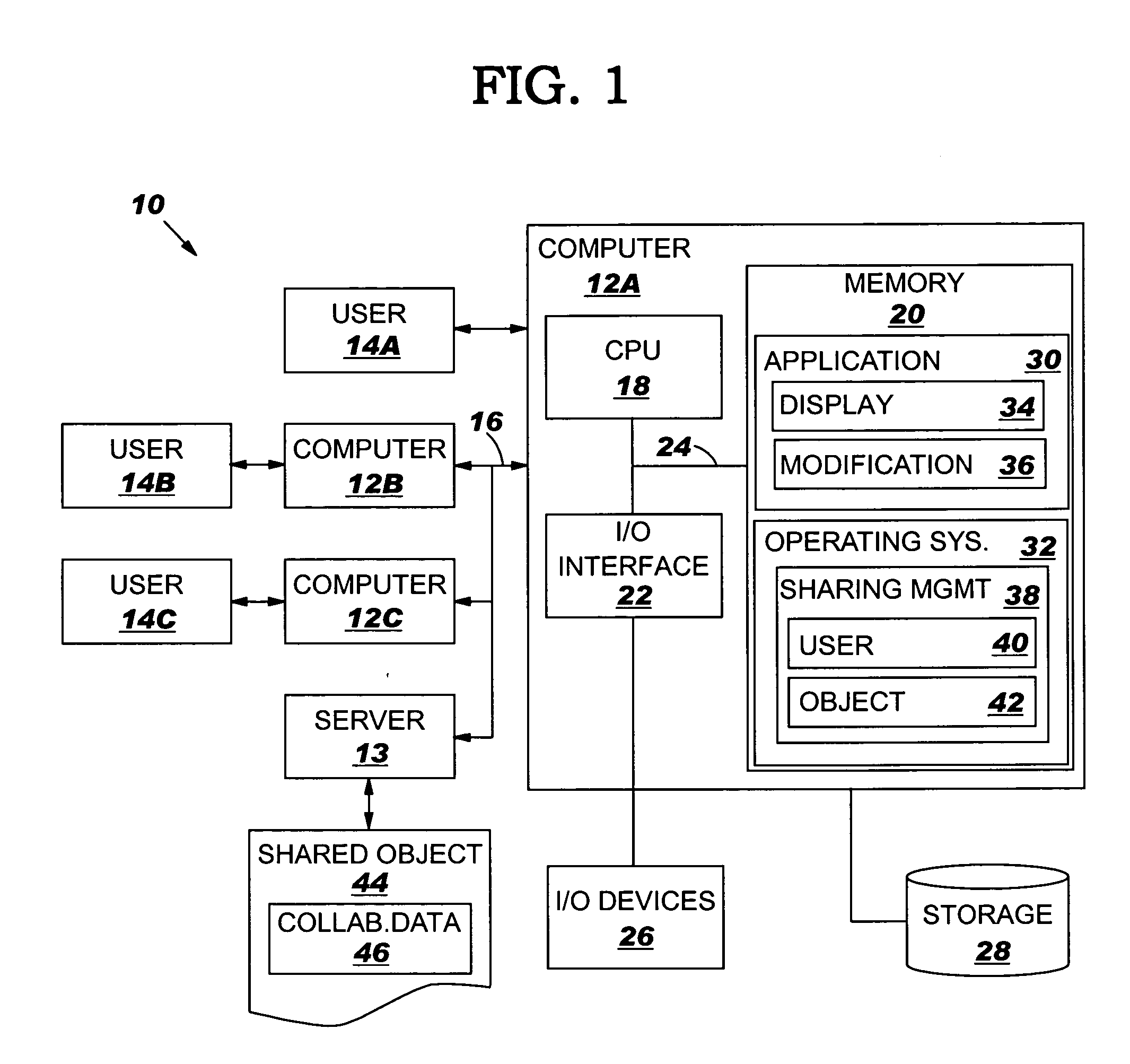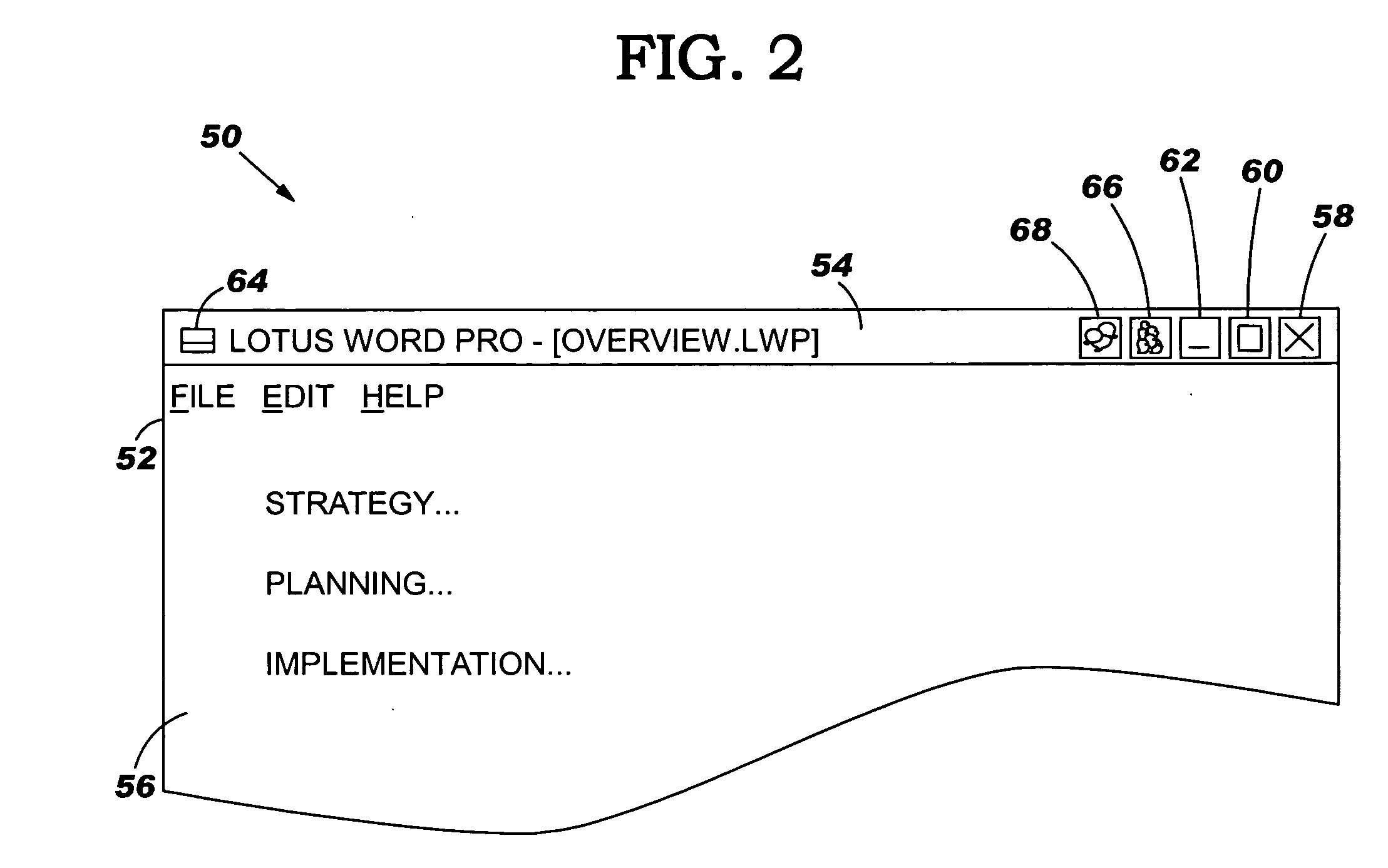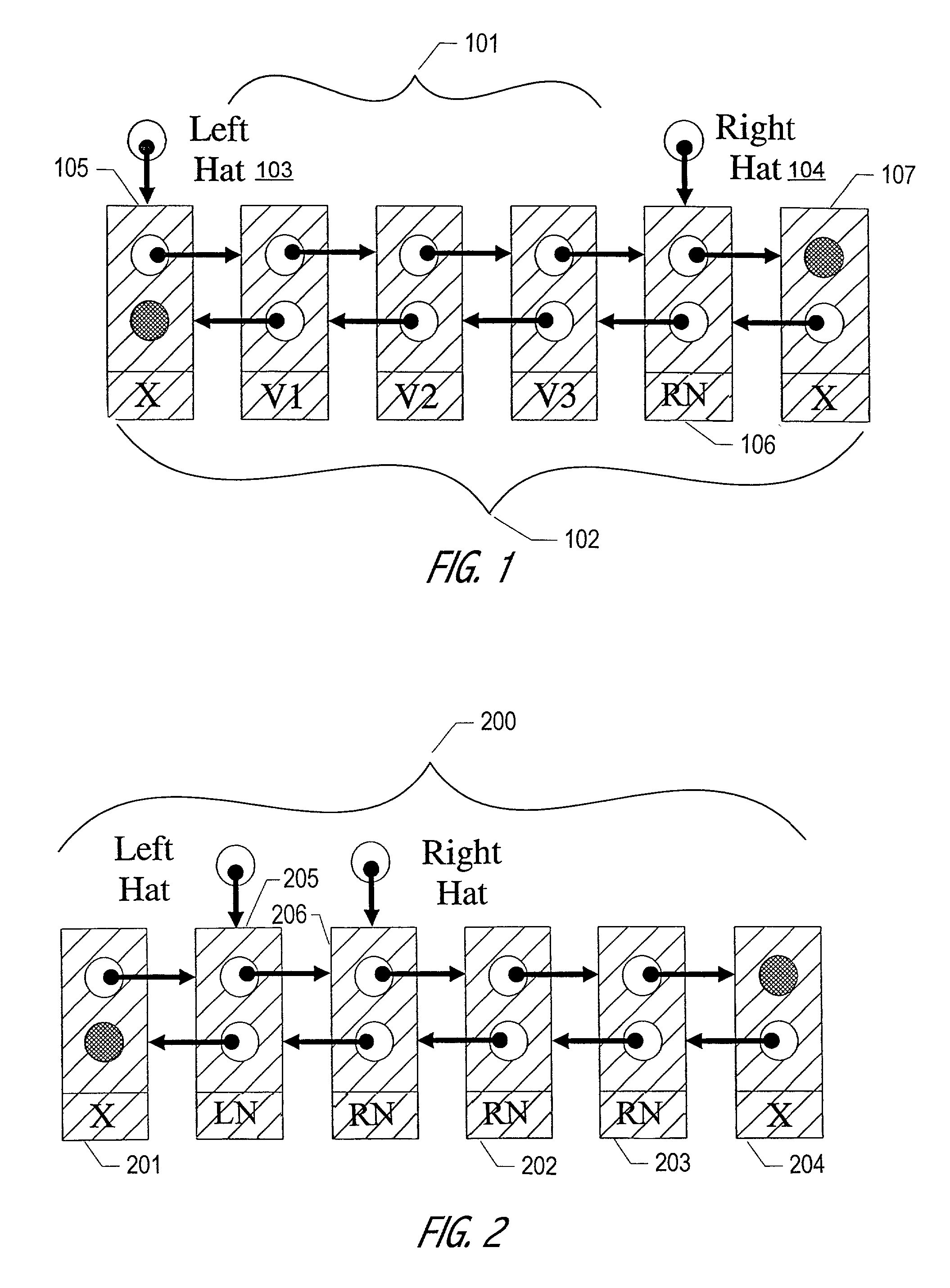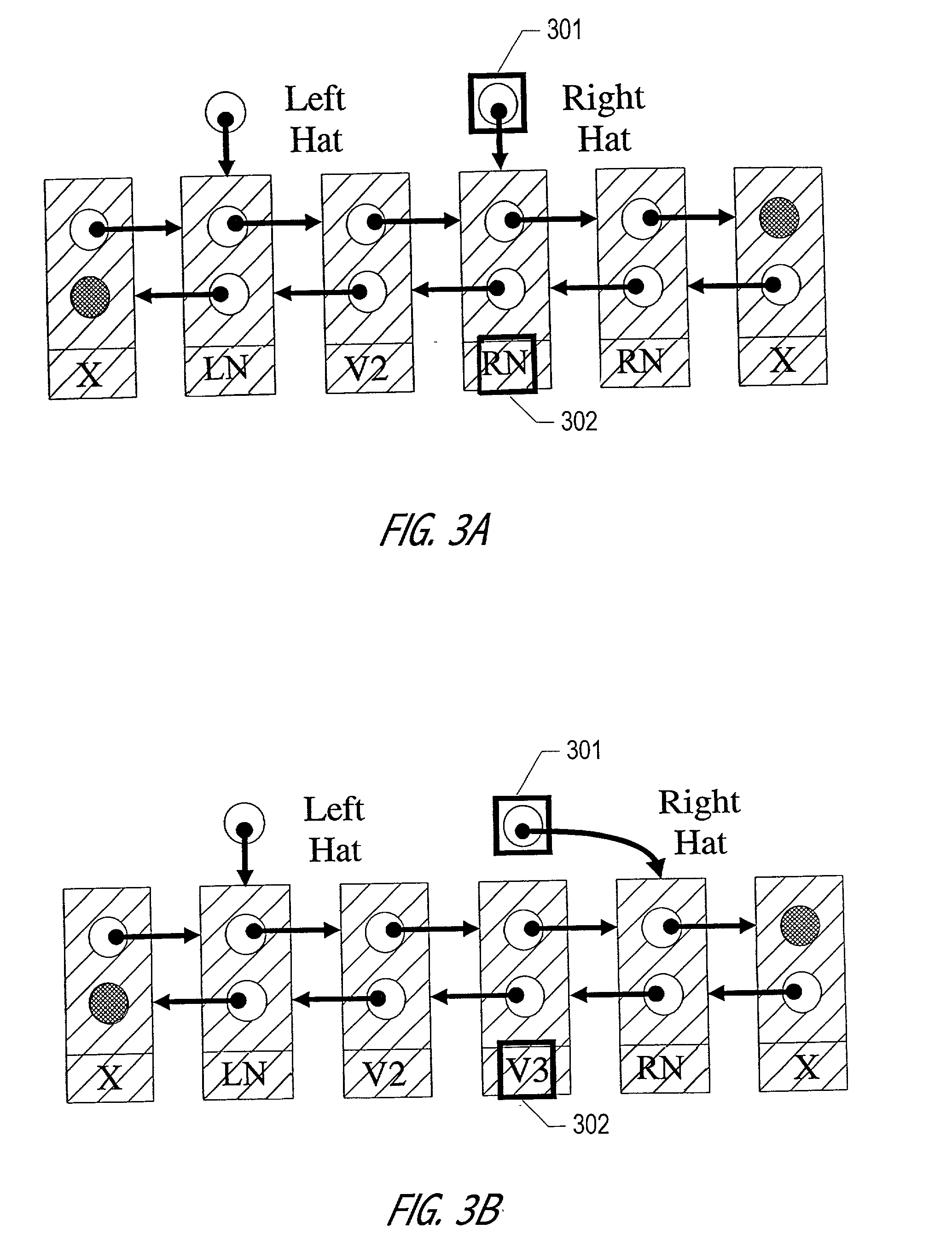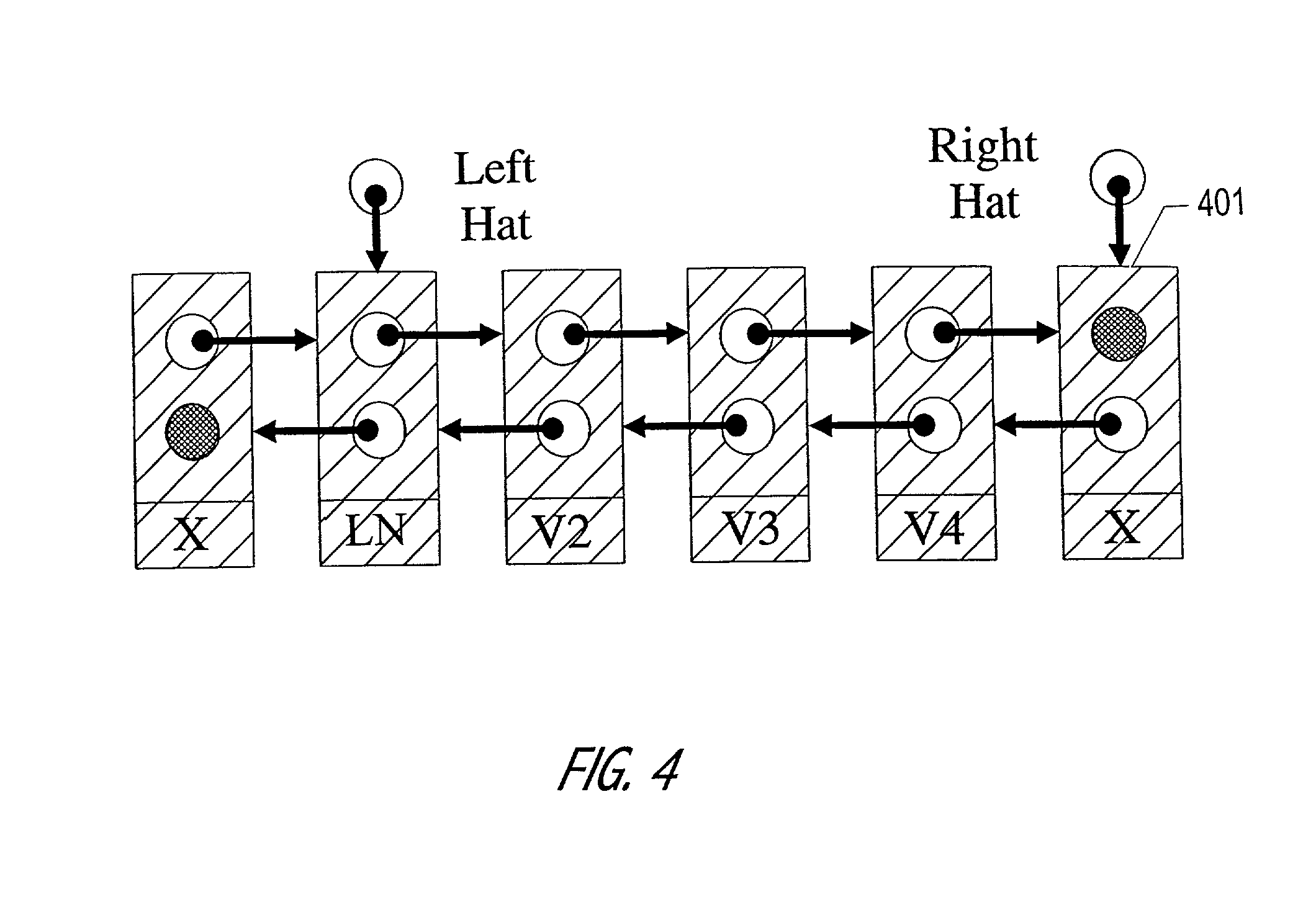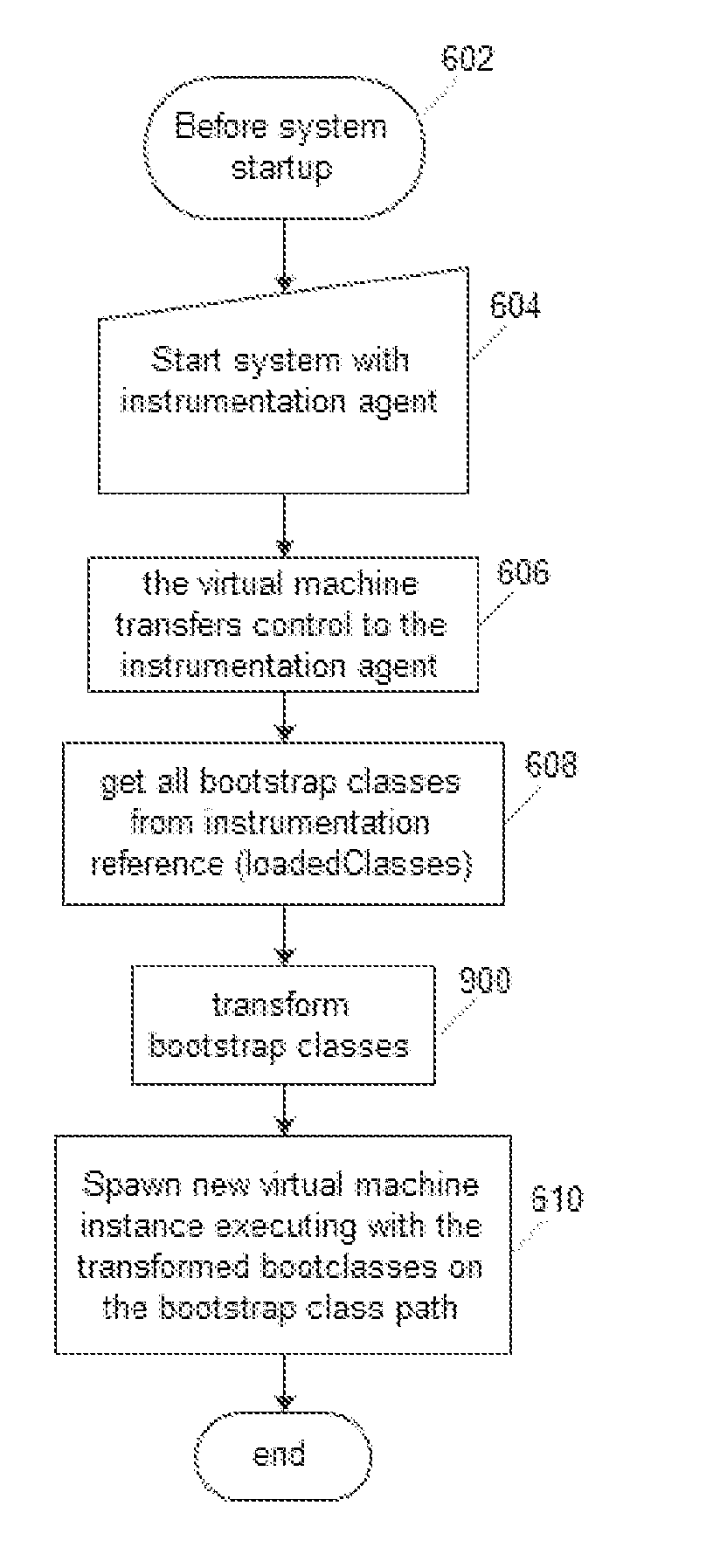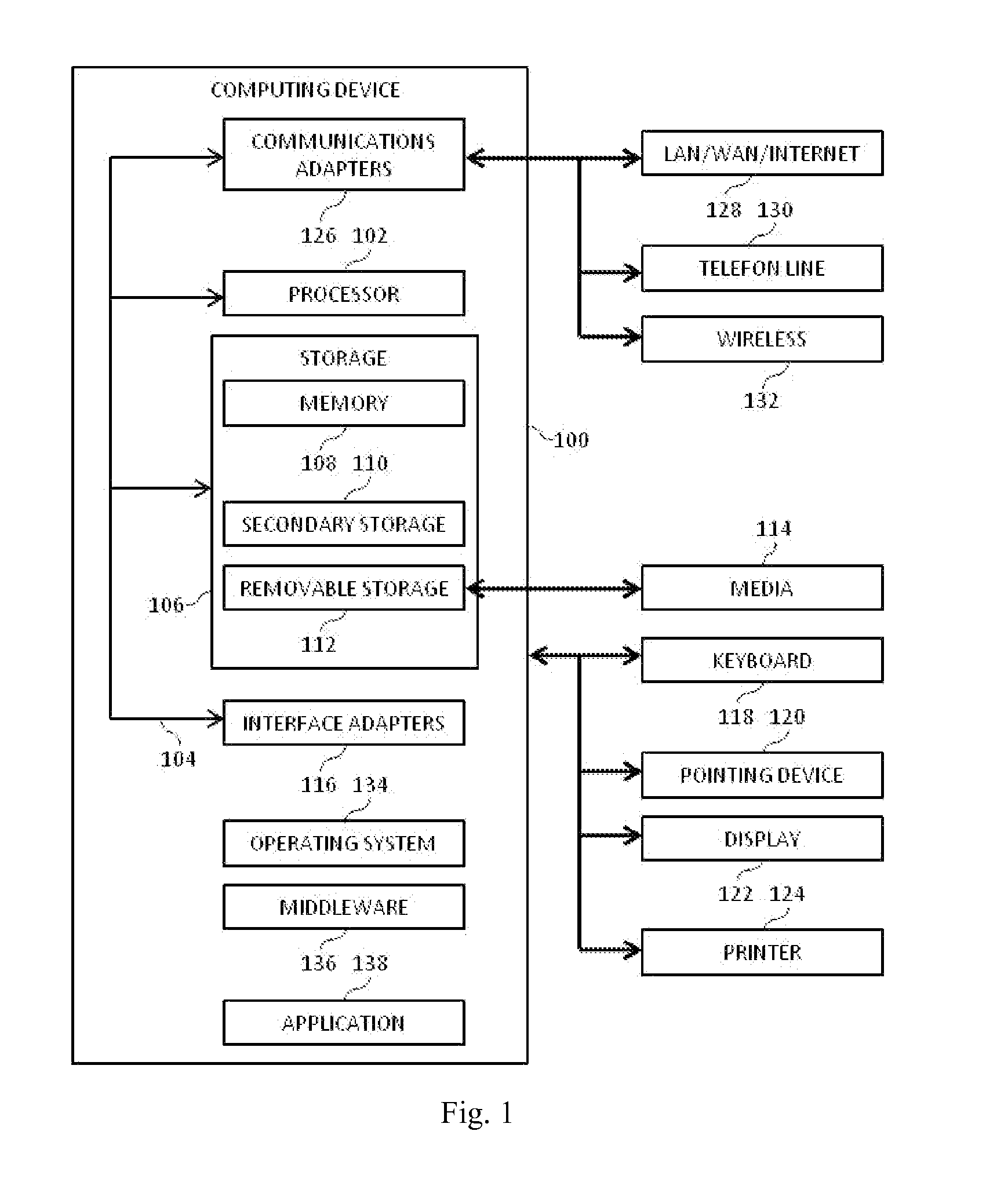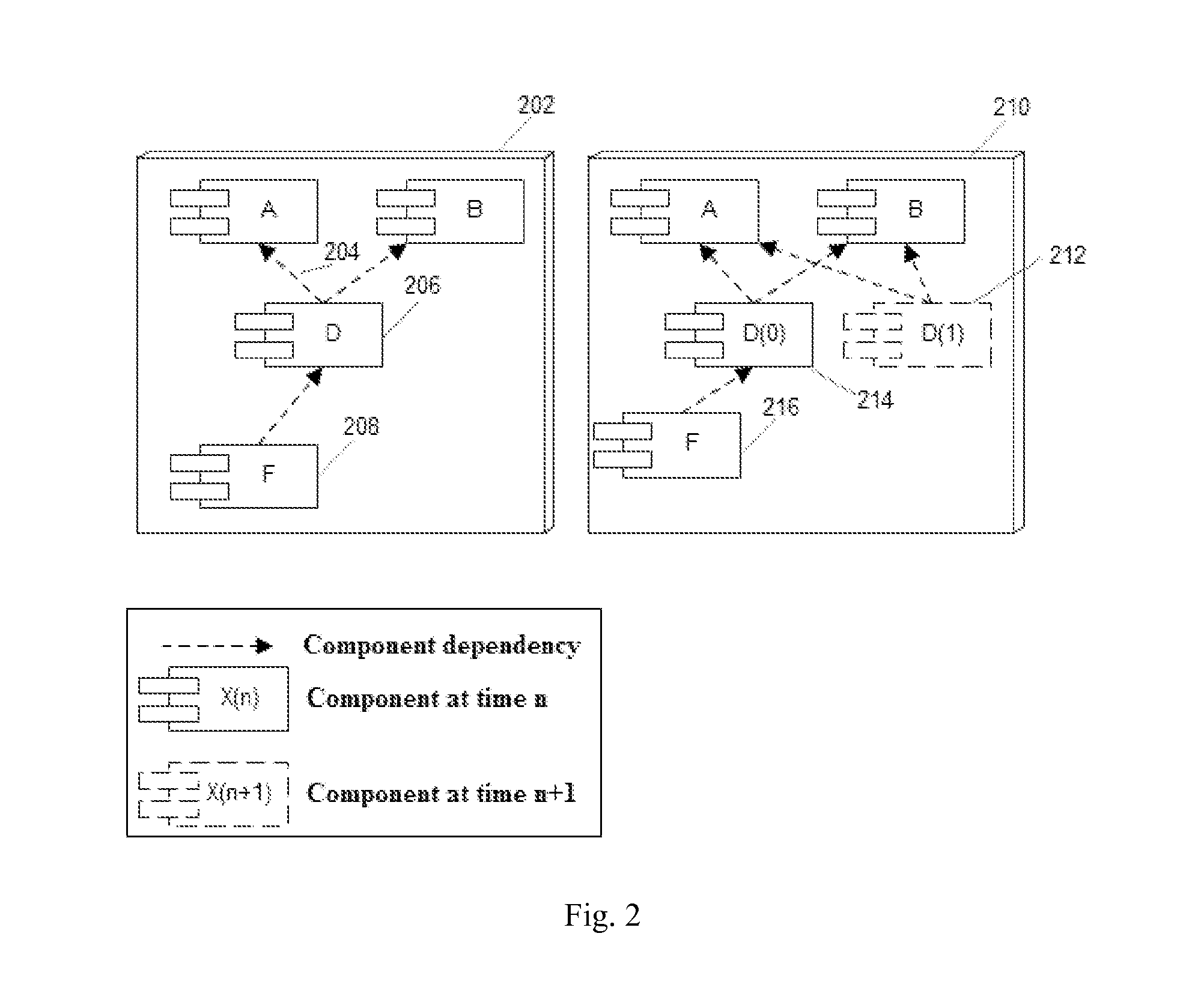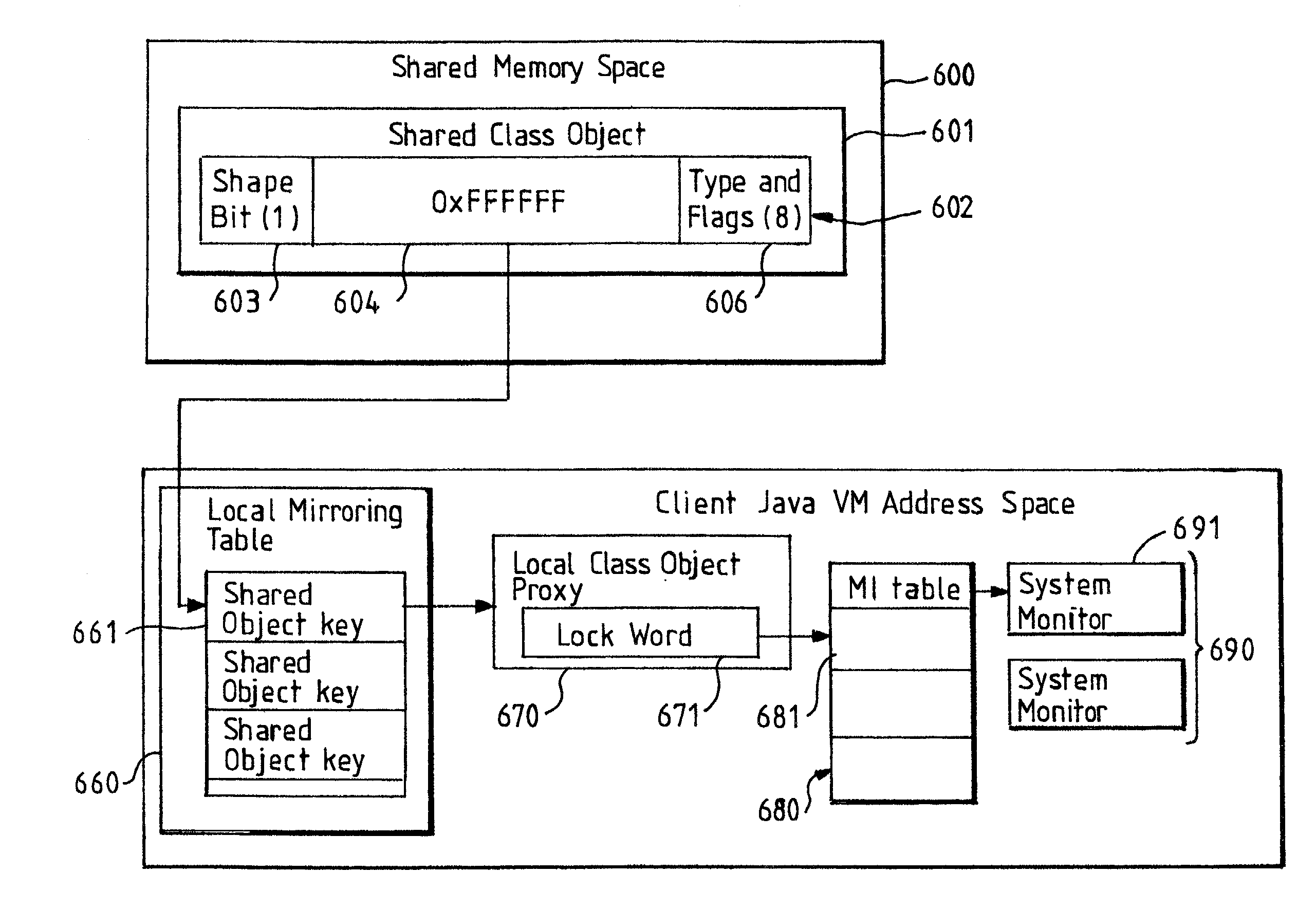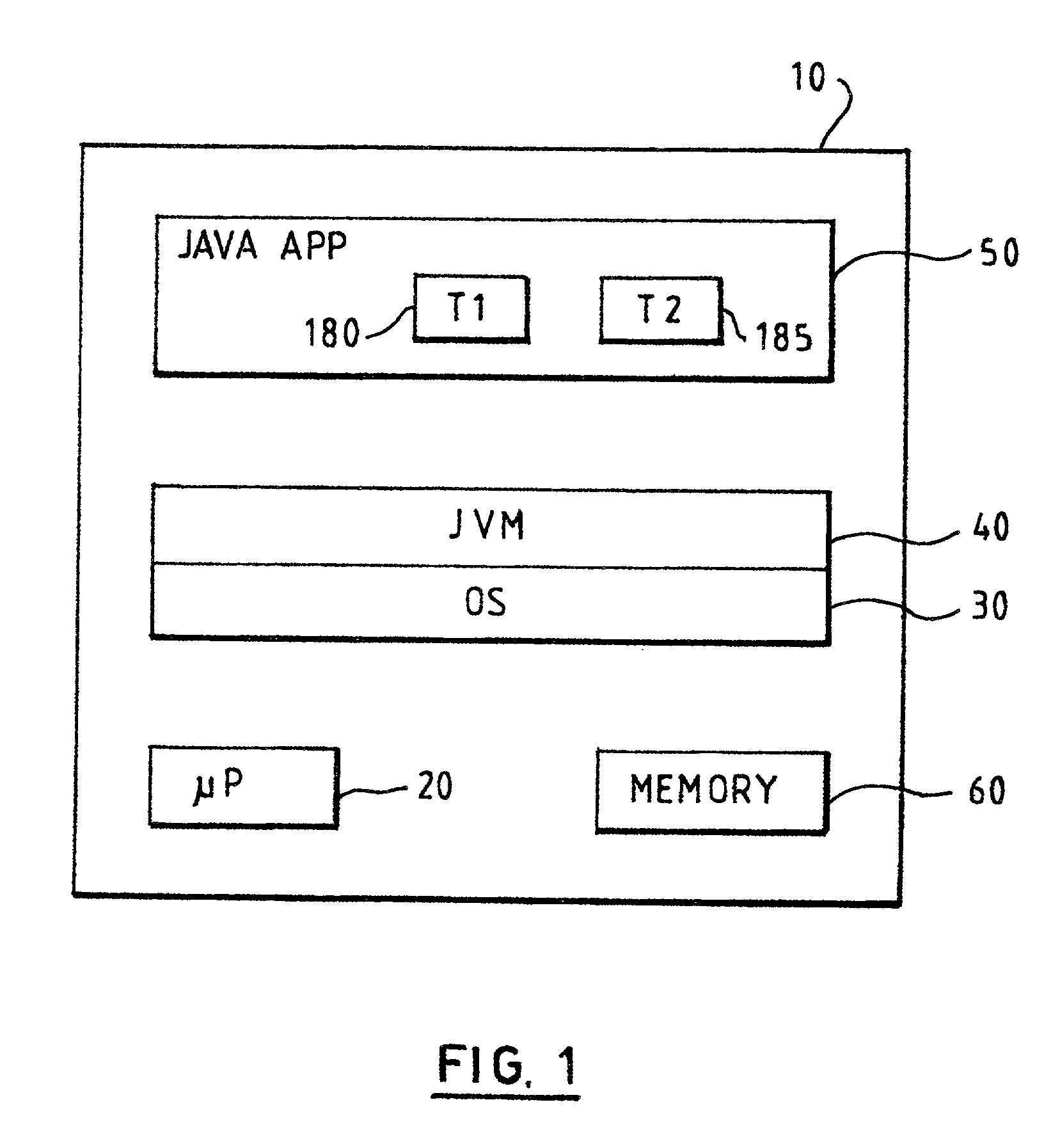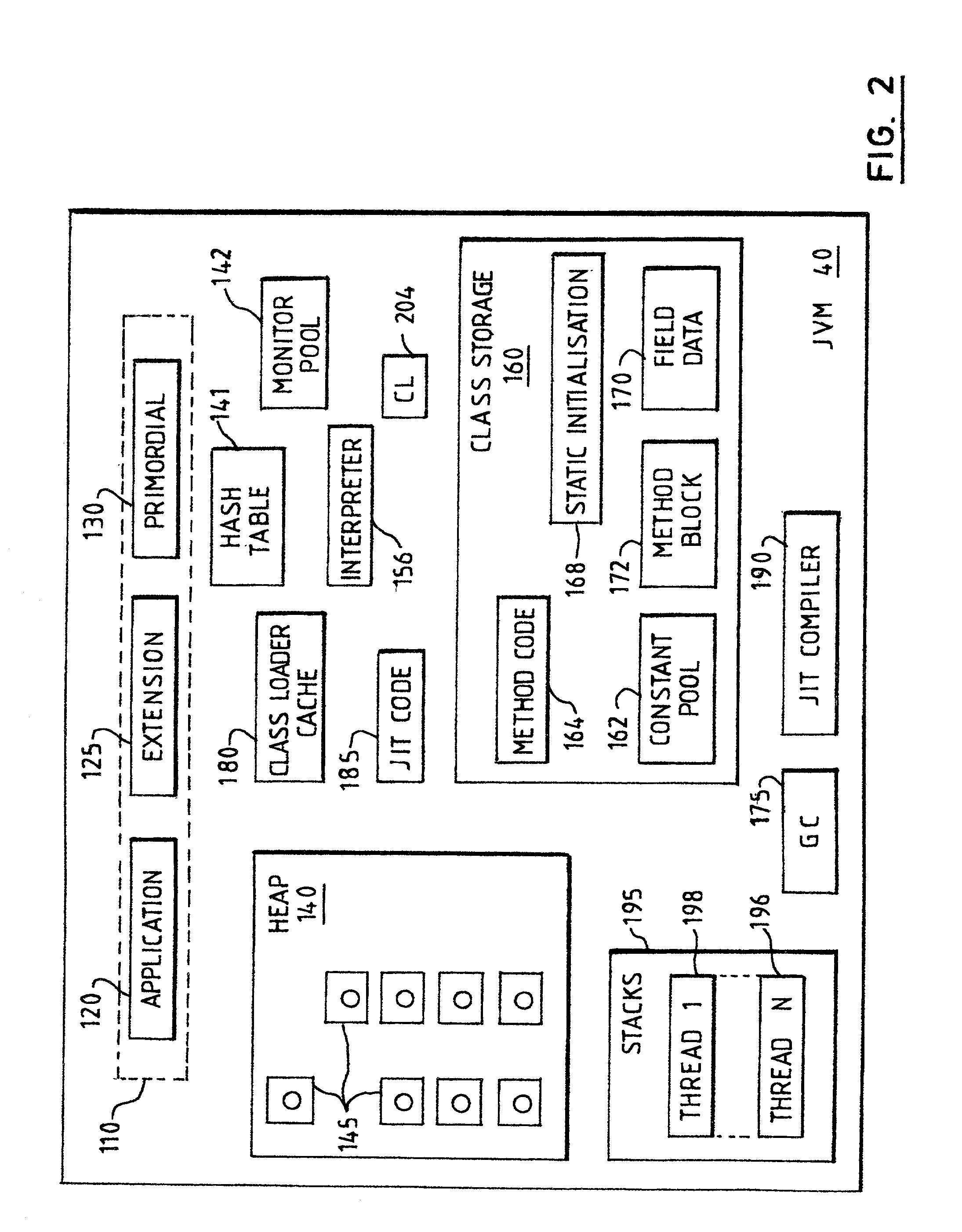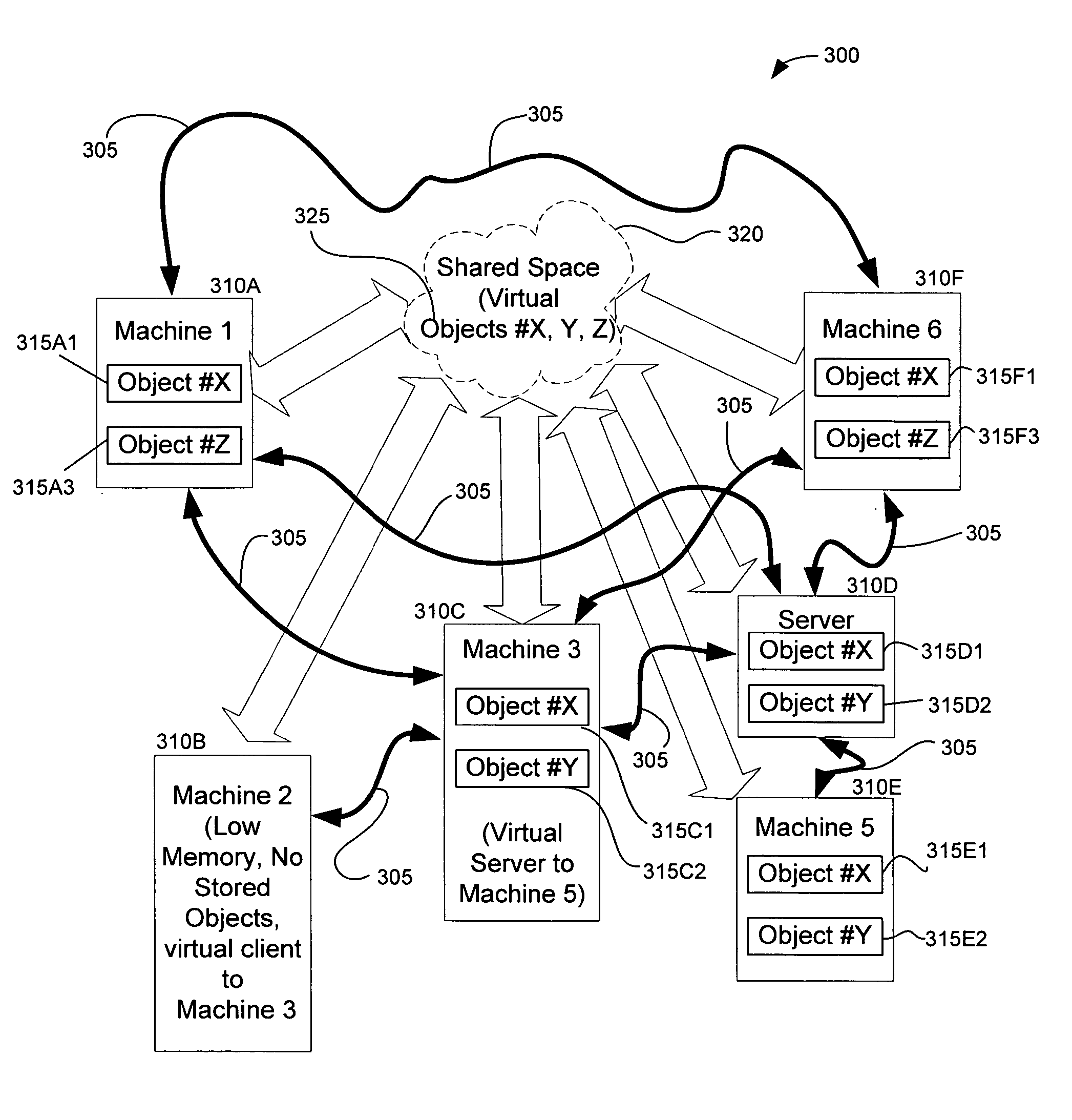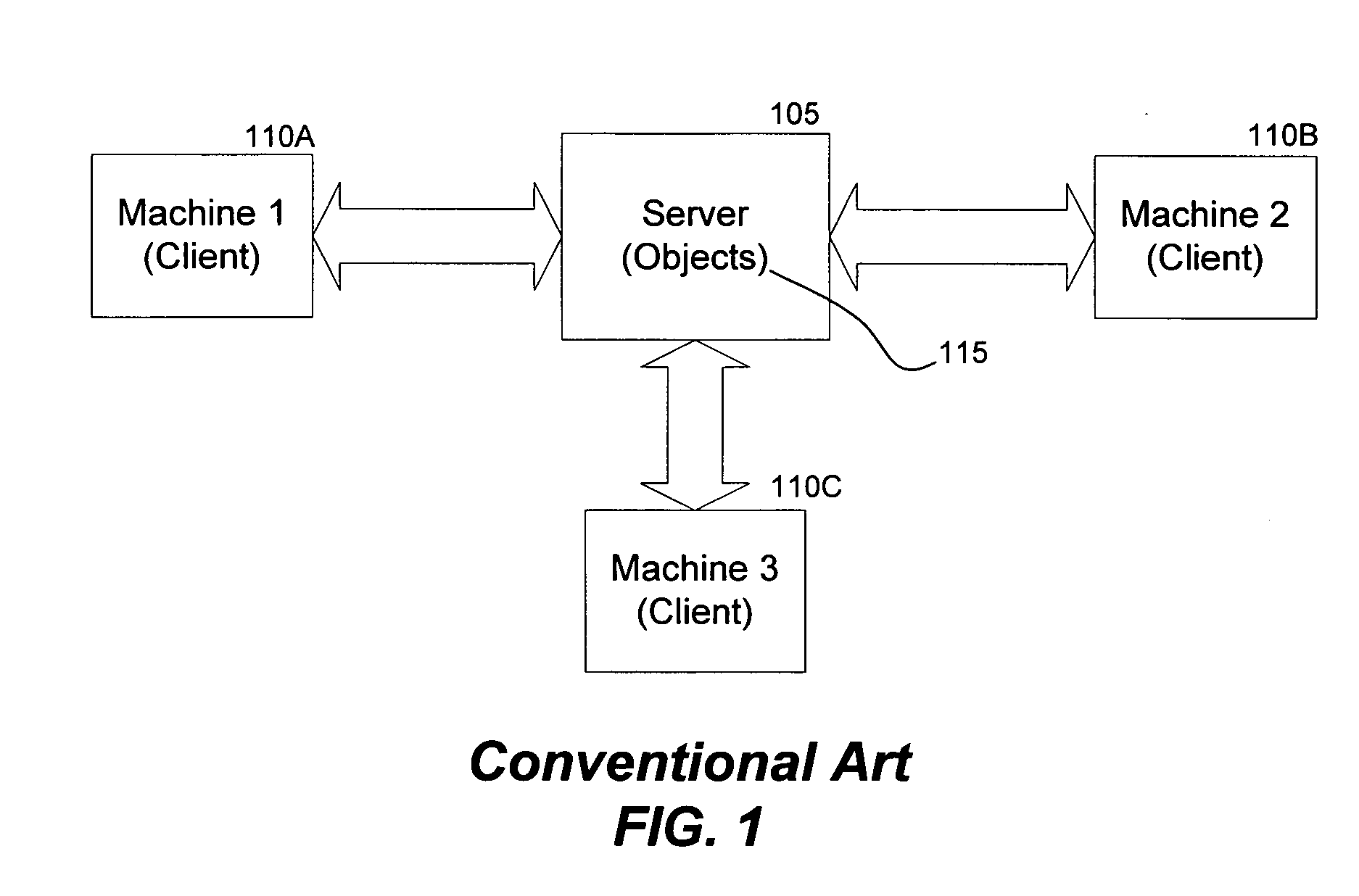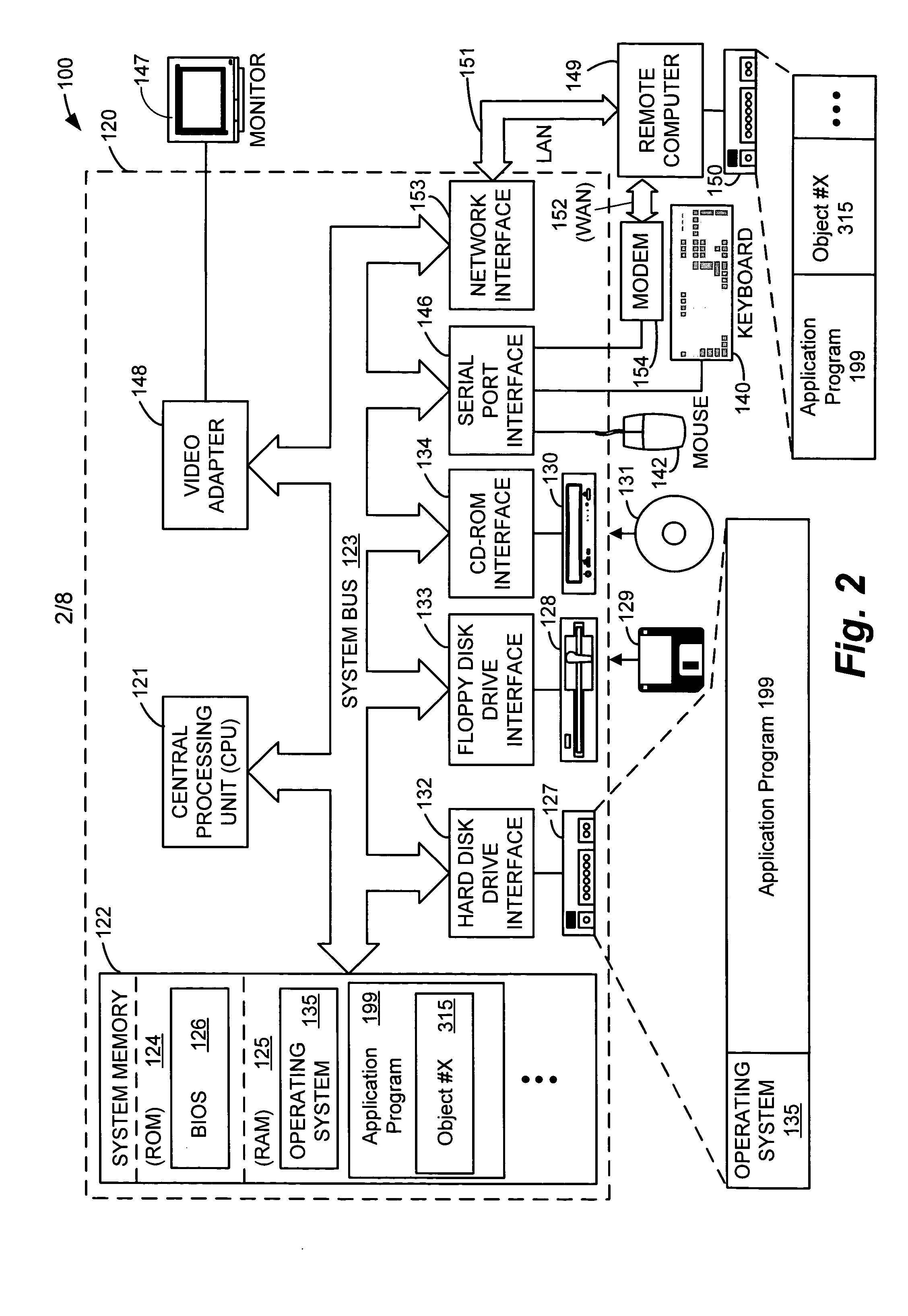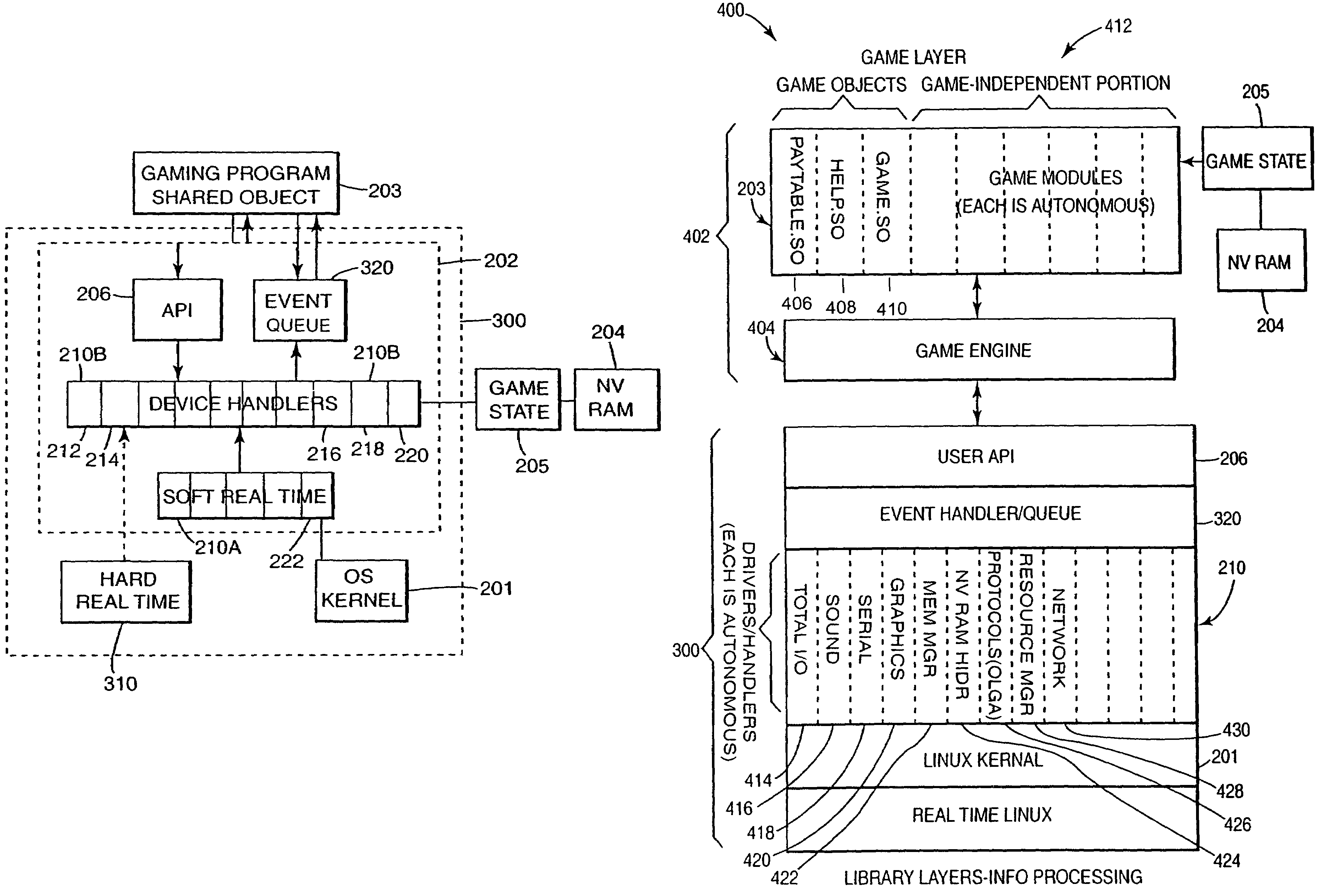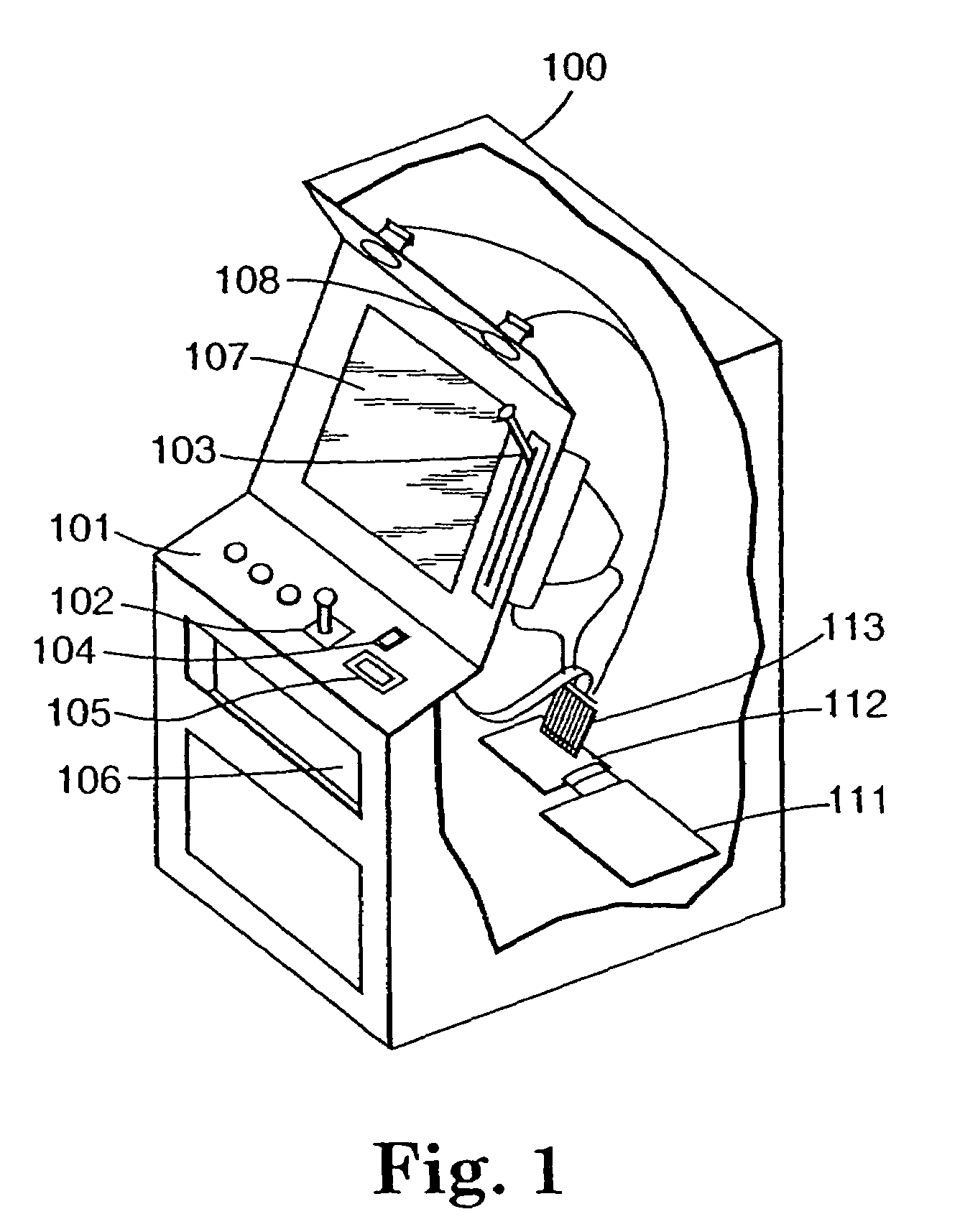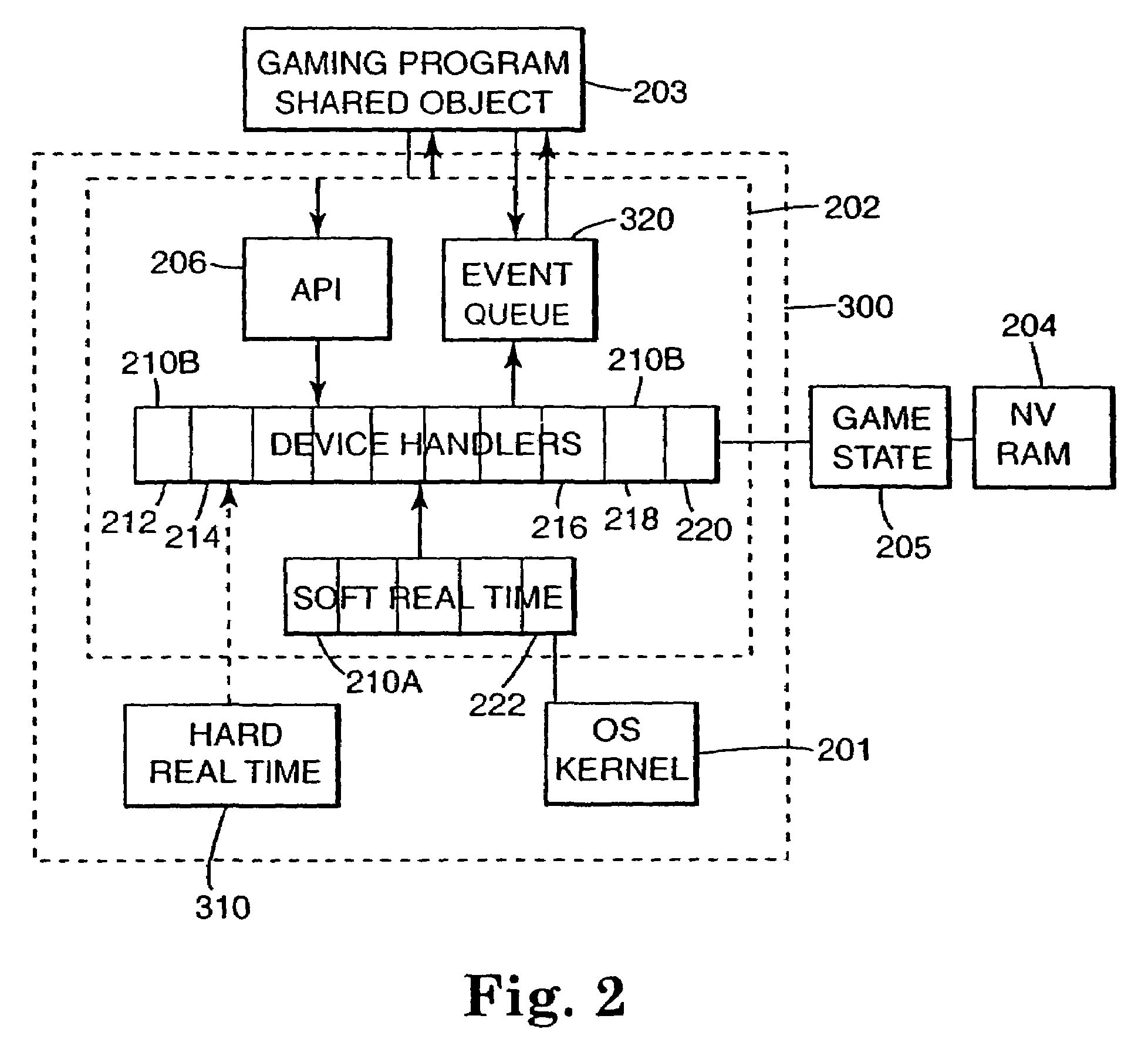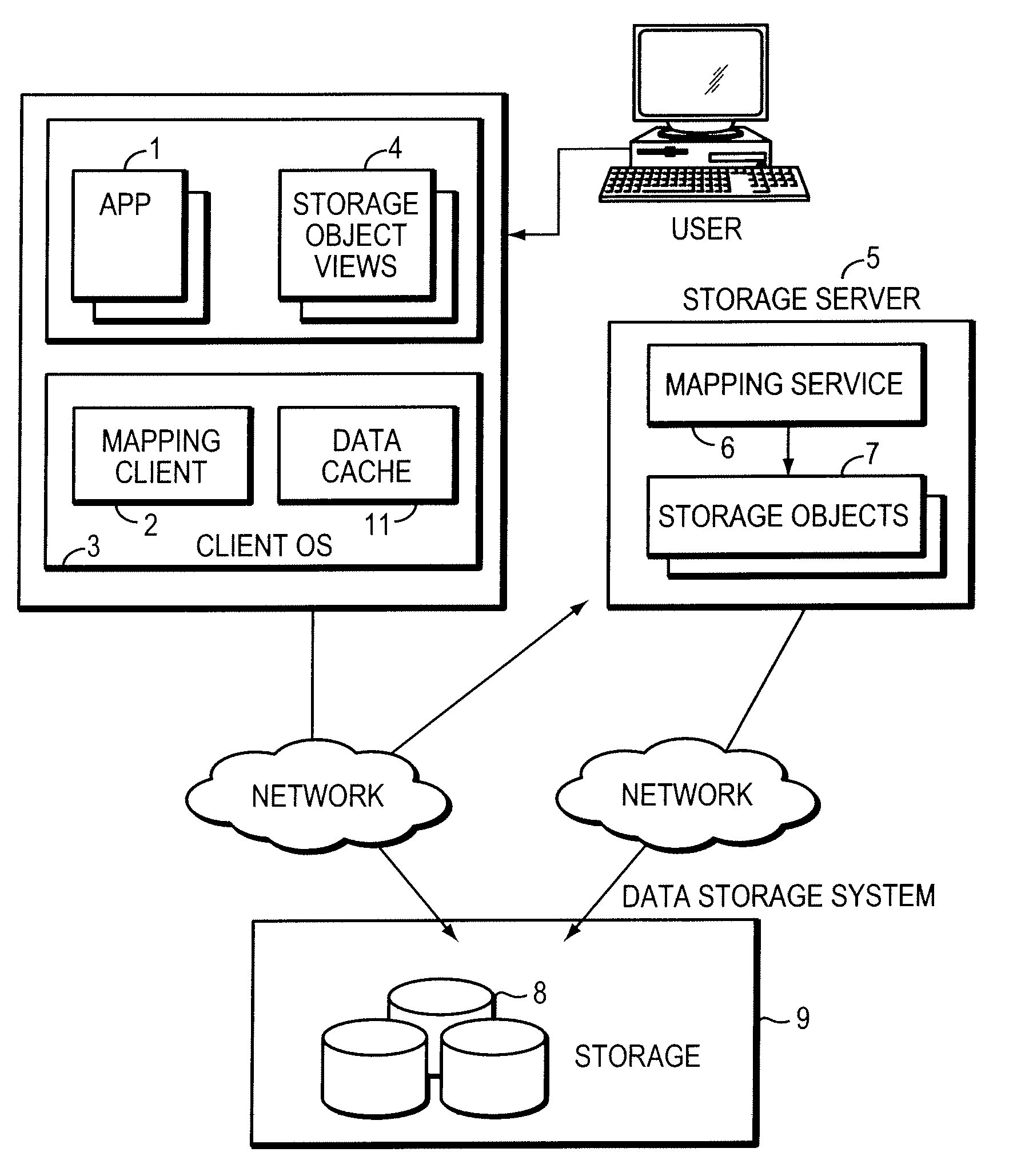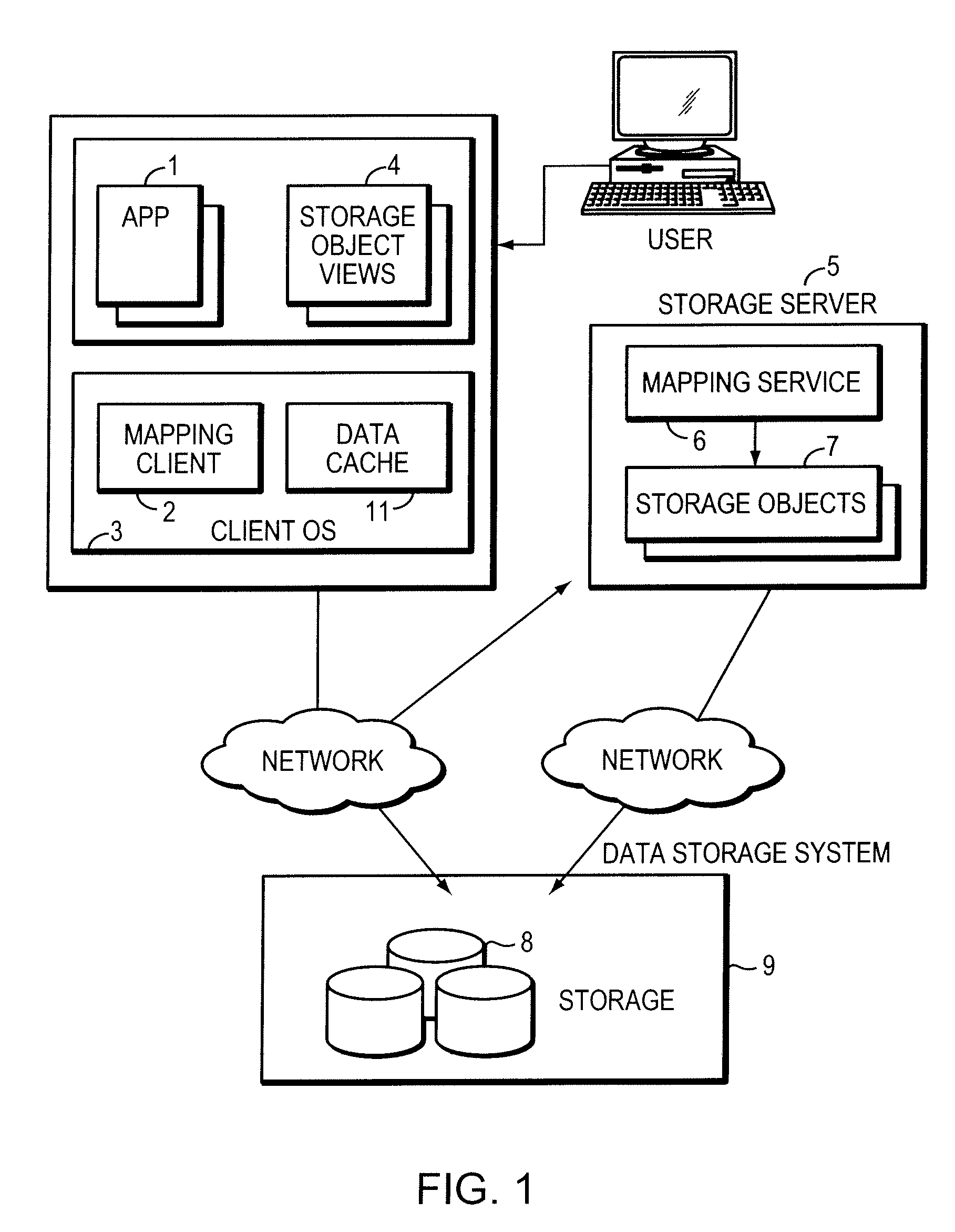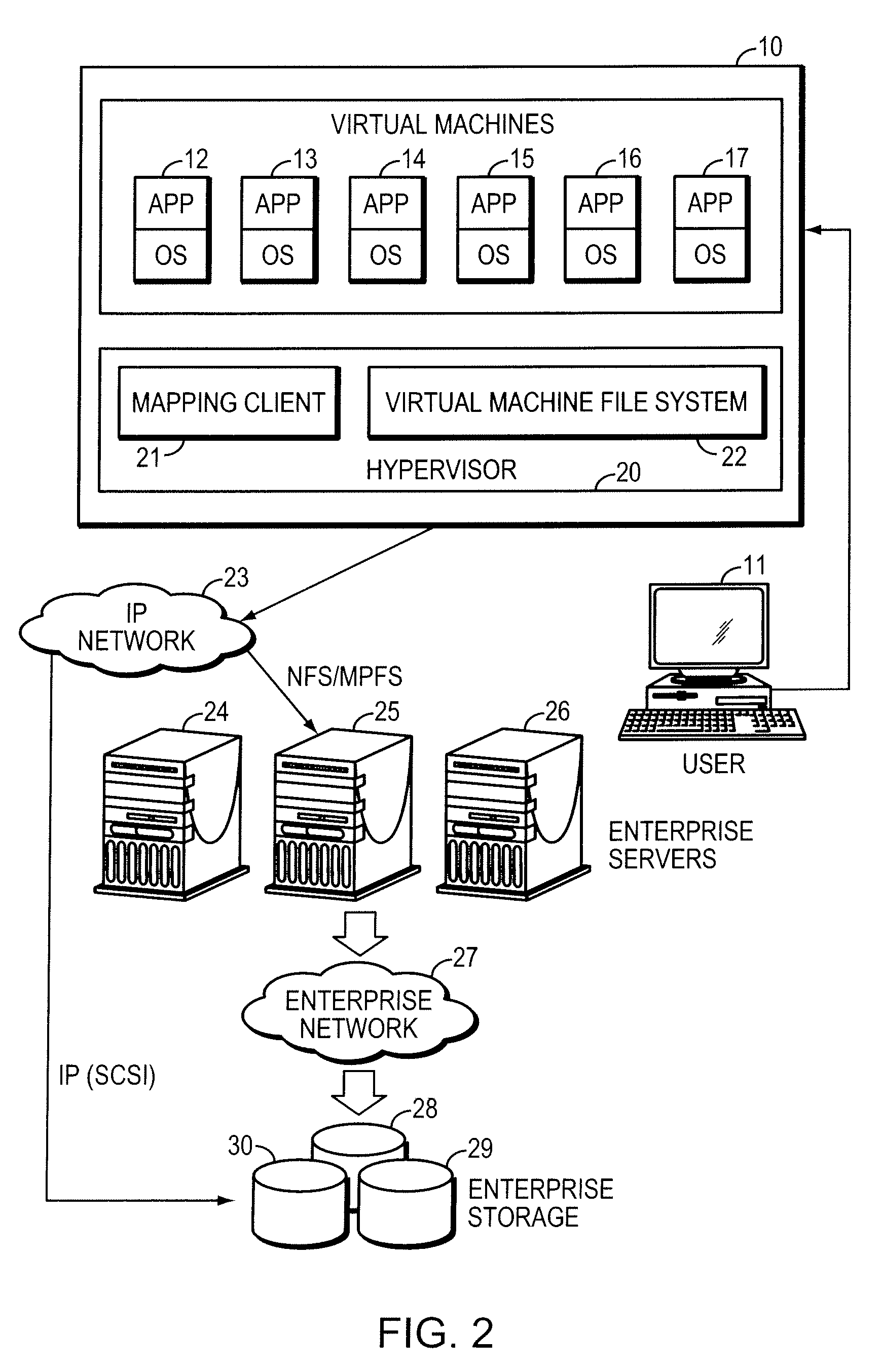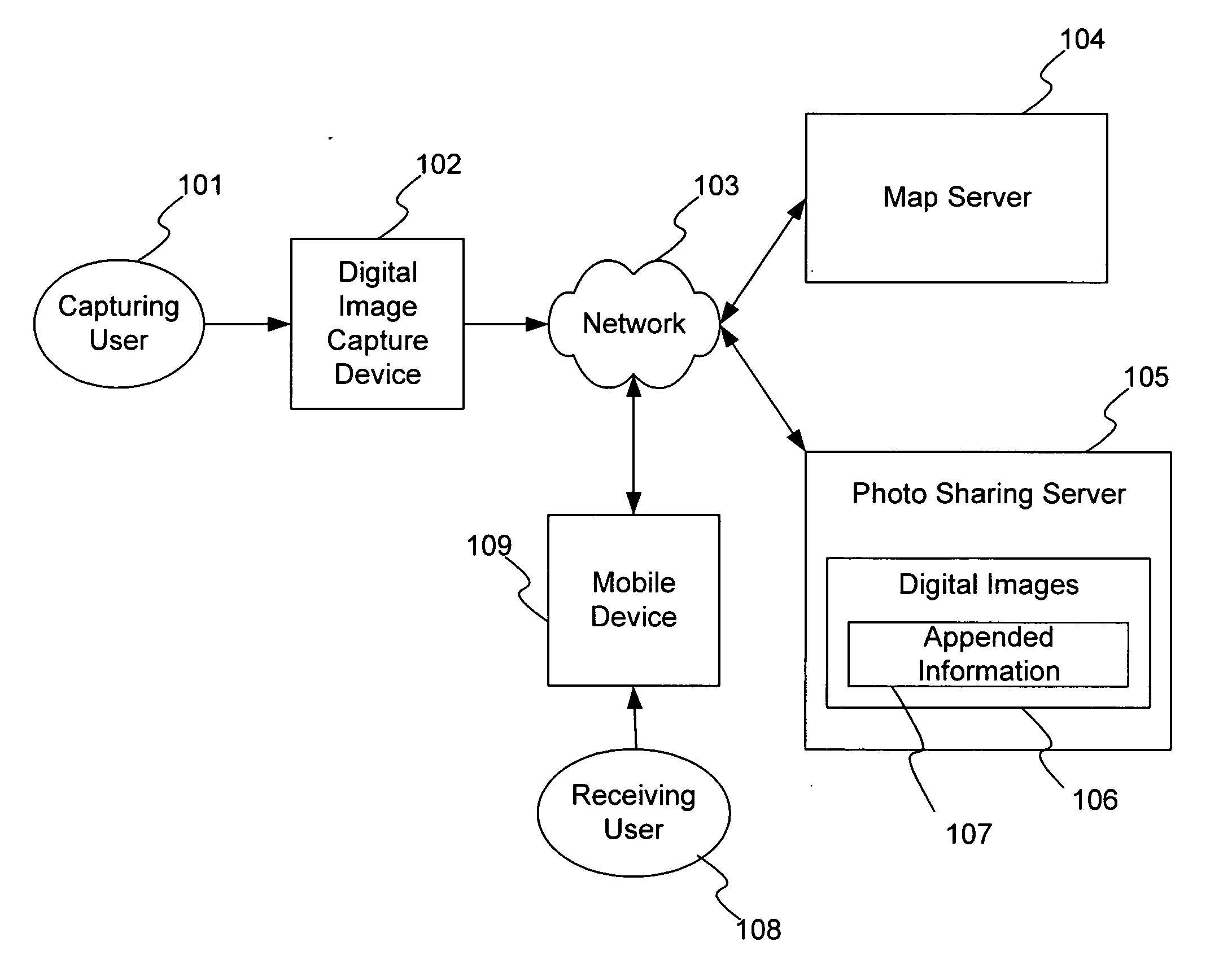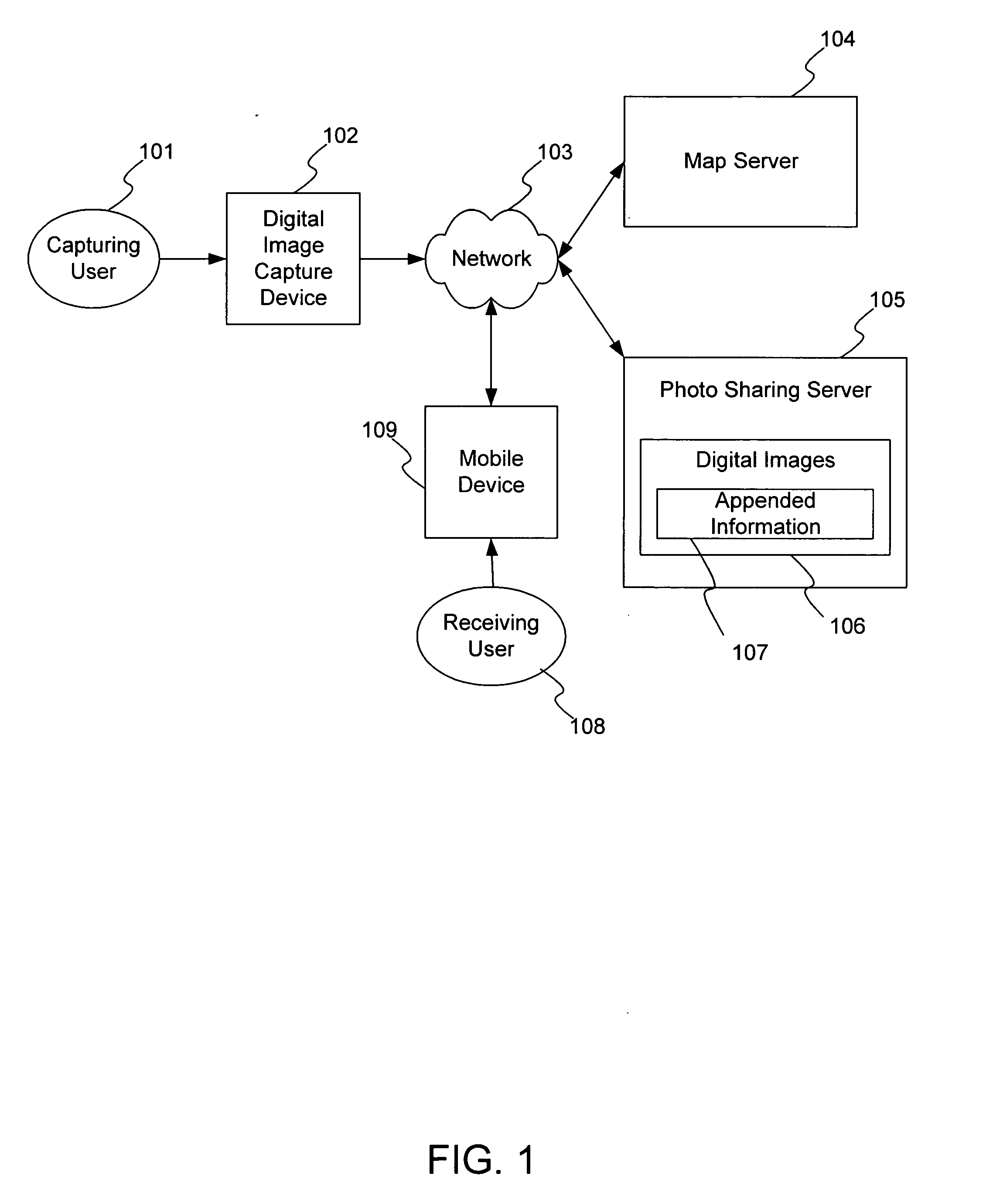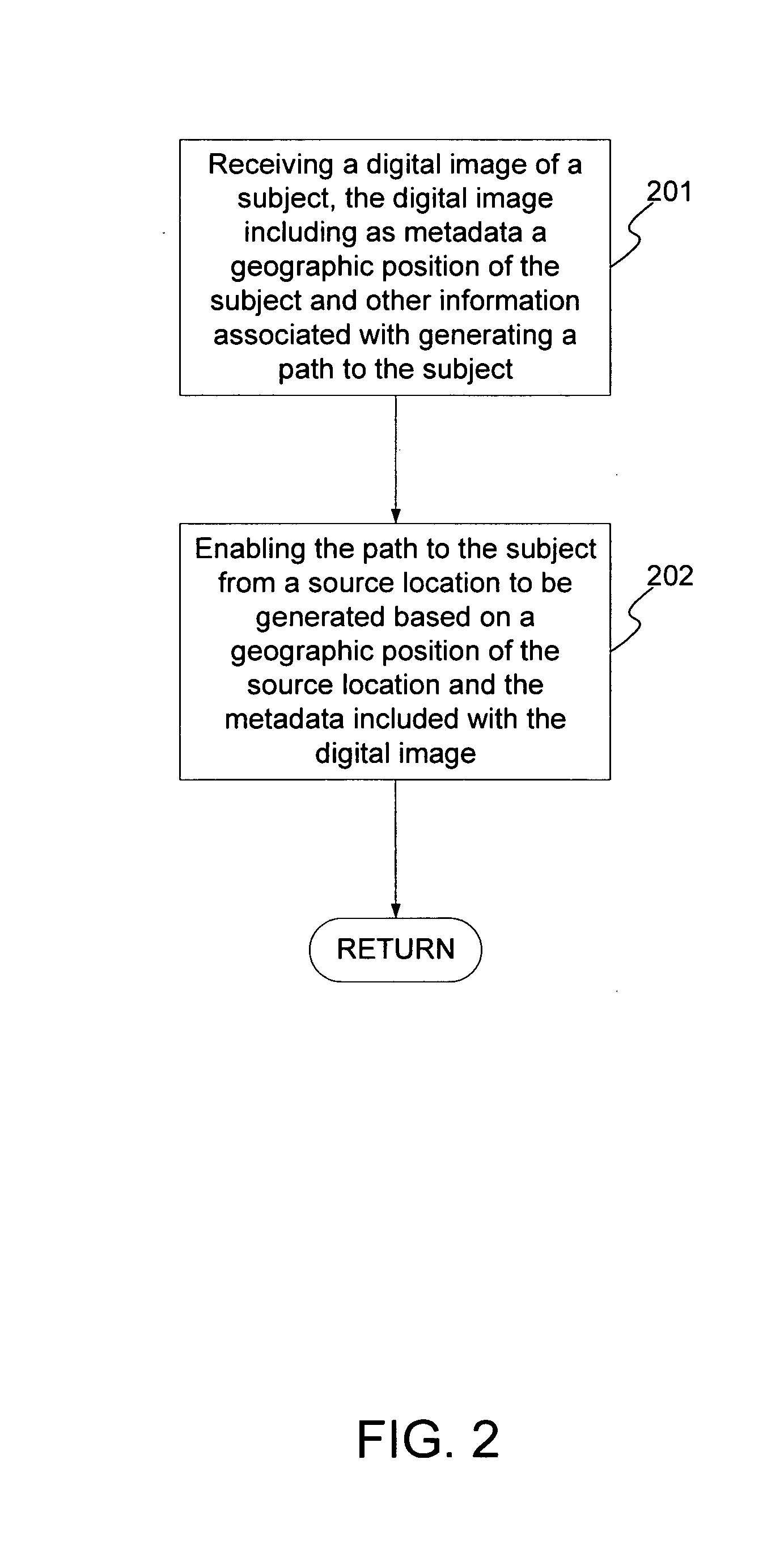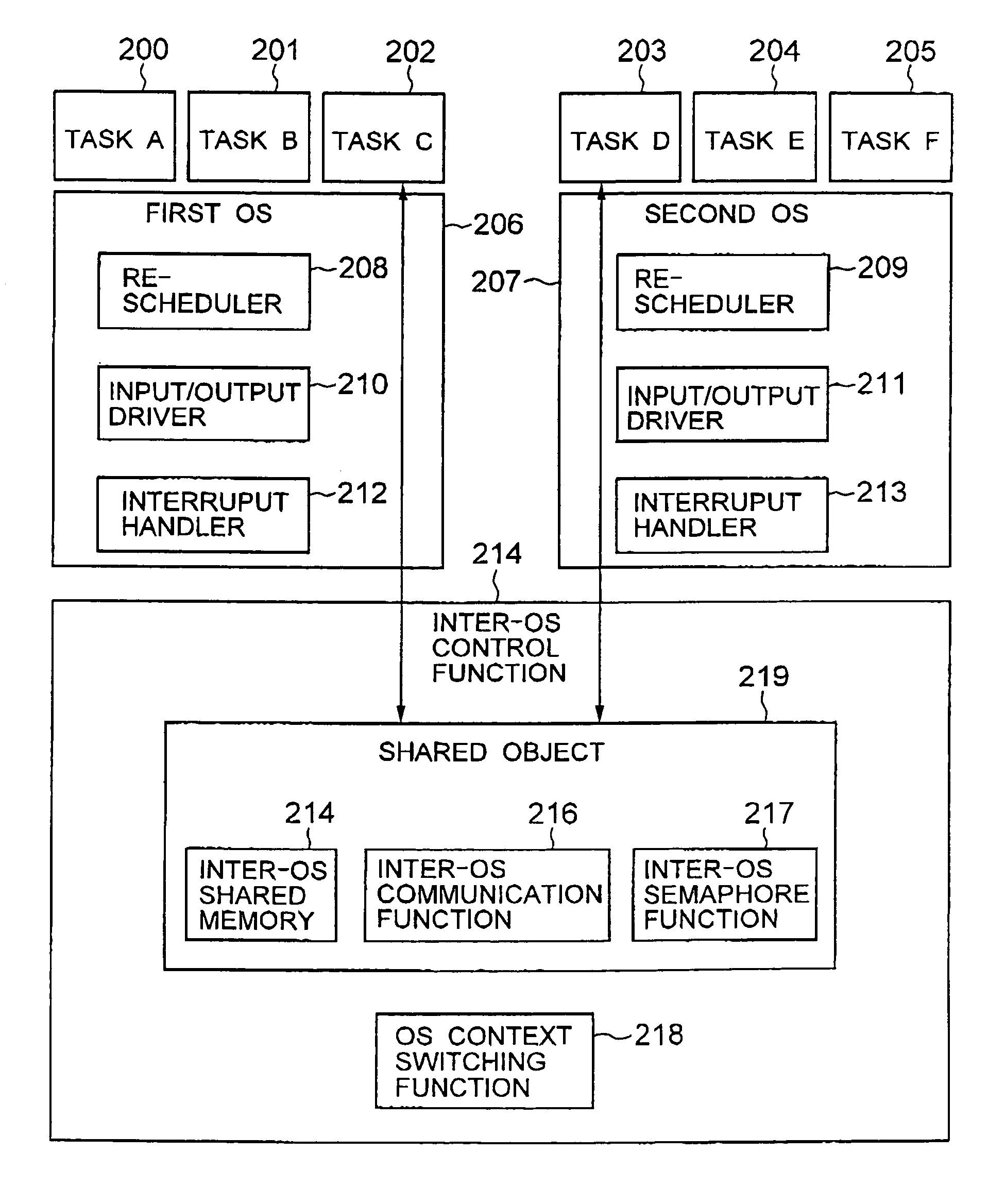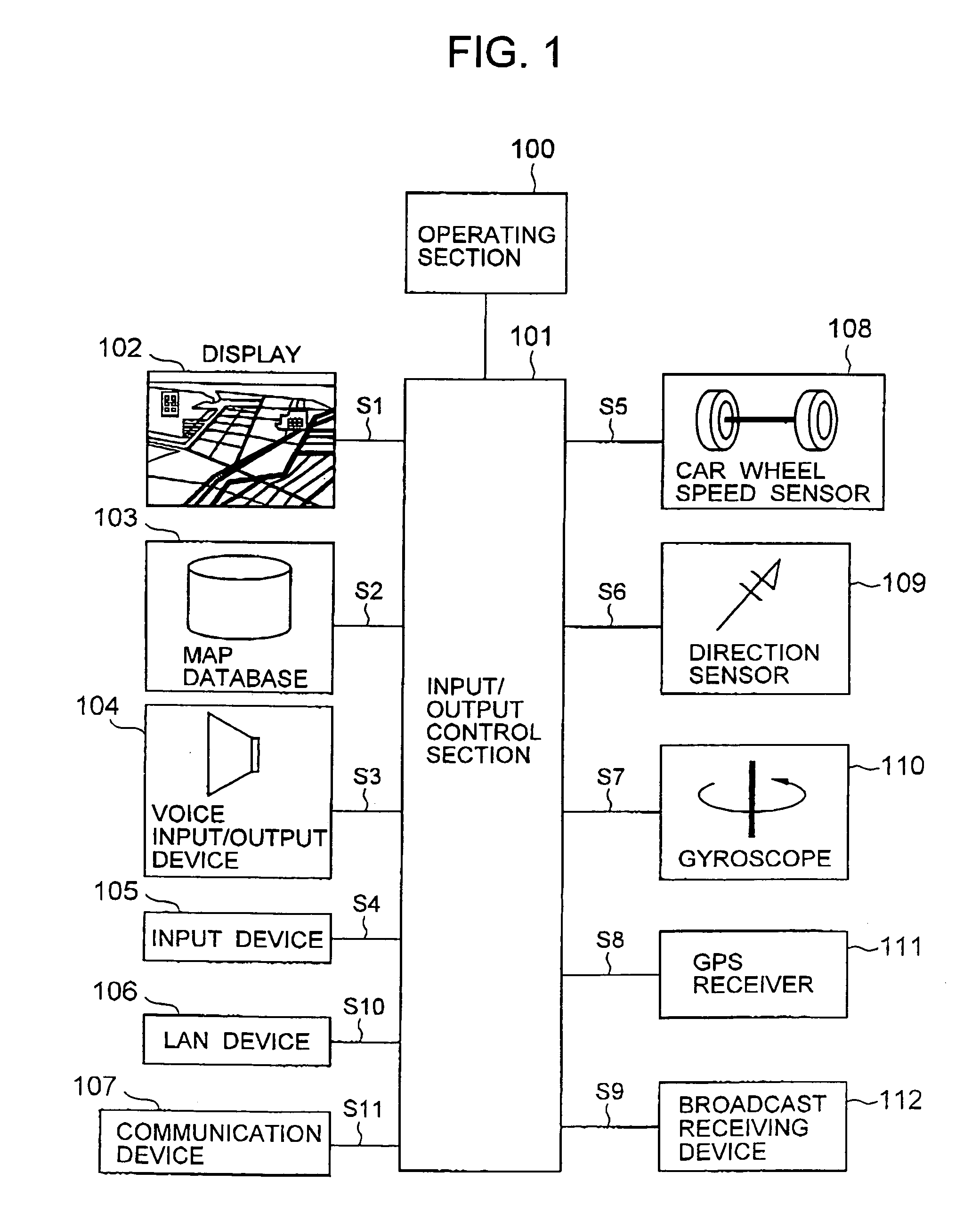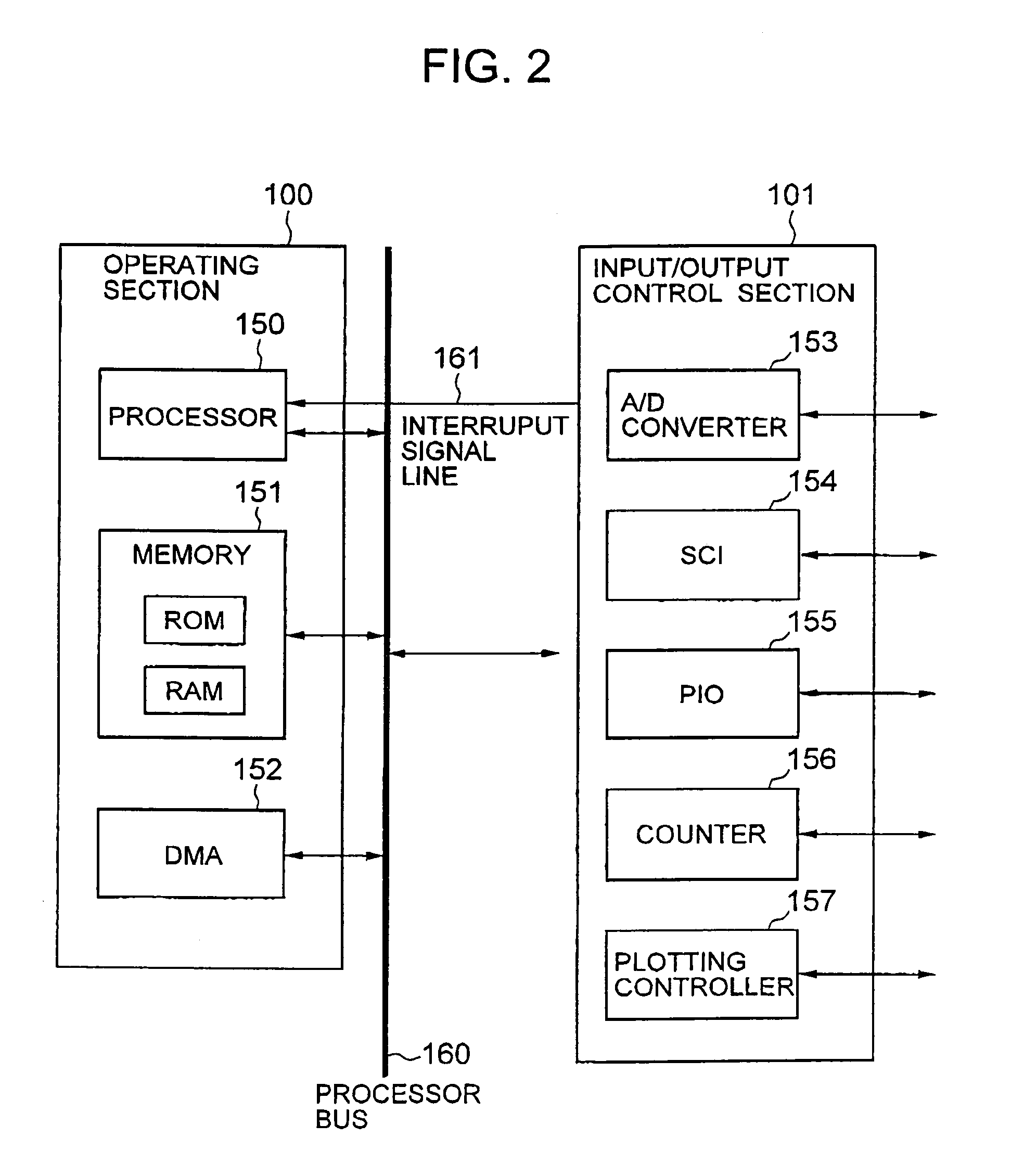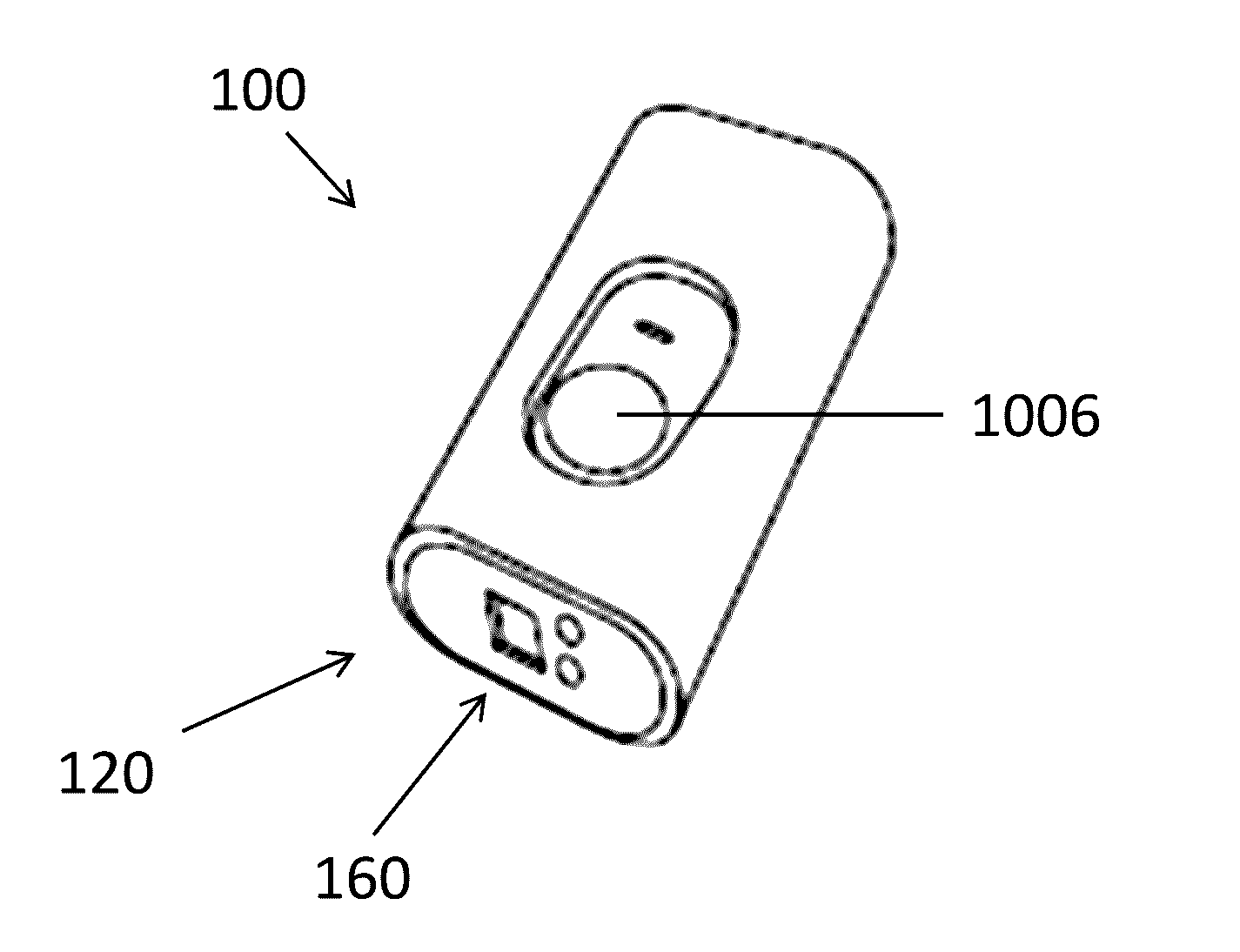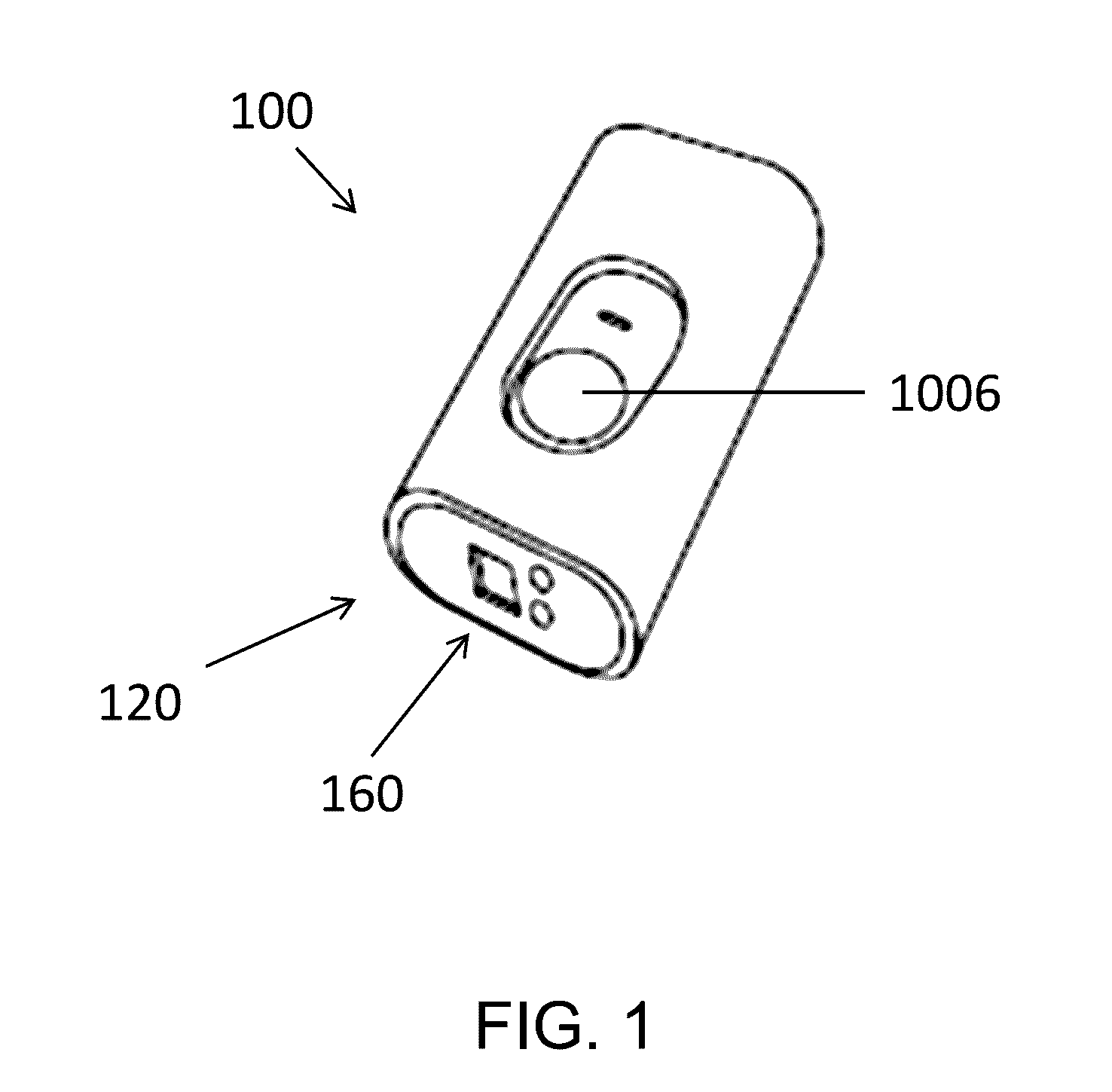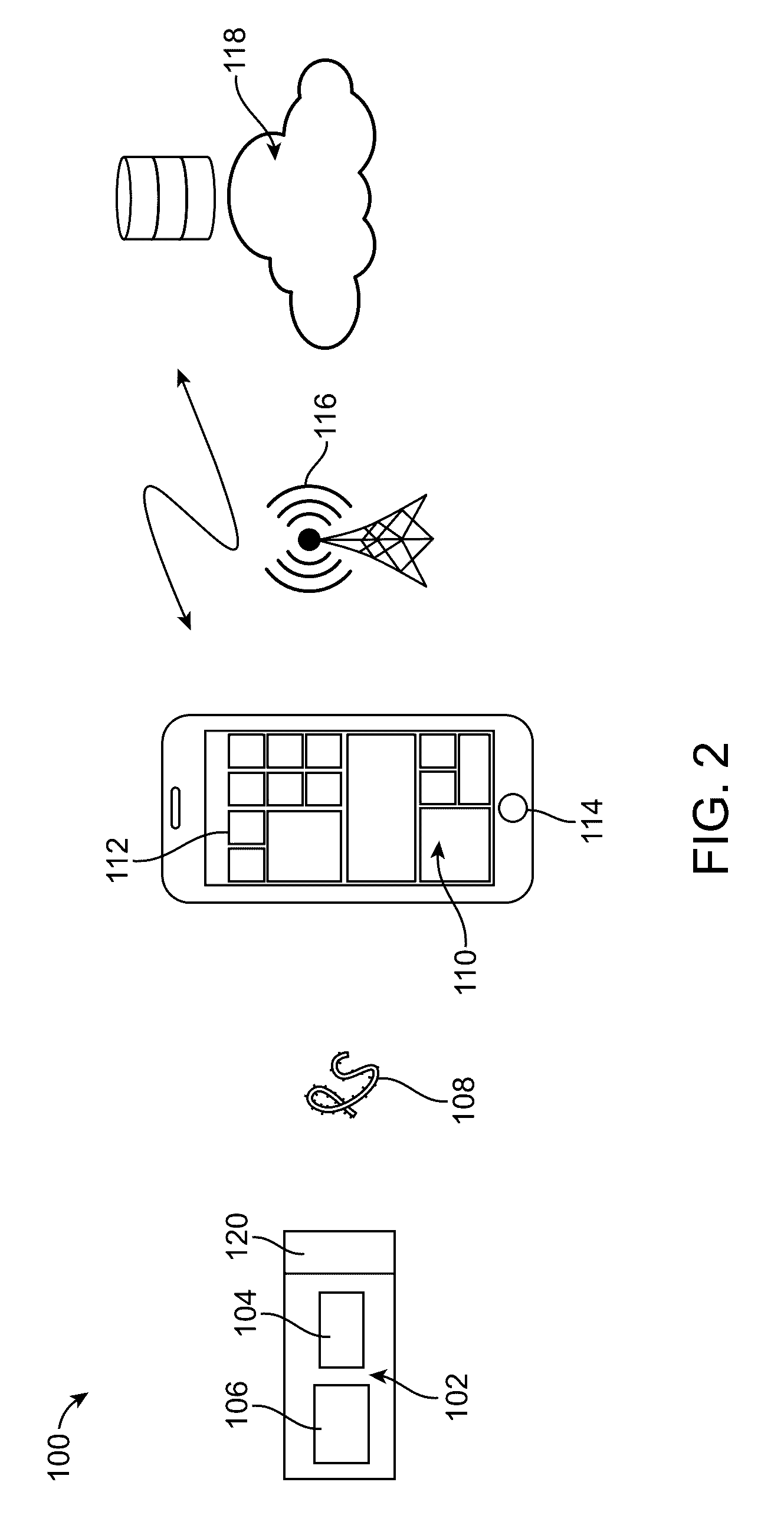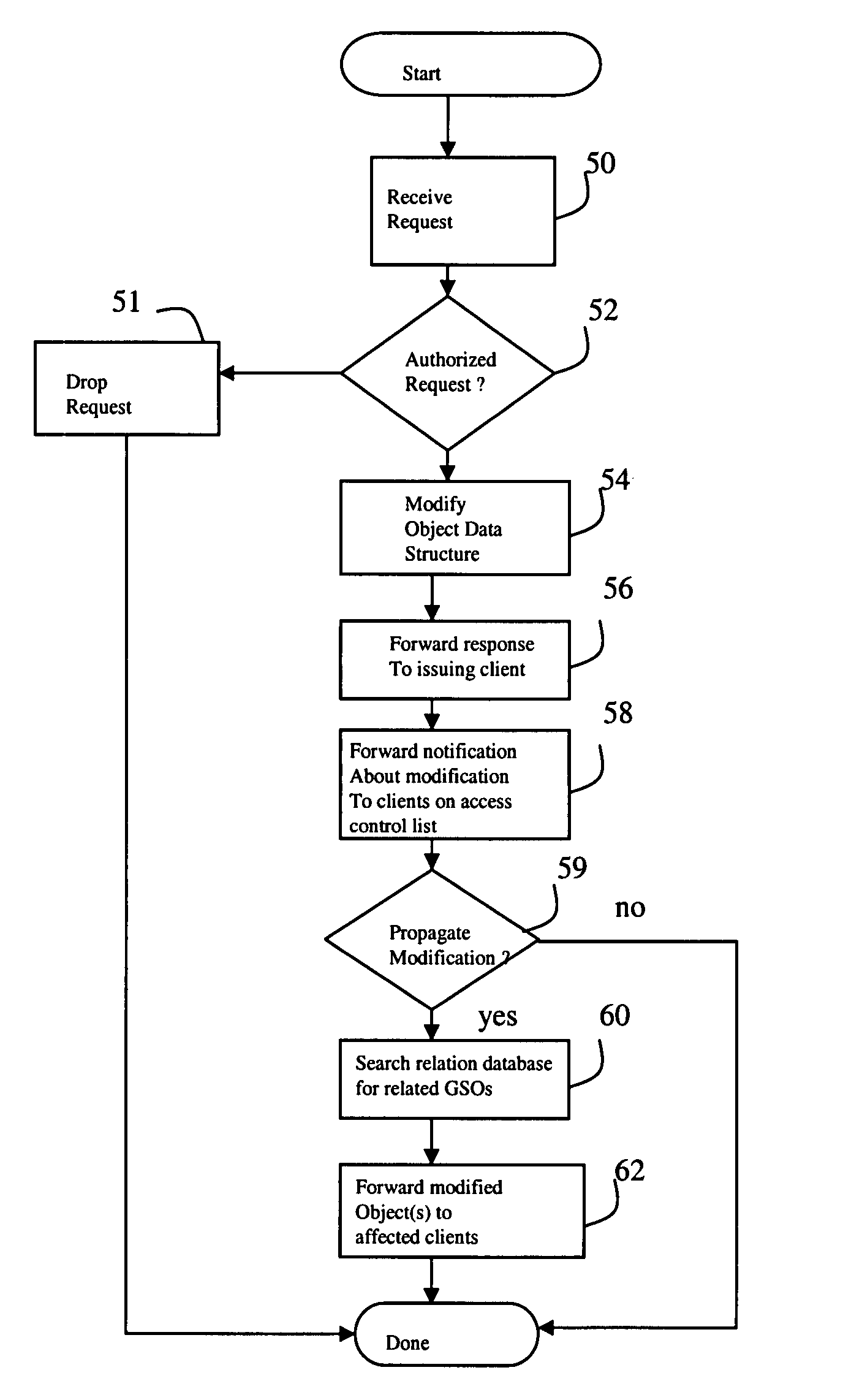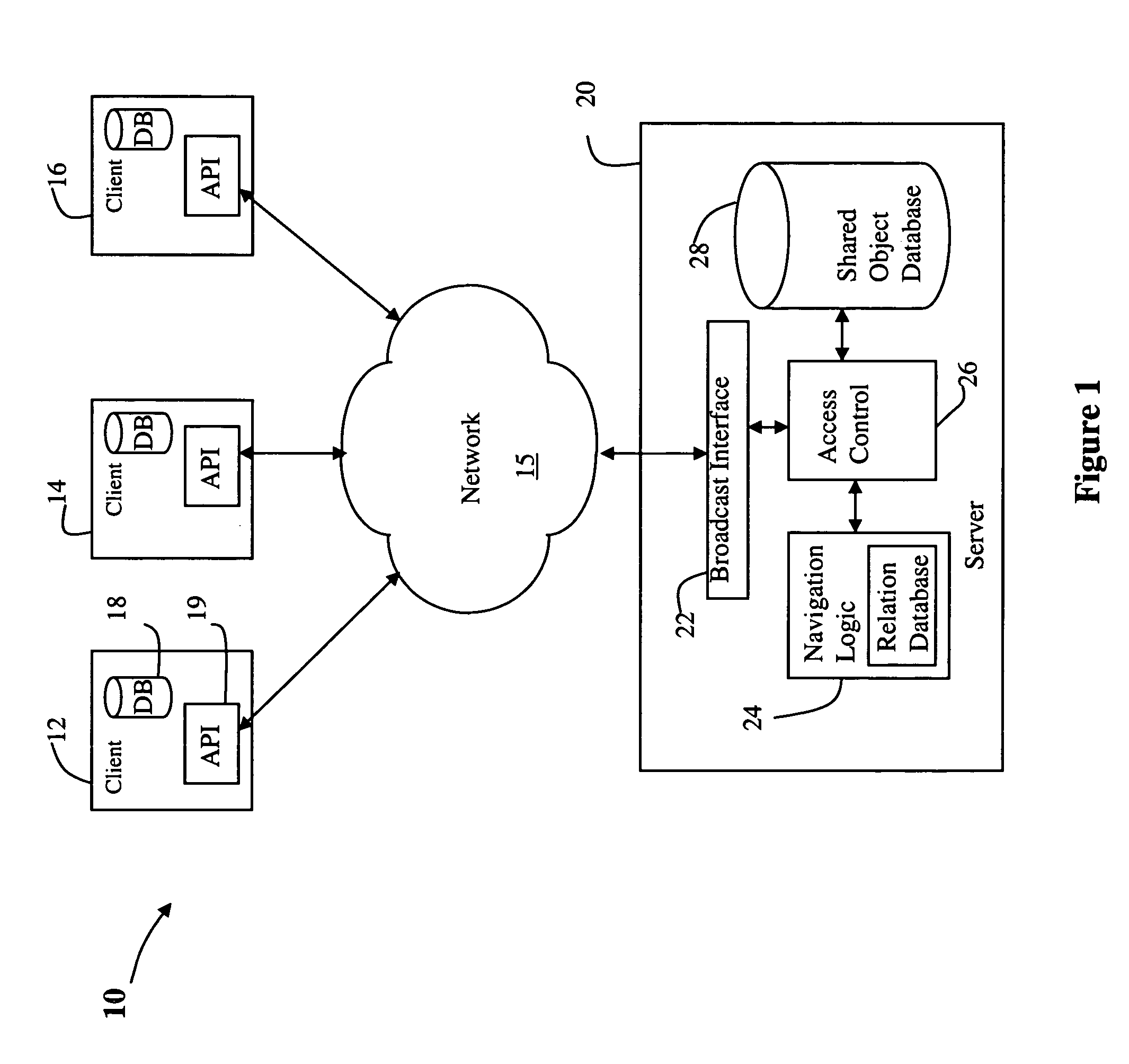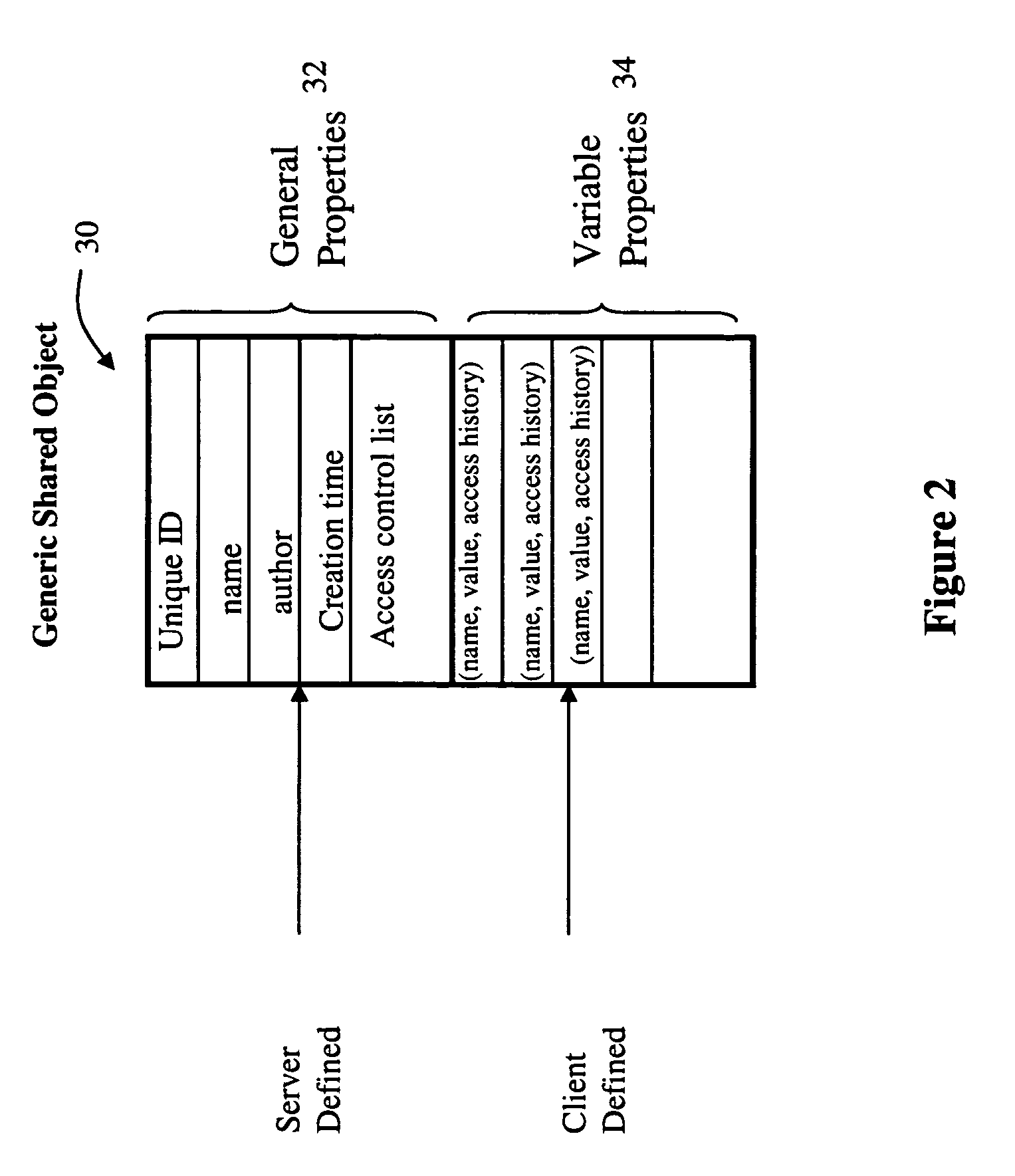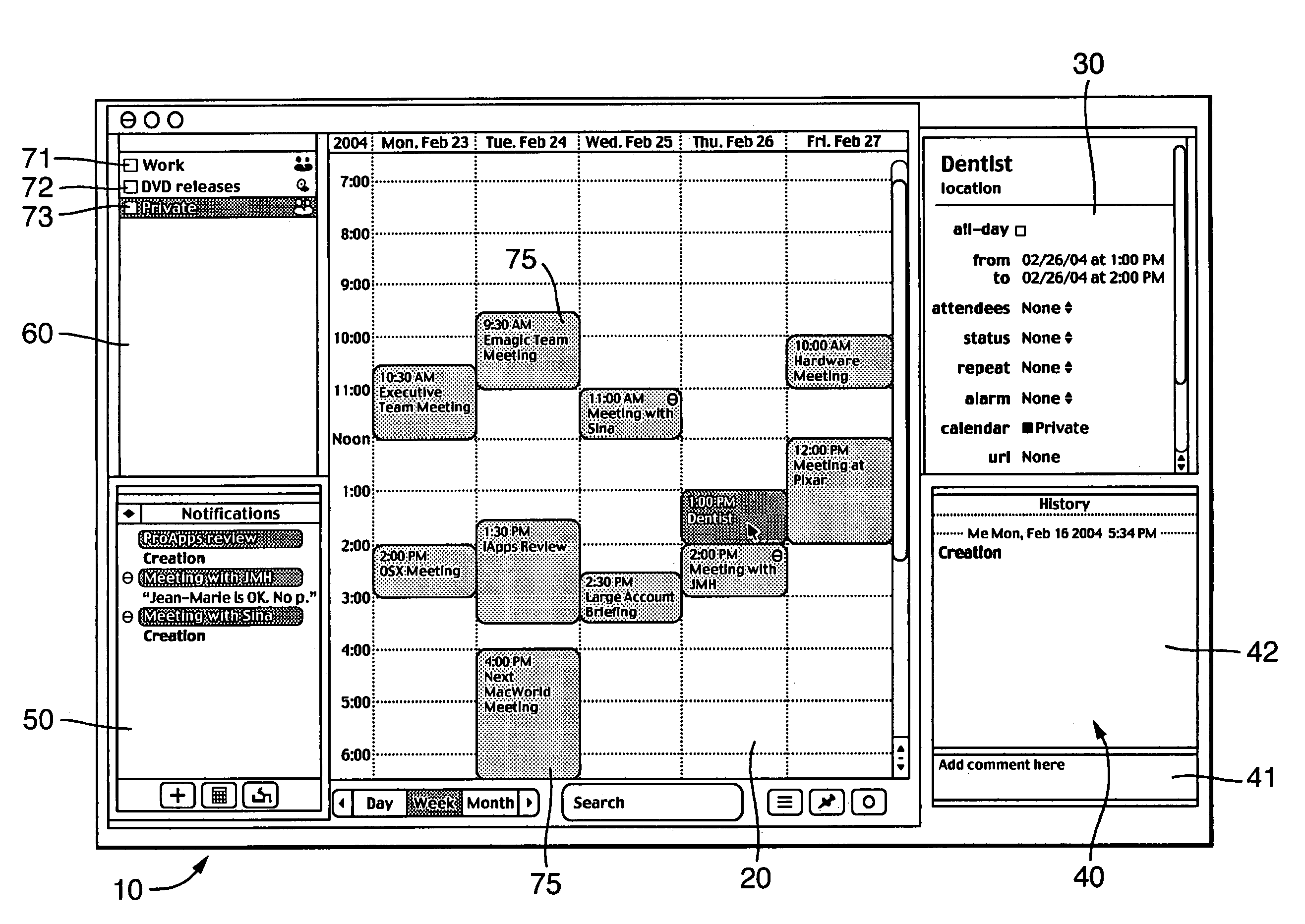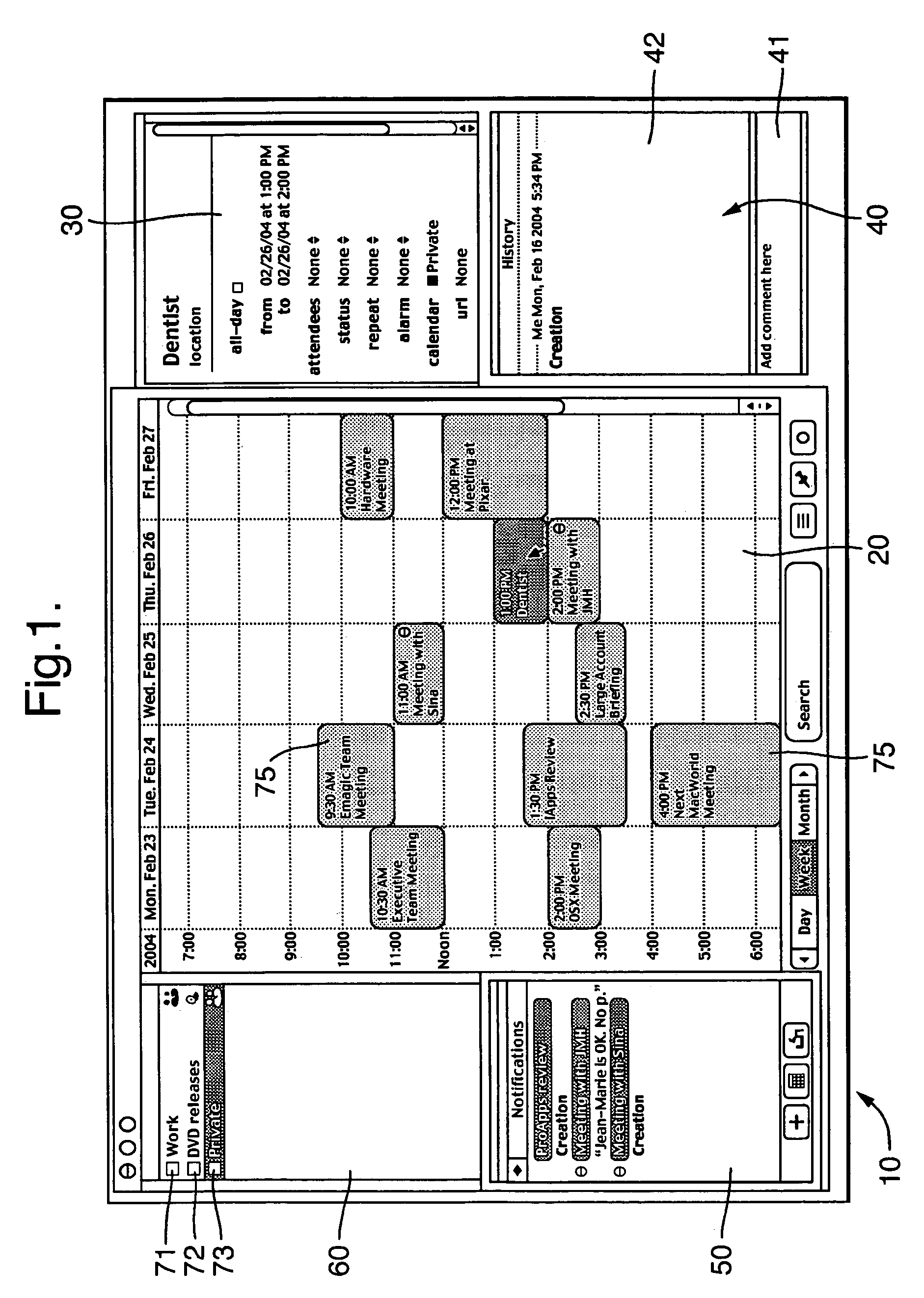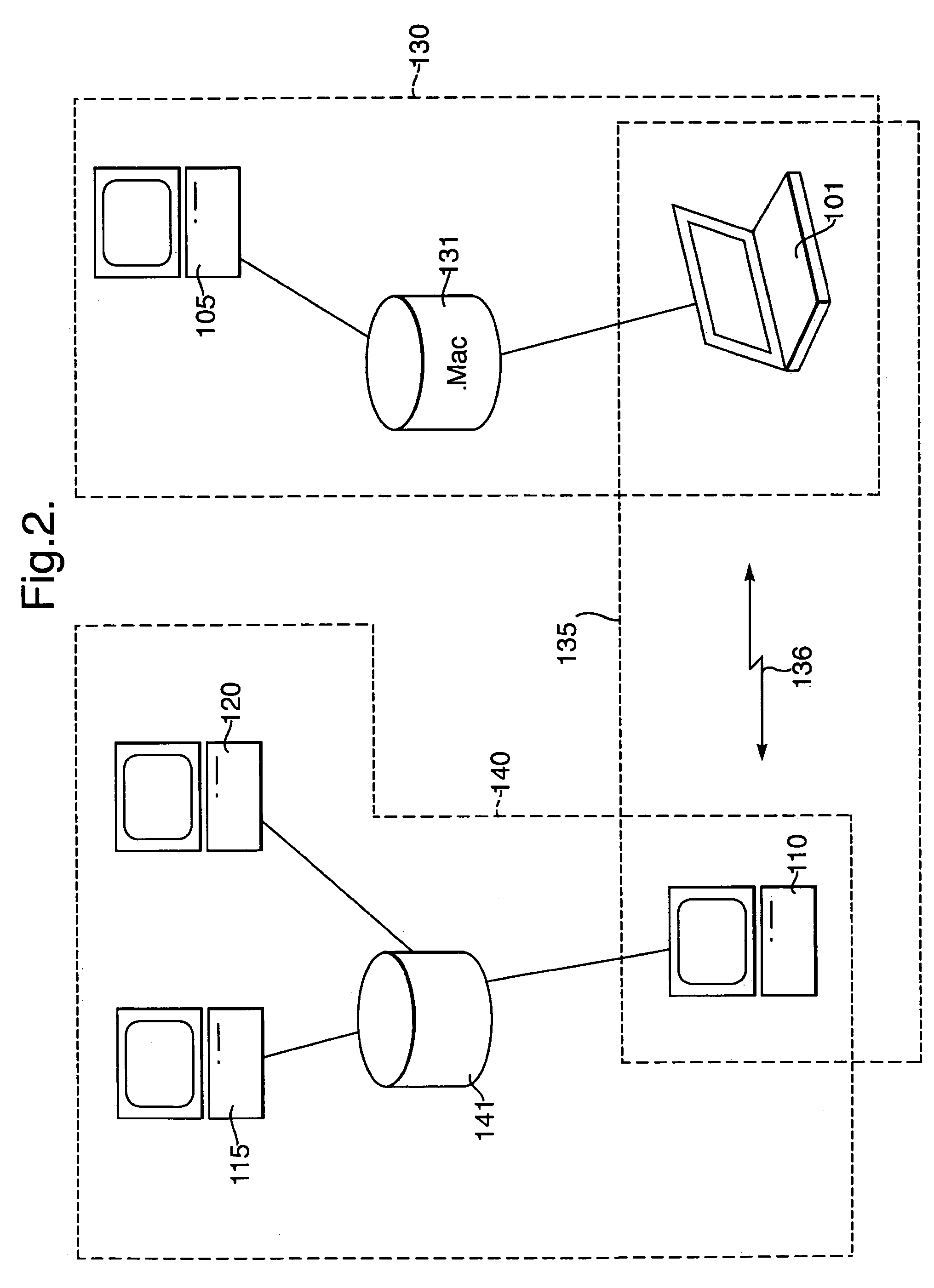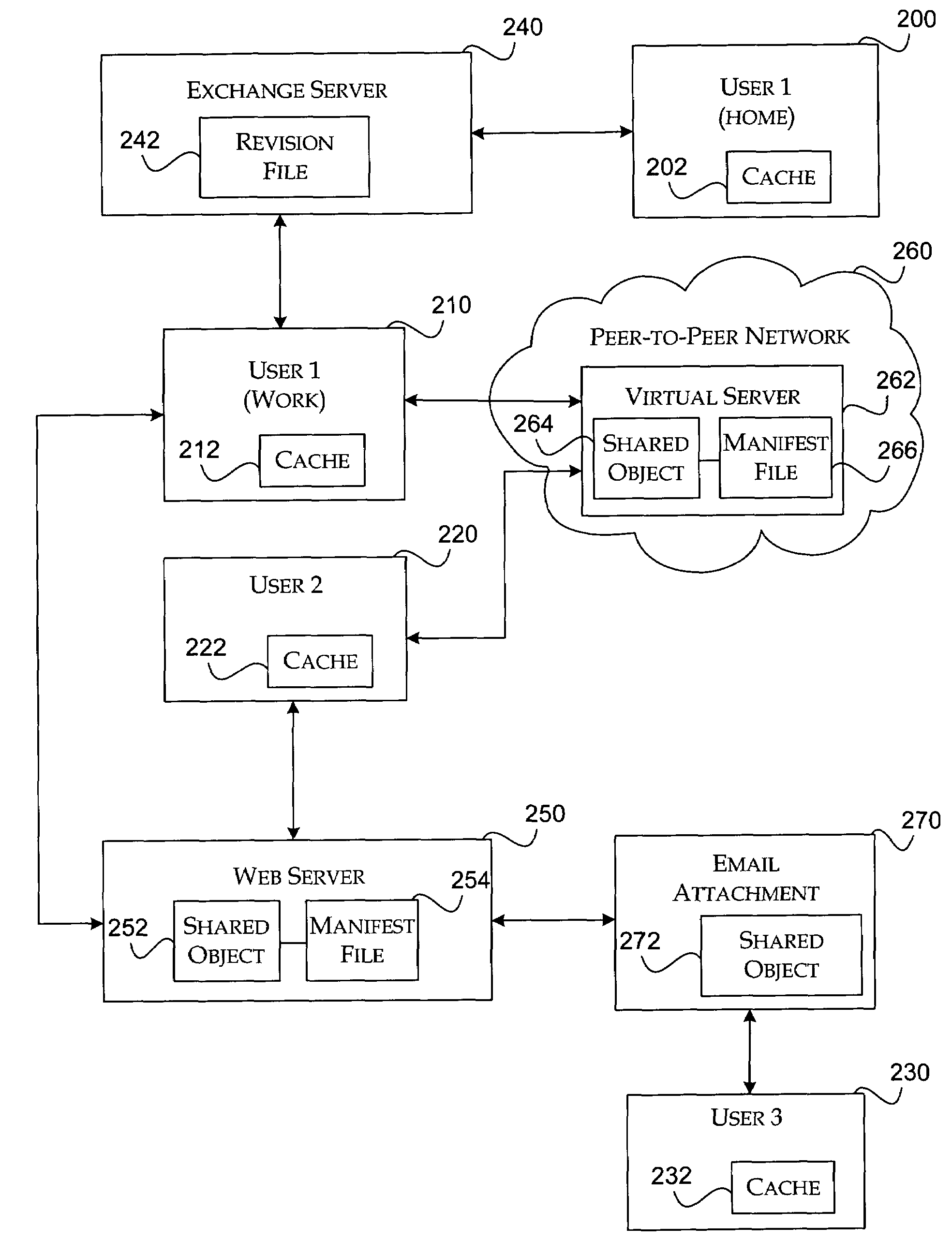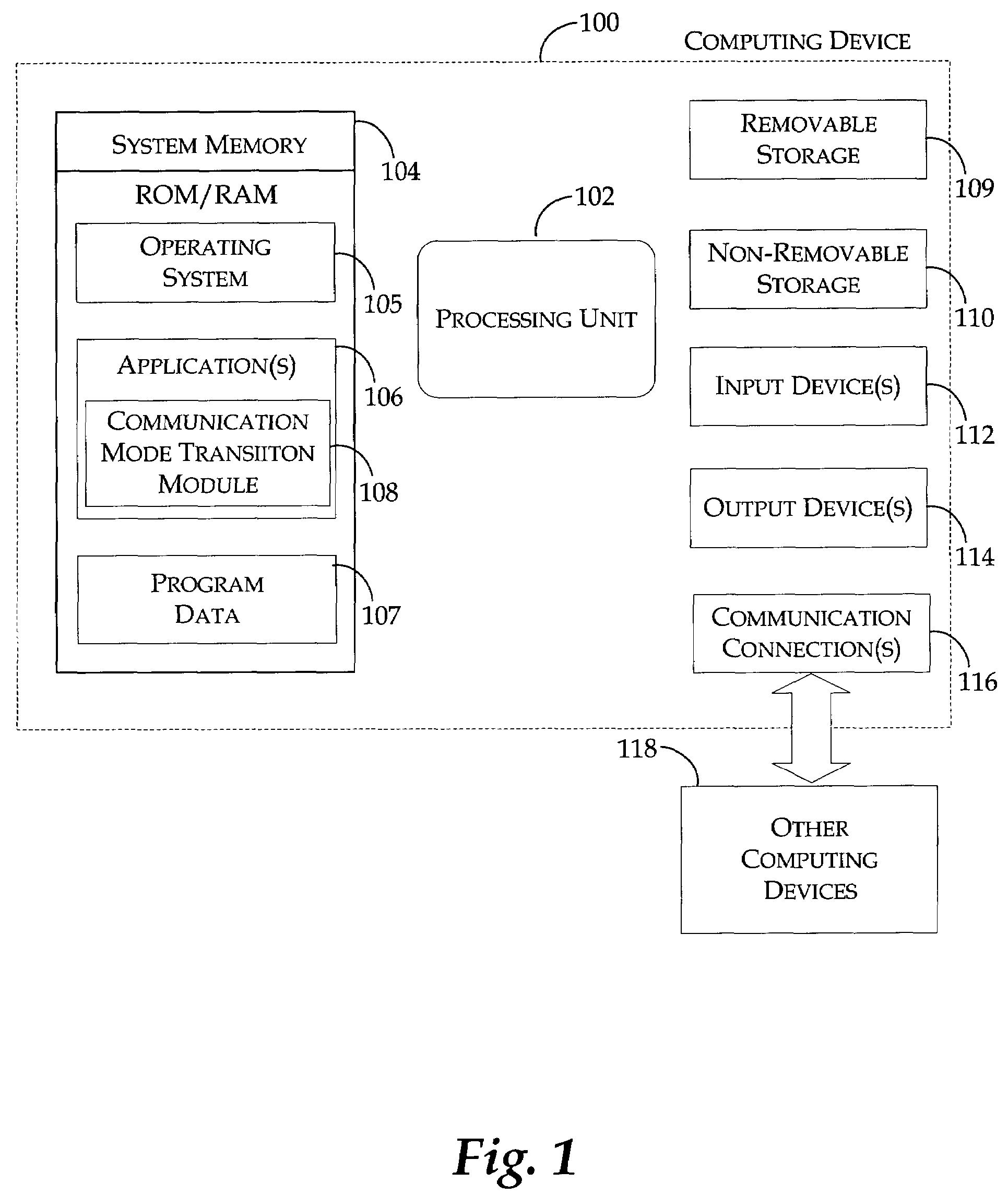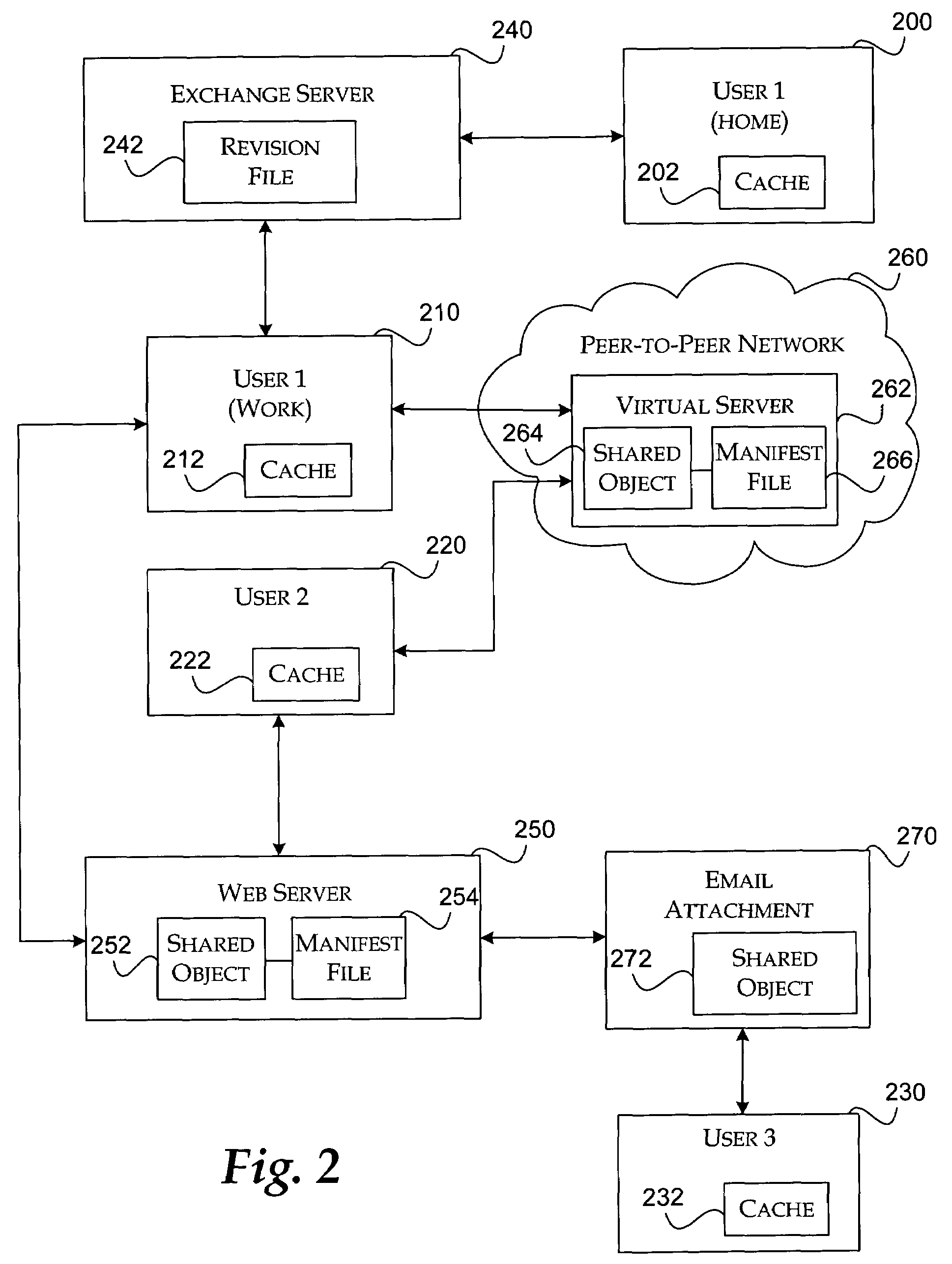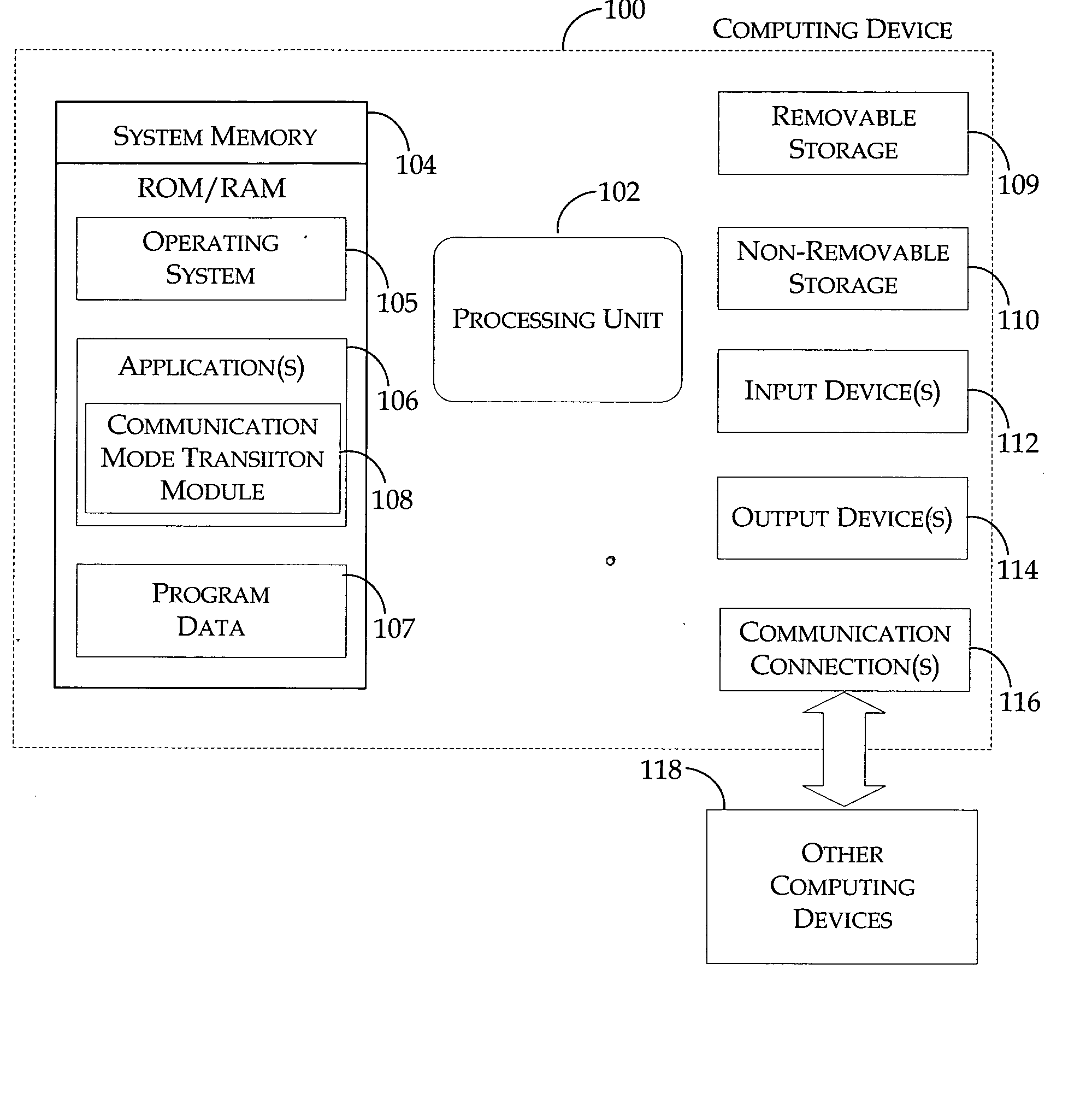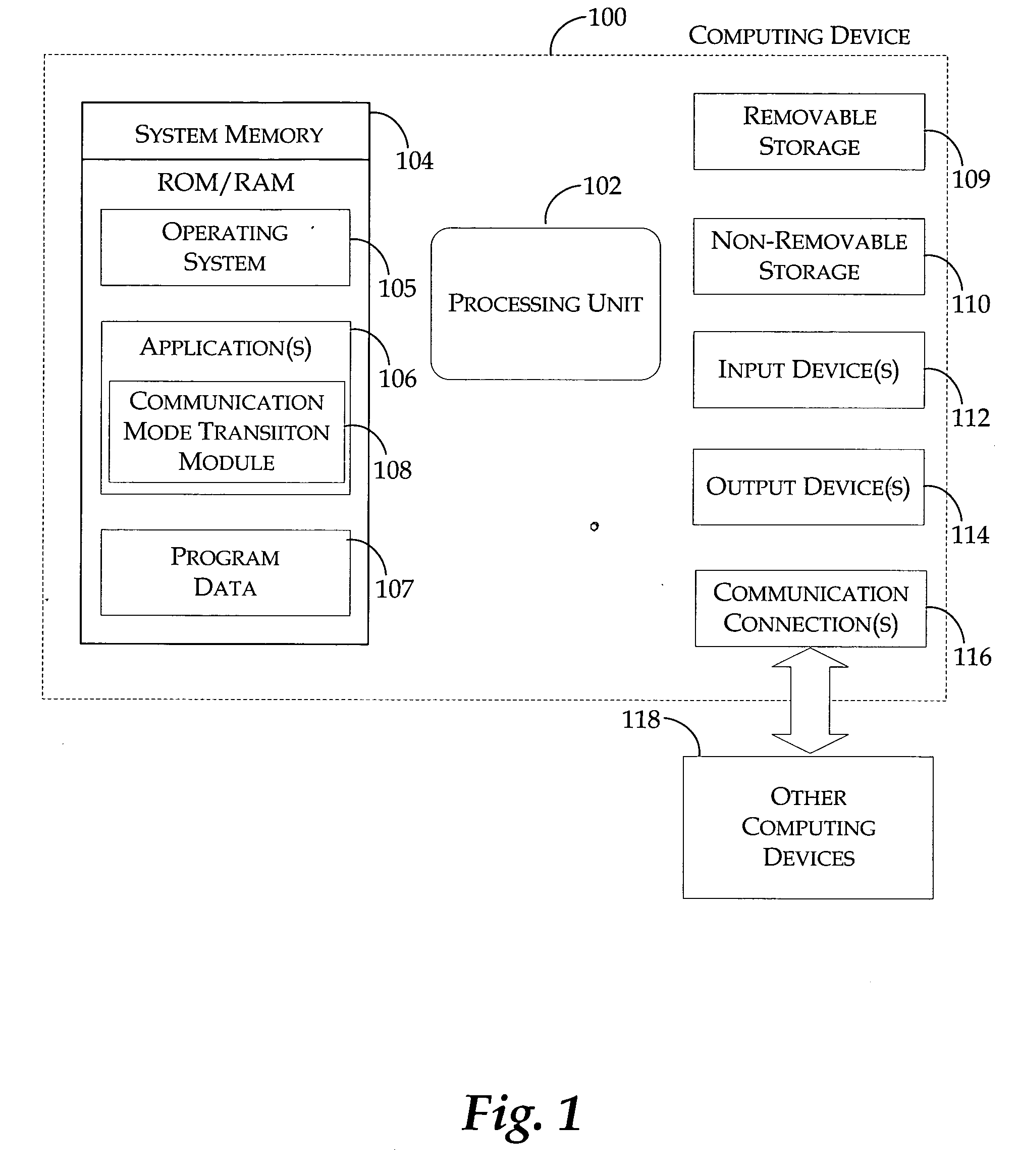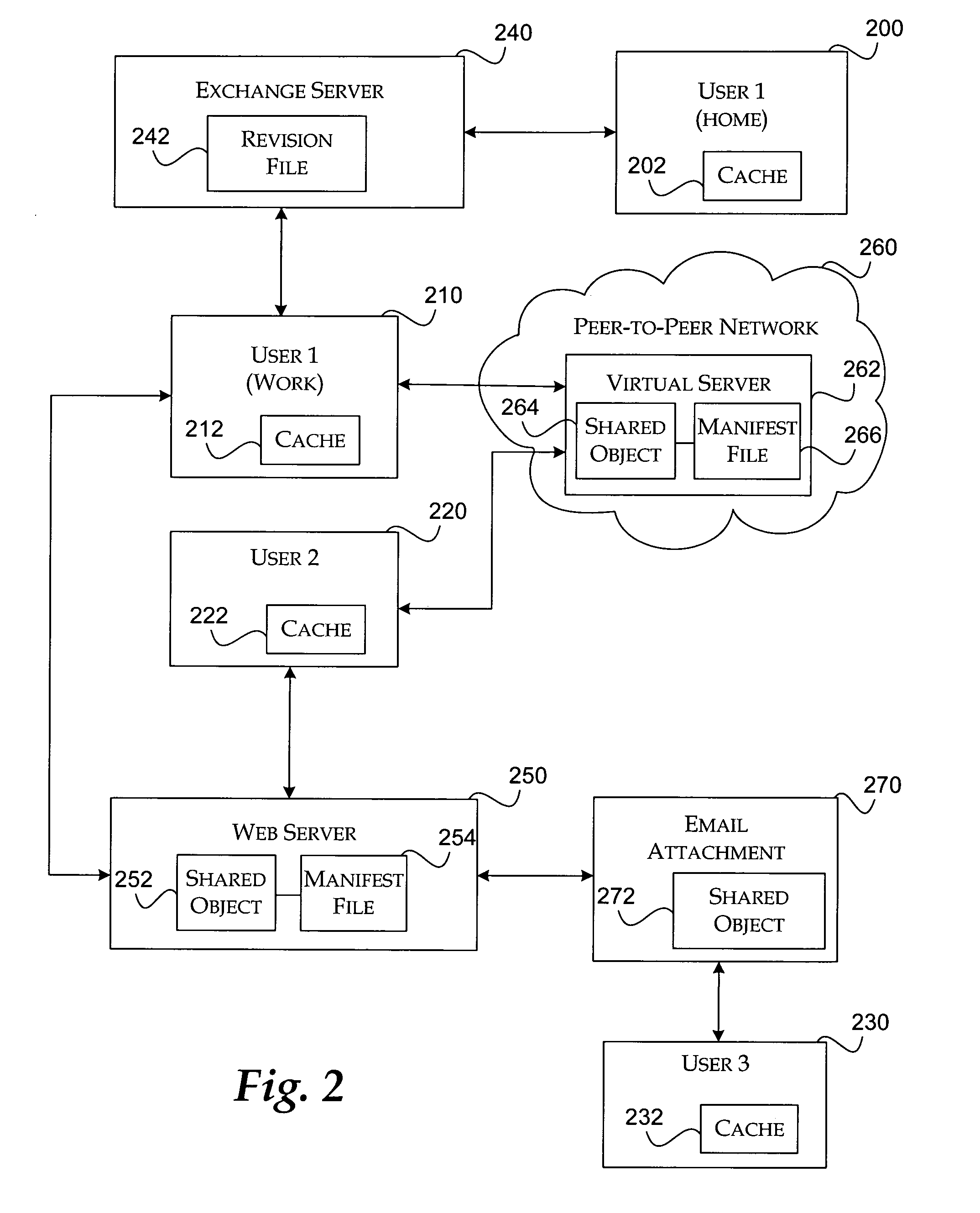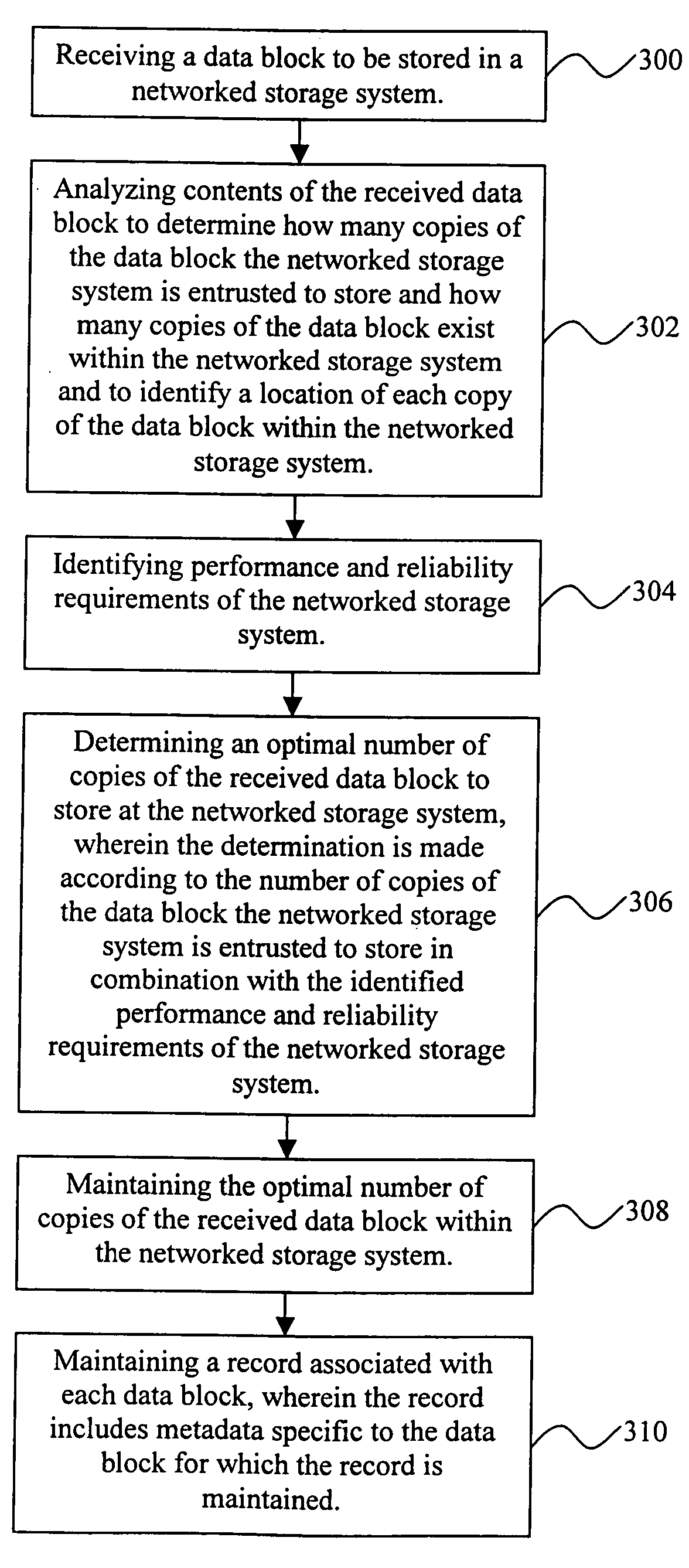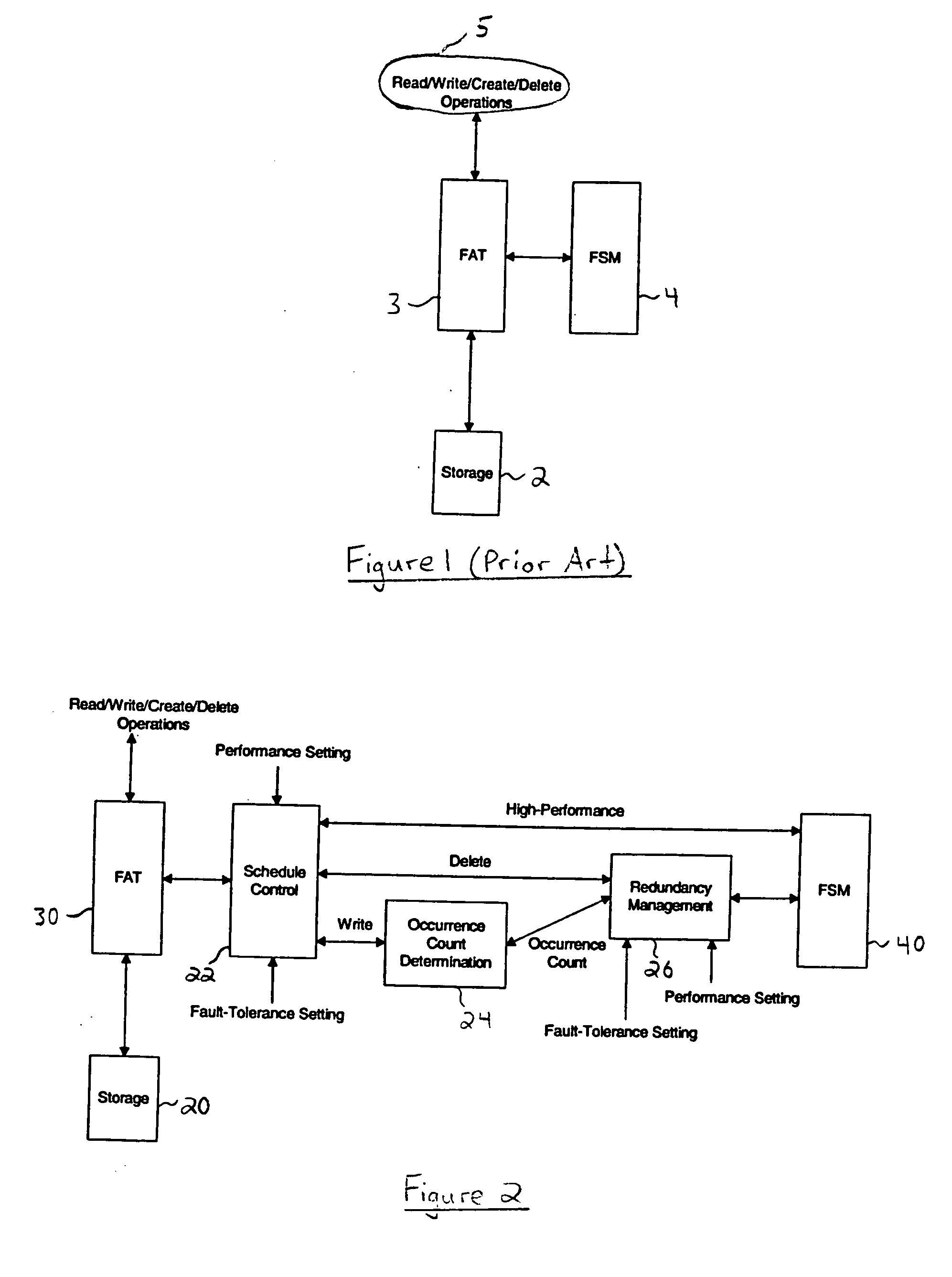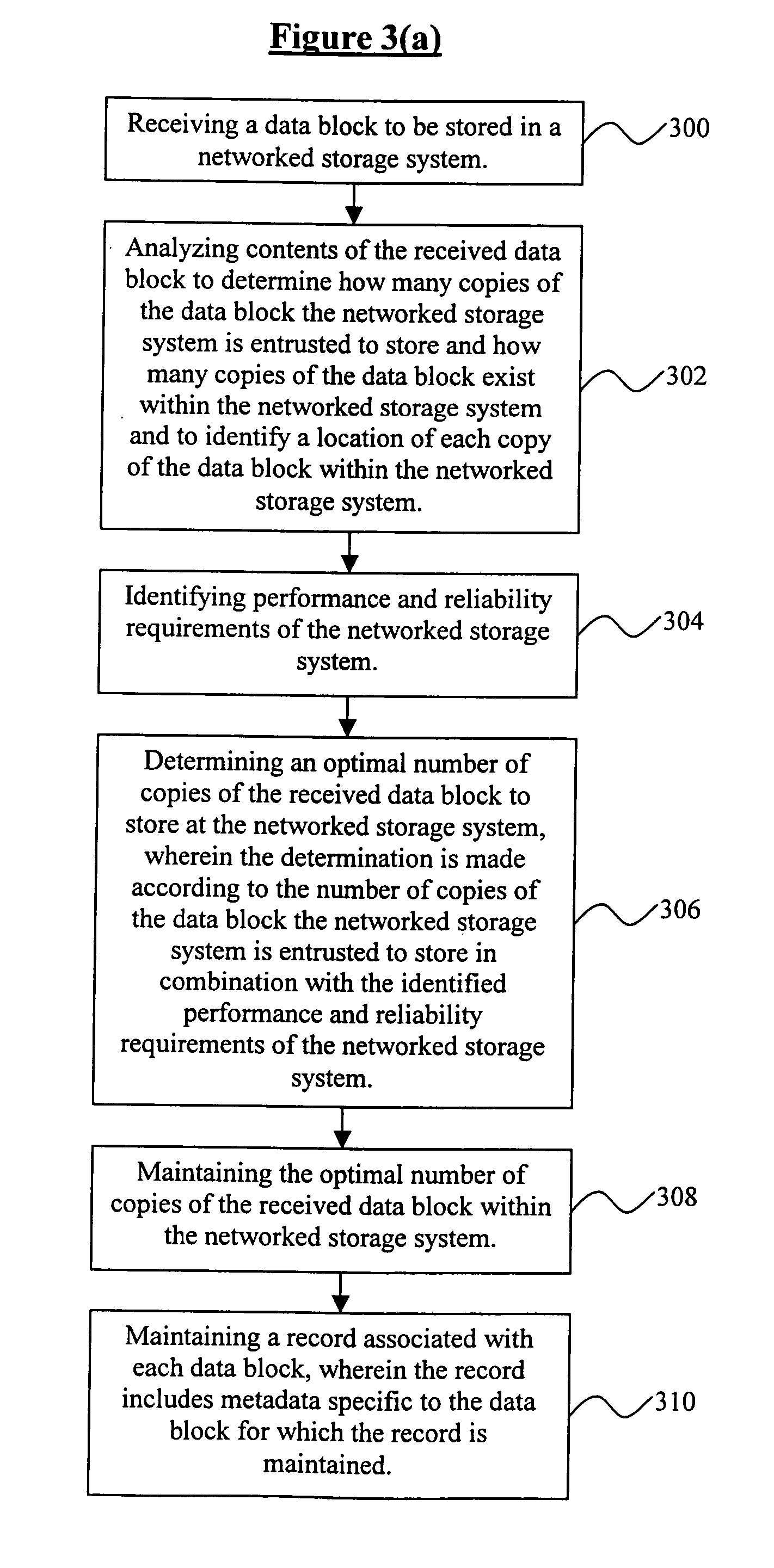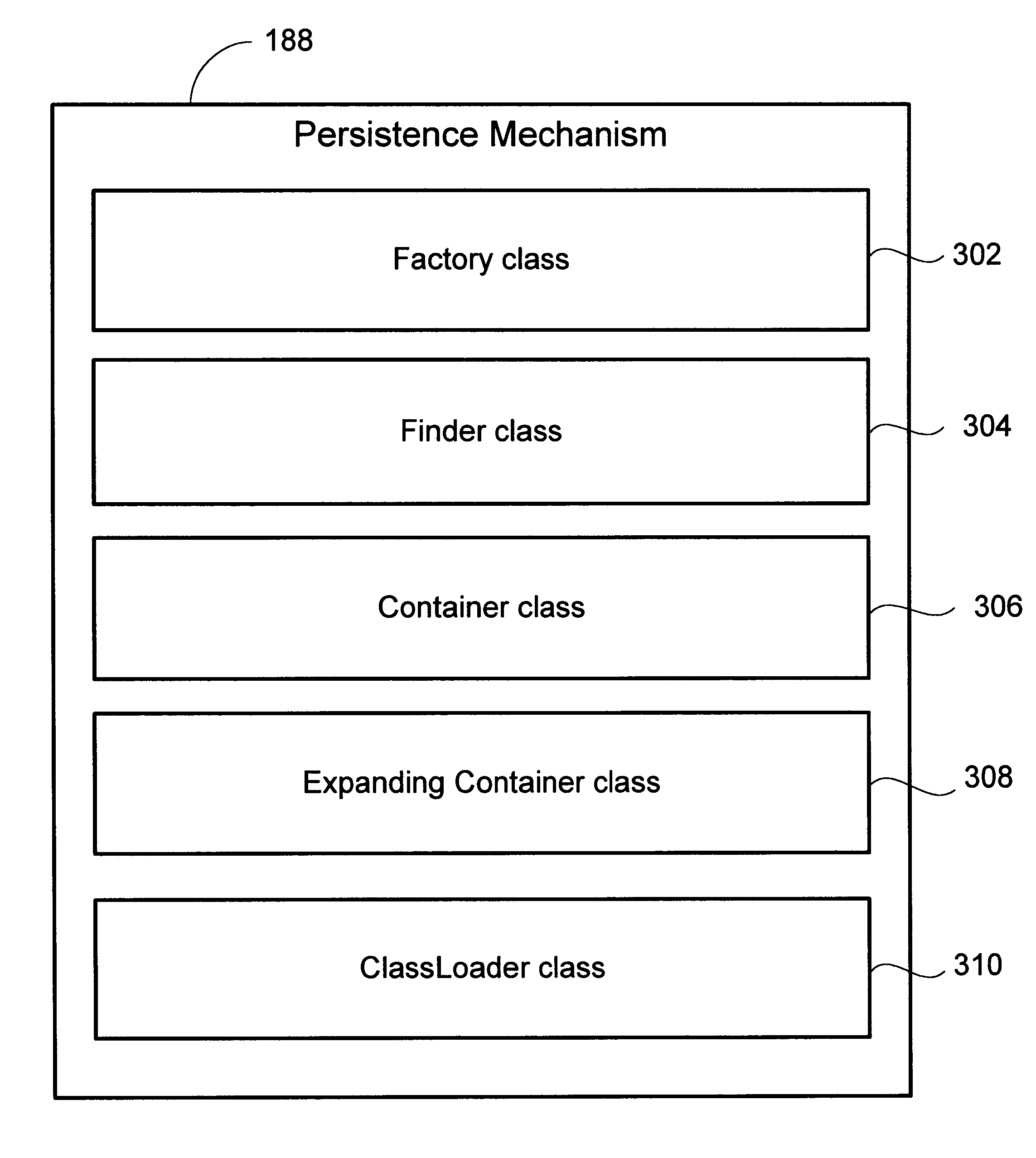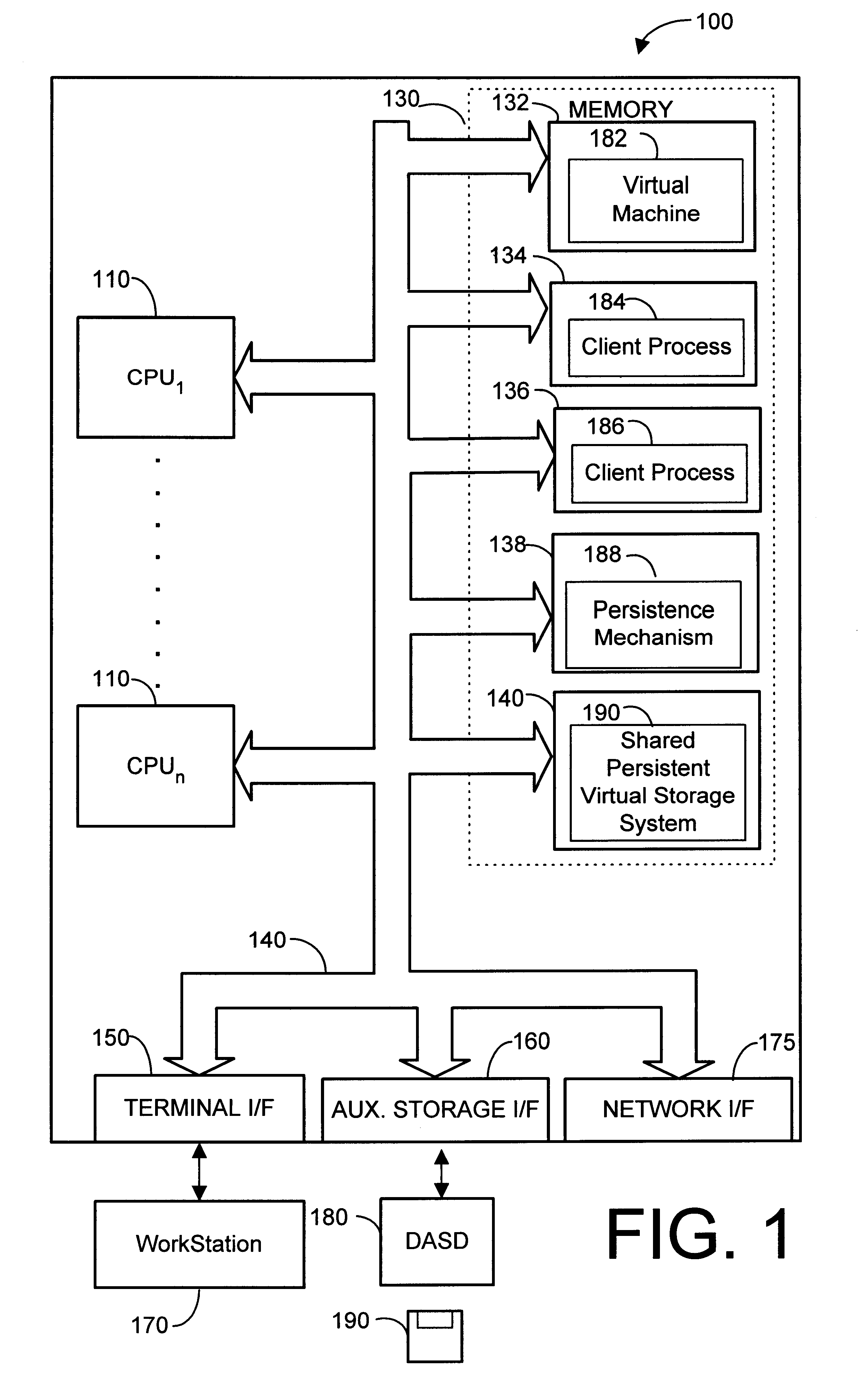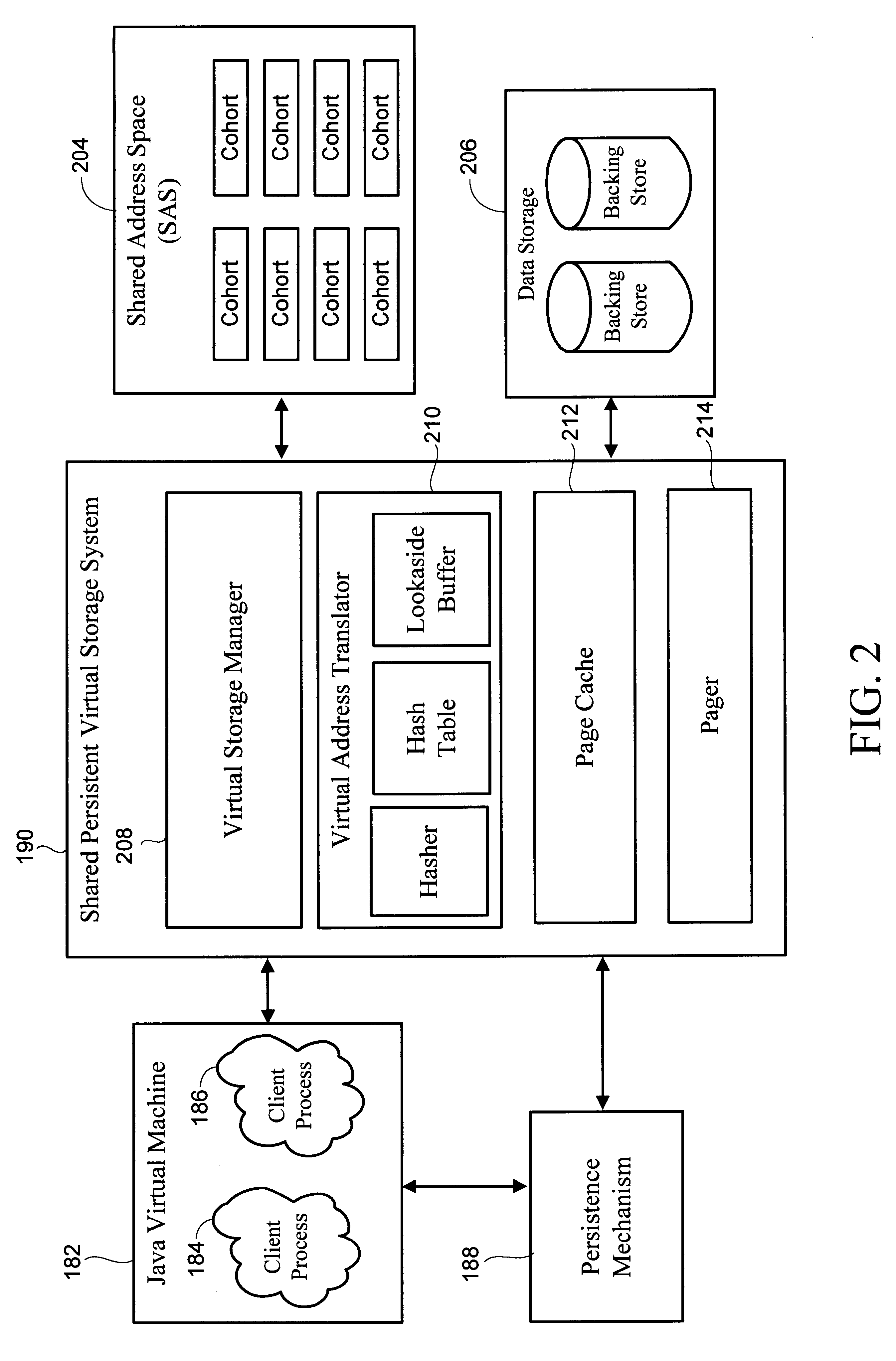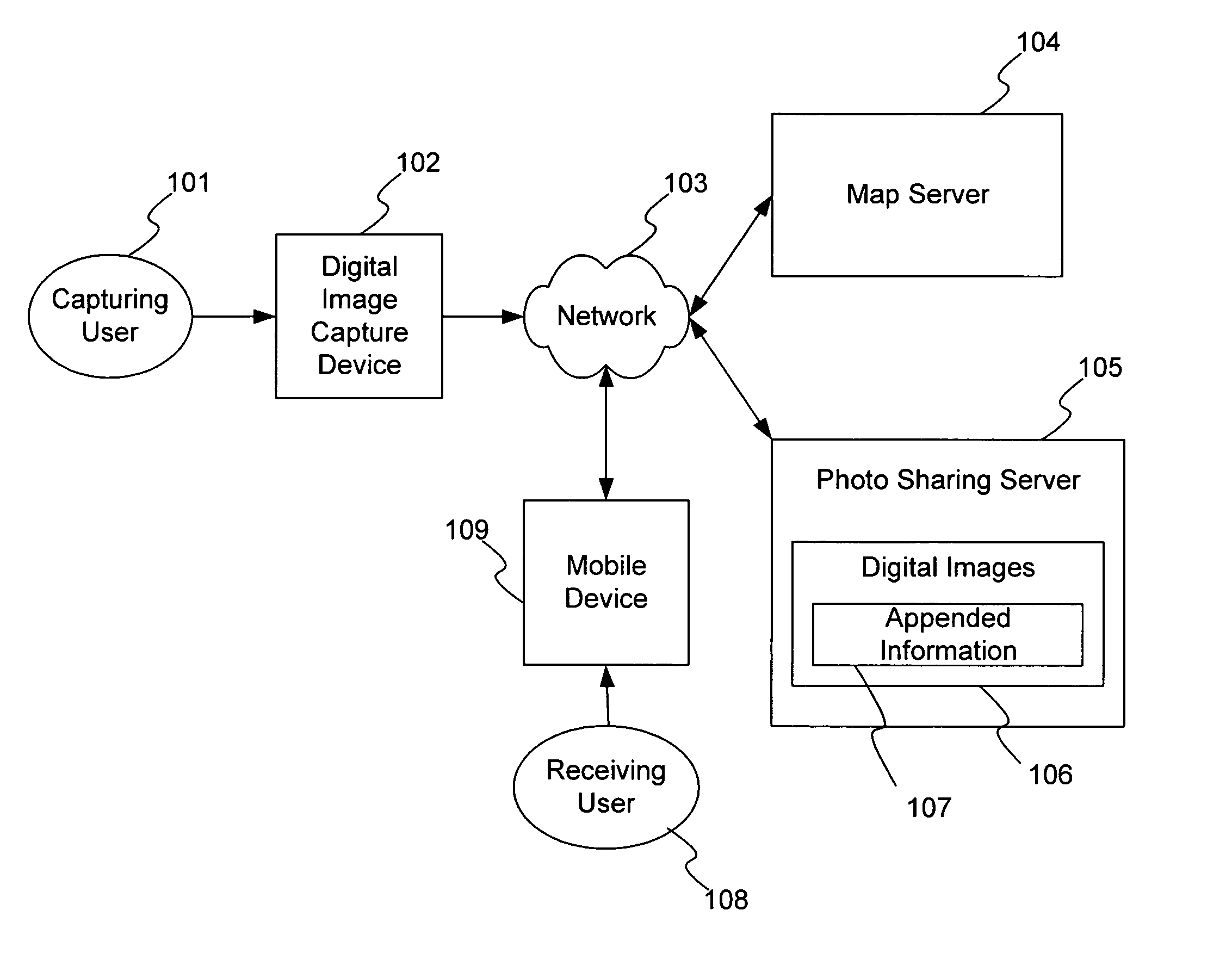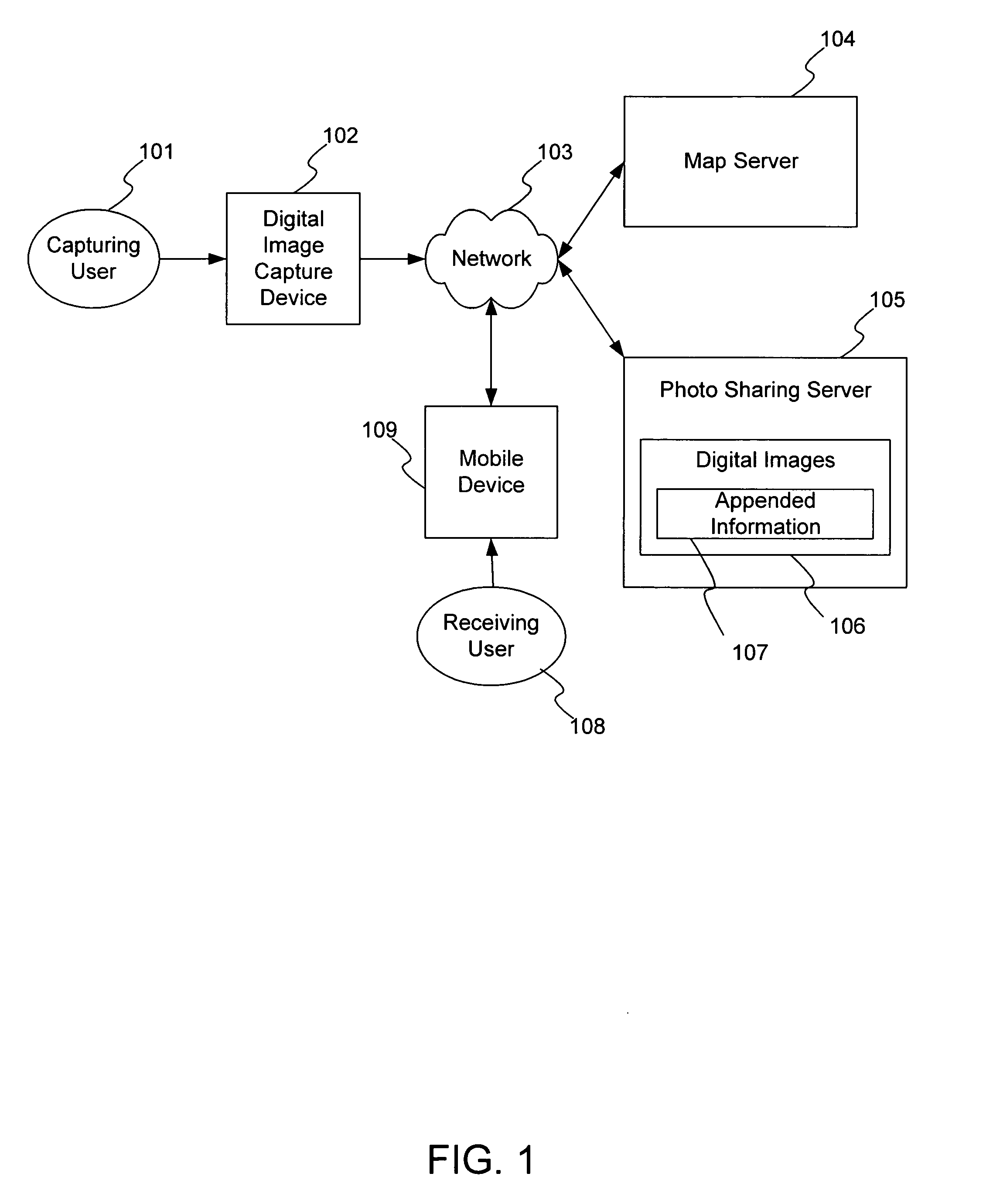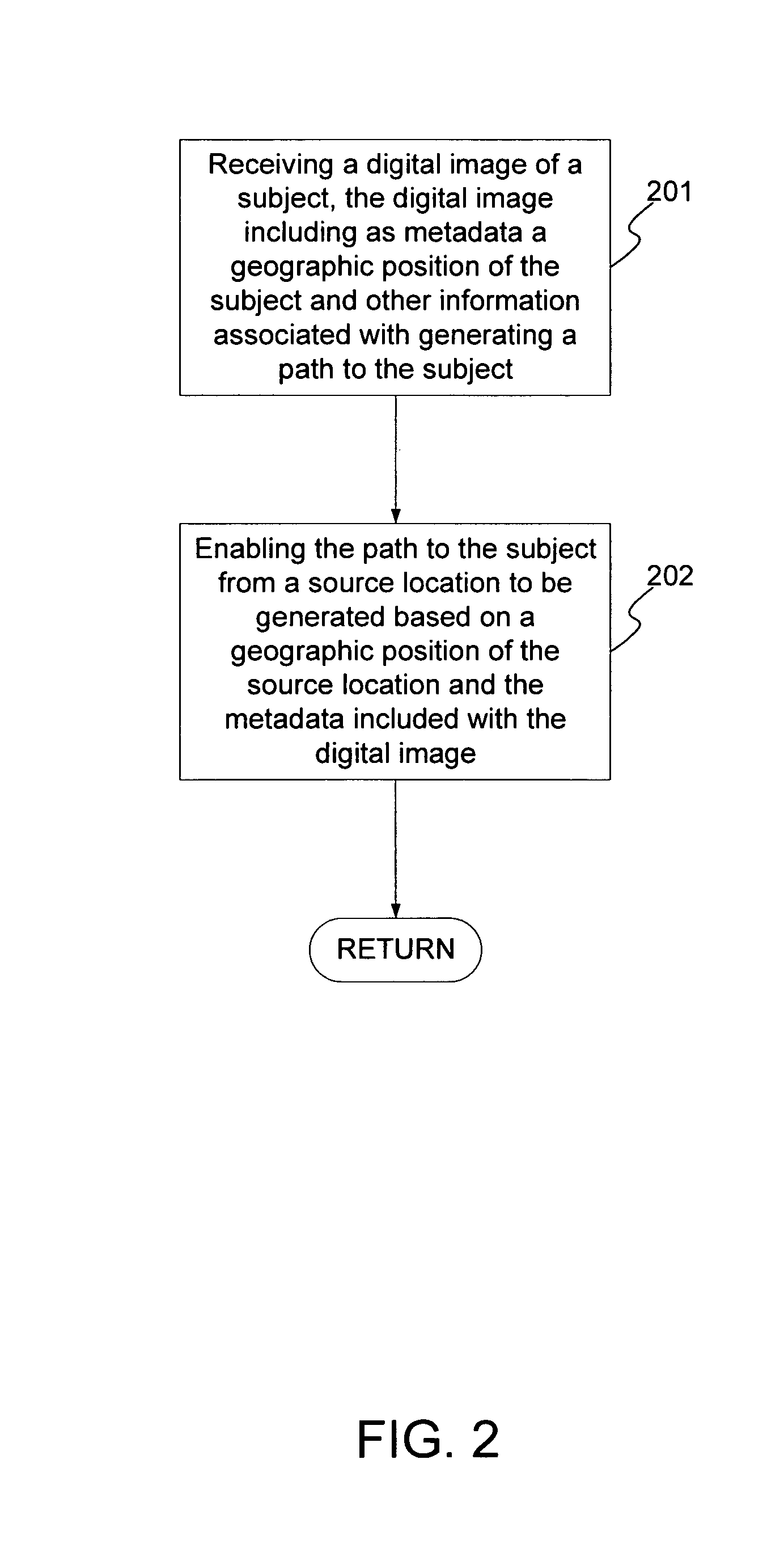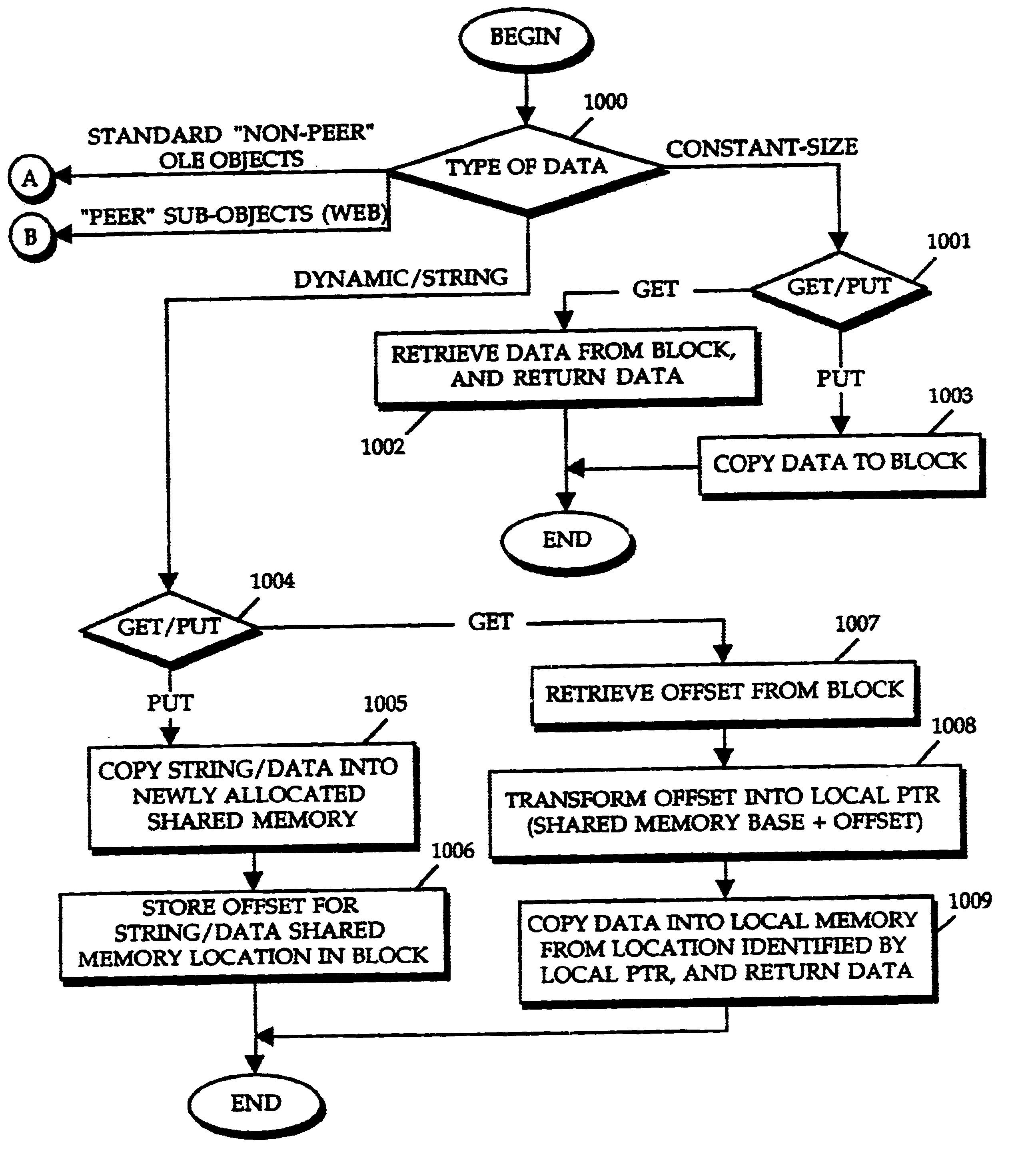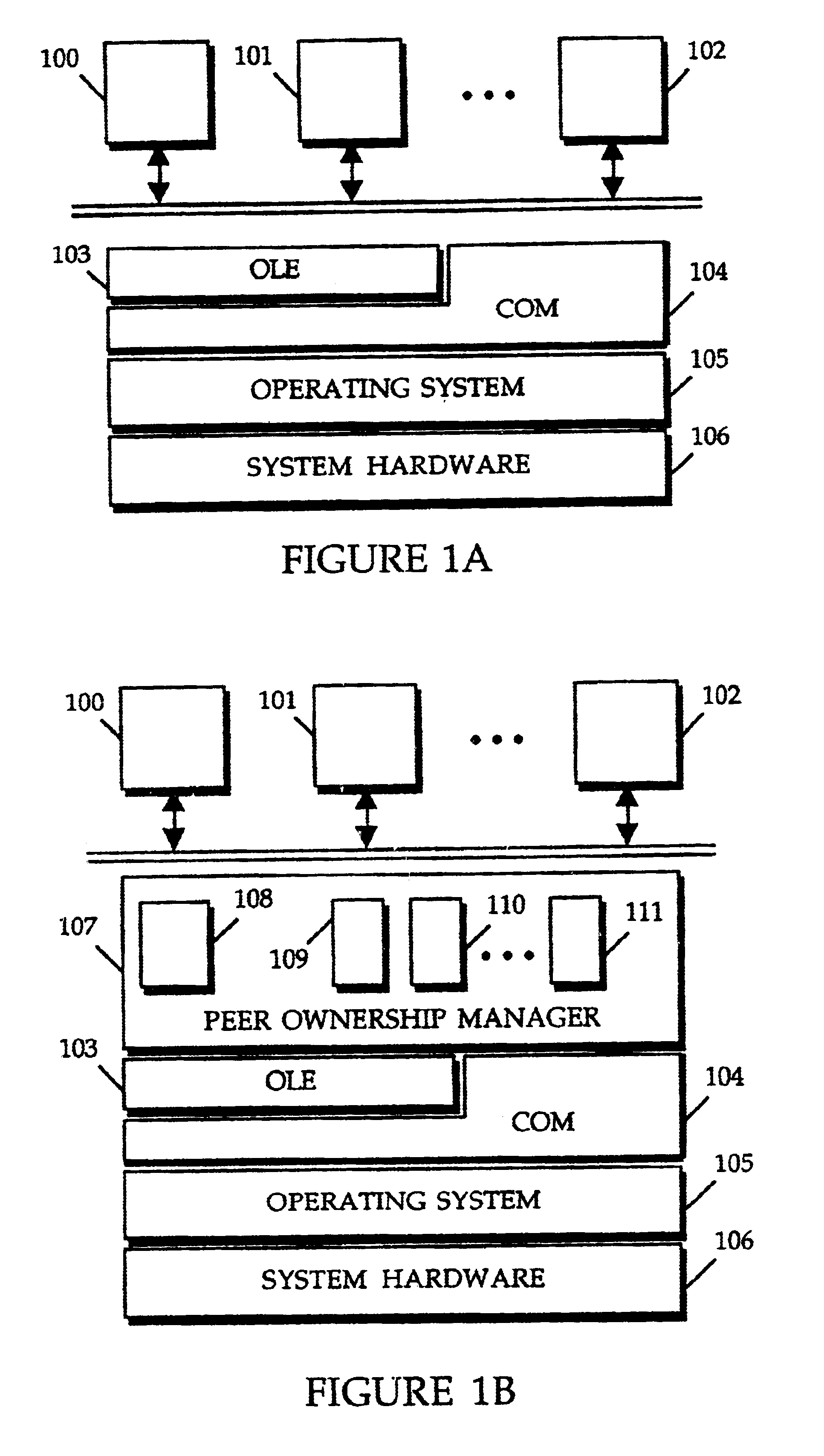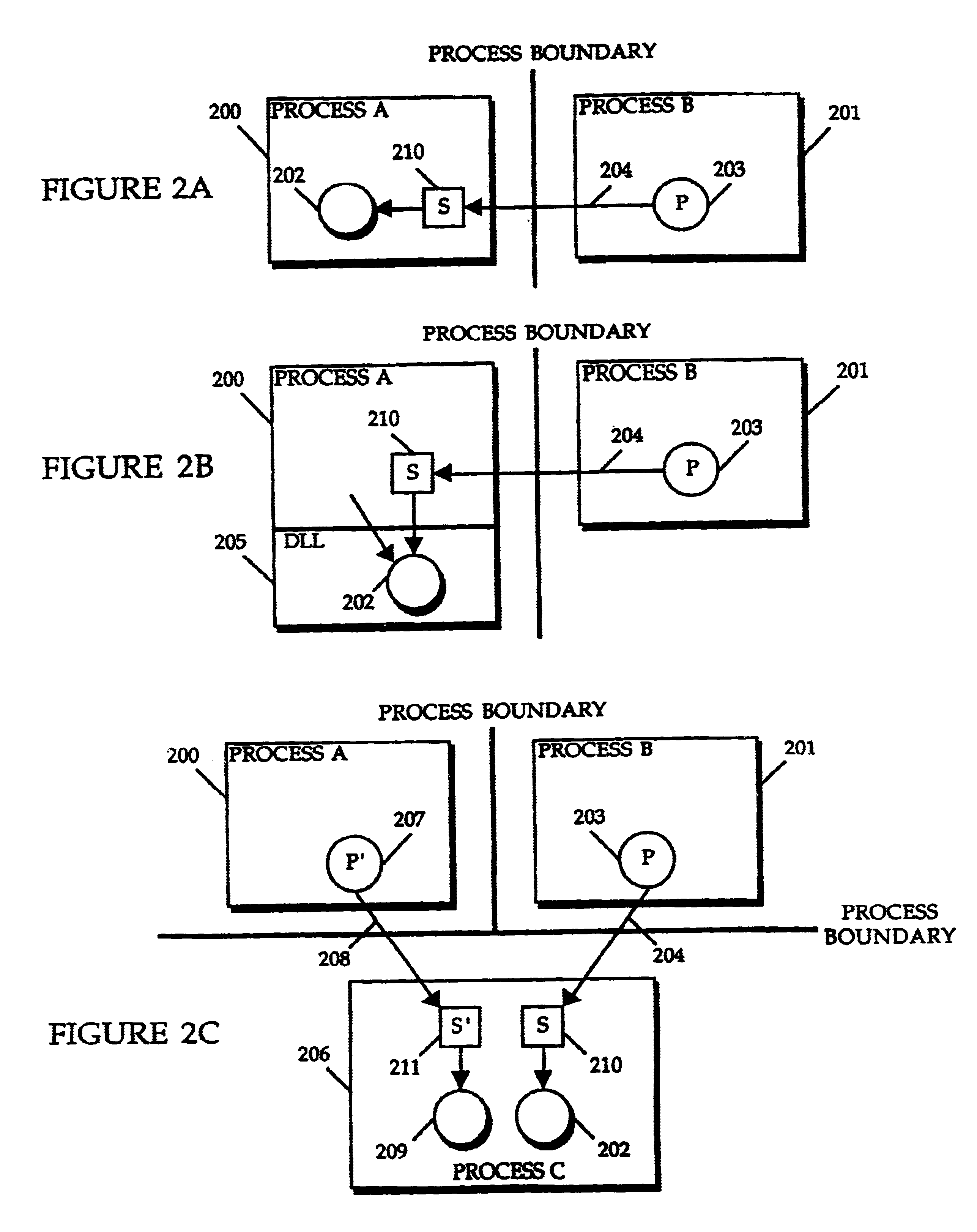Patents
Literature
324 results about "Shared object" patented technology
Efficacy Topic
Property
Owner
Technical Advancement
Application Domain
Technology Topic
Technology Field Word
Patent Country/Region
Patent Type
Patent Status
Application Year
Inventor
Methodology for enabling multi-party collaboration across a data network
InactiveUS20030097410A1Multiple digital computer combinationsSecuring communicationData collaborationThe Internet
A multi-party online collaboration system that optimizes both the participation of the collaborators and the universality of membership is described. The system satisfies the two requirements for networked collaboration by providing shareable objects and a means of notifying the collaborators whenever the state of the shared objects has changed. For an open network (i.e., the Internet), the preferred embodiment uses two open standards mechanisms: URL-addressable networks for the accessible shareable objects, and asynchronous messaging for notification of changes to the objects that do not occur in real-time. The preferred embodiment employs these two open standards systems to ensure universal access, and obviates the need for the collaborators to install / maintain proprietary client systems. The preferred embodiment monitors the state of the objects, and automatically dispatches notification messages, along with addresses (e.g., URLs) to those URL-addressable objects, to only those collaborators who responded to the previous notification. Because the system automatically handles the asynchronous messaging notifications and because these messages are dispatched only to those participants who are actively keeping current with the latest changes, the preferred embodiment precludes the generally chatty nature of asynchronous messaging systems. Whenever a collaborator does decide to use a notification link to visit the URL-addressable network site, he or she is further presented with a message describing an interface to all of the shared objects.
Owner:LIGHTSURF
Method and apparatus for secure authorization and identification using biometrics without privacy invasion
InactiveUS6957337B1Reliable identificationMinimal (or no) privacy invasionAcutation objectsUser identity/authority verificationBiometric dataInternet privacy
Owner:IBM CORP
Method and system for synchronizing multiple user revisions to a shared object
ActiveUS20060161516A1Transformation of program codeDigital data information retrievalClient-sideShared object
Many different users may access, revise and update the same shared object simultaneously through several different transports. Revisions to the shared object are automatically synchronized such that all users can view the revisions to the shared object. Conflicting revisions are reconciled and merged into a current version of the shared object. A client may request the current version of the shared object from a store when the current version of the shared object is not available from the store. The current version of the shared object is synchronized with the client when the store receives the current version of the share object.
Owner:MICROSOFT TECH LICENSING LLC
Stored value transaction system including an integrated database server
InactiveUS7216091B1Efficient sharingAvoiding duplicate recordFinanceMultiple digital computer combinationsDatabase serverIntegrated database
An integrated database and information server are provided that efficiently share information and tasks between various stored value programs. A server is configured to provide reusable objects and data structures that are suitably shared between various stored value products. A database at the server allows data to be shared between various programs so that each consumer associates with only one database record even though that consumer may use multiple shared value products. An exemplary common record for a consumer includes information relating to mailing addresses, preferred language, and the like. By integrating modules and avoiding duplicate records, the record communicates with all stored value programs, so the information does not need to be repeatedly entered into the database. Moreover, new stored value products are quickly and easily created through selection and arrangement of various shared objects preferably maintained within the database.
Owner:LIBERTY PEAK VENTURES LLC
Method and apparatus for persistent real-time collaboration
InactiveUS20050165859A1More complex collaborationEffective controlOffice automationMemory systemsApplication softwareClient-side
A collaboration server is described that enables both real-time conferencing and content management. Thus, client applications can connect to the server to share data and collaborate in real-time. The server allows fine grained sharing of any type of content using generic shared objects (GSO). Each GSO holds one or more pieces of persistent information and defines a list of people who are allowed to access the information. Each GSO also represents a persistent conferencing session., i.e., if clients modify GSOs, modifications are broadcast to all the other clients on the list of the shared object if they are connected. The server also manages relationships between shared objects; i.e., shared objects could be contained in other shared objects or reference other shared objects.
Owner:IBM CORP
Shared object memory with object management for multiple virtual machines
InactiveUS20050102670A1Save memoryEasy accessMultiprogramming arrangementsSoftware simulation/interpretation/emulationProcess memoryTerm memory
A shared object memory system that includes a shared object memory for storing encapsulated software objects that are directly accessible by plural object application processes. The shared object memory is distinct from the process memories of the object application processes and does not include an execution model. A shared object memory manager provides management of objects within the shared object memory.
Owner:GEMSTONE SYST
Real time video game uses emulation of streaming over the internet in a broadcast event
InactiveUS20030037156A1Easy programmingLow bandwidthSpecial service provision for substationPulse modulation television signal transmissionGraphicsAnimation
In a broadcast application on a client-server network the streaming is emulated of animation data over the Internet to a large number of clients. The animation is considered a sequence of states. State information is sent to the clients instead of the graphics data itself. The clients generate the animation data itself under control of the state information. The server and clients communicate using a shared object protocol. Thus, streaming is accomplished as well as a broadcast without running into severe network bandwidth problems. This approach is used to map a real life event, e.g., a motor race, onto a virtual environment in order to let the user participate in a virtual race against the real life professionals, the dynamics of the virtual environment being determined by the state changes sent to the user.
Owner:QUALCOMM INC
Lock-free implementation of concurrent shared object with dynamic node allocation and distinguishing pointer value
A novel linked-list-based concurrent shared object implementation has been developed that provides non-blocking and linearizable access to the concurrent shared object. In an application of the underlying techniques to a deque, non-blocking completion of access operations is achieved without restricting concurrency in accessing the deque's two ends. In various realizations in accordance with the present invention, the set of values that may be pushed onto a shared object is not constrained by use of distinguishing values. In addition, an explicit reclamation embodiment facilitates use in environments or applications where automatic reclamation of storage is unavailable or impractical.
Owner:ORACLE INT CORP
Real time video game uses emulation of streaming over the internet in a broadcast event
InactiveUS6557041B2Easy programmingLow bandwidthSpecial service provision for substationPulse modulation television signal transmissionGraphicsState variation
In a broadcast application on a client-server network the streaming is emulated of animation data over the Internet to a large number of clients. The animation is considered a sequence of states. State information is sent to the clients instead of the graphics data itself. The clients generate the animation data itself under control of the state information. The server and clients communicate using a shared object protocol. Thus, streaming is accomplished as well as a broadcast without running into severe network bandwidth problems. This approach is used to map a real life event, e.g., a motor race, onto a virtual environment in order to let the user participate in a virtual race against the real life professionals, the dynamics of the virtual environment being determined by the state changes sent to the user.
Owner:QUALCOMM INC
Method for sharing groups of objects
A method of sharing a group of one or more objects between a plurality of users, in which one or more of said plurality of users is able to change parameter data of at least one said object. The method comprises storing at least one version of each said object; when an object is changed, creating a new version of the object, the new version of the object comprising additional data relating to the creation of the new version; storing the new version of the object together with any version of that object before the change; providing all versions of the object to each of said plurality of users; and using the additional data provided for each version of the object to determine how to display the object. The group may be a calendar and each object may be an event in the calendar. In that case, the object parameter data may comprise a start time of the event, an end time of the event, a description of the event, a status of the event, whether the event is to be repeated and the persons attending the event. The additional data may comprise an identification of the user who made the change, a time at which the change was made, a description of the change, a user comment relating to the change and an identification of the previous version of the event from which the present version was created.
Owner:APPLE INC
Object synchronization in shared object space
A system for synchronizing shared objects among multiple applications each running inside its own virtual machine.
Owner:GOPIVOTAL
User interface, method, system and program product for managing collaboration data
InactiveUS20050138566A1Promote collaborationTelevision system detailsSpecial service for subscribersShared objectUser interface
A user interface, method, system and program product for managing collaboration data, in which a shared object is displayed in a user interface. Access to one or more collaboration management functions is provided in a portion of the user interface, and collaboration data for the shared object can be displayed in a portion of the user interface. As a result, the user is provided with a user interface that allows for both viewing and / or modifying a shared object and its corresponding collaboration data.
Owner:IBM CORP
Concurrent shared object implemented using a linked-list with amortized node allocation
InactiveUS20010047361A1Useful for promotionHandling data according to predetermined rulesMultiprogramming arrangementsGranularityWaste collection
The Hat Trick deque requires only a single DCAS for most pushes and pops. The left and right ends do not interfere with each other until there is one or fewer items in the queue, and then a DCAS adjudicates between competing pops. By choosing a granularity greater than a single node, the user can amortize the costs of adding additional storage over multiple push (and pop) operations that employ the added storage. A suitable removal strategy can provide similar amortization advantages. The technique of leaving spare nodes linked in the structure allows an indefinite number of pushes and pops at a given deque end to proceed without the need to invoke memory allocation or reclamation so long as the difference between the number of pushes and the number of pops remains within given bounds. Both garbage collection dependent and explicit reclamation implementations are described.
Owner:ORACLE INT CORP
Method, computer program product, and system for non-blocking dynamic update of statically typed class-based object-oriented software
ActiveUS20110283256A1Efficient forwardingSoftware engineeringSpecific program execution arrangementsSoftware updateInit
Under the present invention, a method, computer program product, and system for non-blocking dynamic update of statically-typed class-based object-oriented software executing as byte-code on a virtual machine within an actively running computer system is provided. A set of objects instantiated from an existing module or multiple modules (identifiable collections of application resources and class definitions in the form of byte-code representations) is ready for execution on a virtual machine in an actively running computer system. New versions of one or more modules corresponding to those already loaded into the actively running virtual machine are dynamically loaded into the virtual machine for the purpose of updating the running software. The class definitions within the loaded modules are prepared for dynamic update by inserting byte-code that enables; transparent state transfer and shared object identity between objects of a former version and the new version of a class. On the event of a software update, the objects instantiated from a former version of an updated class become un-initialized surrogate objects with the potential to redirect to their future corresponding objects. Corresponding objects are created lazily on first access of the declaring class members. Besides lazy redirection of the behavior of objects and classes, non-blocking dynamic update is achieved by lazy migration of the state of former objects and classes while locking on a temporary field access lock. Thus, the algorithm for controlling field access and state migration is completely lock-free both before and after state migration; hence the performance degradation is minimal. Finally, any unreferenced objects are removed from memory.
Owner:ZEROTURNAROUND
Object locking in a shared VM environment
InactiveUS7035870B2Avoiding scalability problemMaintain consistencyData processing applicationsProgram synchronisationShared objectJava virtual machine
A system is provided which comprises multiple Java virtual machines (VMs). Each VM is capable of running a plurality of threads. The system includes at least one object which is shared between the VMs so that it is accessible from two or more VMs, and at least one non-shared object which is accessible only from a single VM. In order to perform a lock operation on a shared object, it is first detecting that an object is a shared object. In a preferred embodiment, this is accomplished by locating a predefined value in a particular lock data word in the object. In response to the detection, a monitor is used to control local access to the shared object for the thread that is requesting the object. The monitor is on the same VM as the requesting thread. In addition, a data structure, which may be a proxy object, is updated in order to associate the monitor with the shared object.
Owner:IBM CORP
System and method for sharing objects between computers over a network
InactiveUS20050218739A1Easy to shareLimited memoryDigital data protectionMultiple digital computer combinationsApplication programming interfaceObject definition
A method and system to share objects that may reside on different machines. These objects can be accessed and shared using a computer network such as the Internet. The objects can comprise computer programming objects, that may include but are not limited to, application programming interfaces (APIs), programming object libraries, computer program object definitions, and other like information for computer network based applications. The method and system do not require a computer server since the invention may operate more like a peer-to-peer or multipoint computer network. The method and system can work with both peer-to-peer networks and client-server networks without requiring computers in a network to be identified as servers or as non-server (client) type computers.
Owner:MICROSOFT TECH LICENSING LLC
Method for developing gaming programs compatible with a computerized gaming operating system and apparatus
InactiveUS7618317B2Assured of performanceReduce approval timeMemory loss protectionComputer security arrangementsOperational systemApplication software
The present invention in various embodiments provides a computerized wagering game method and apparatus that features an operating system kernel, a system handler application that loads and executes gaming program shared objects and features nonvolatile storage that facilitates sharing of information between gaming program objects. The system handler of some embodiments further provides an API library of functions callable from the gaming program objects, and facilitates the use of callback functions on change of data stored in nonvolatile storage. The nonvolatile storage also provides a nonvolatile record of the state of the computerized wagering game, providing protection against loss of the game state due to power loss. The system handler application in various embodiments includes a plurality of device handlers, providing an interface to selected hardware and the ability to monitor hardware-related events.
Owner:IGT
Data representation for mixed-language program development
InactiveUS6067413AReduce the burden onRealized benefitsMultiprogramming arrangementsSoftware designType conversionShared object
Method for enabling the simultaneous use of a first and a second programming language within a computer program, and apparatus to practice the method. To enable this sharing of languages, the present invention first provides for a common runtime representation of the data between the several languages in a program as a shared object model. The shared object model includes the layout of complex data structures (e.g., classes), the creation of data, the calling conventions, the destruction of data, the runtime representation of type information, dynamic function call dispatch, and dynamic type conversions. The use of a shared object model enables the sharing of the several compilers' internal representation of data between the different languages as a persistent shared symbol table. This shared internal data representation enables the several compilers to define their respective internal data representations in terms common to each of the compilers.
Owner:OPEN INVENTION NEWTORK LLC
Shared storage I/O elimination through mapping client integration into a hypervisor
ActiveUS8407448B1Memory adressing/allocation/relocationMicro-instruction address formationClient-sideApplication software
This invention is a system and a method for performing an I / O in a virtual data storage environment using a new architecture. The system of performing an I / O includes a mapping client integrated into a client of the storage server which in communication with the mapping server included in the storage server retrieves the mapping of the special data sharing storage objects and caches the shared objects in the data cache include in the client environment. The method of accessing the data sharing storage objects by one or more applications running on a client reduces the number of I / O on the storage objects by caching the storage objects in the data cache and bringing the knowledge of data sharing into the client environment.
Owner:EMC IP HLDG CO LLC
Method for providing recommendations using image, location data, and annotations
InactiveUS20070195373A1Increase valueInstruments for road network navigationRoad vehicles traffic controlDigital imageMobile device
A method for providing information with digital images includes receiving a digital image of a subject, the digital image including as metadata a geographic position of the subject and other information associated with generating a path to the subject. A path to the subject from the source location can then be generated based on a geographic position of the source location and the metadata included with the digital image. The metadata can be stored on a mobile device and an alert provided when the mobile device is near the geographic position of the subject or if a trajectory of the mobile device does not match the generated path. Relationships with other digital images having associated metadata may also be included. Thus, users have the ability to use their image capture devices to intelligently share digital images of subjects and knowledge of the subjects, delivering greater value from these devices.
Owner:SCENERA MOBILE TEHNOLOGIES LLC
Information processing apparatus with multiple operating systems
InactiveUS7127723B2Reliable sharingQuick exchangeDigital data processing detailsInterprogram communicationInformation processingOperational system
An information processing apparatus wherein a plurality of operating systems operate on a single processor and a framework (shared object) enabling reliable and quick sharing of correct information between the plurality of operating systems is provided. The apparatus has a function the plurality of operating systems can create, register and refer to the shared object which provides an interface for registration and reference of information. The shared object is operated so that, while one of the operating systems is registering information or referring thereto, the other operating system is inhibited from registering the information and referring thereto. When one operating system finished the registration or reference of the information, one operating system informs the other operating system of the fact.
Owner:CLARION CO LTD
Spectrometry systems, methods, and applications
ActiveUS20160299061A1Increase depth of fieldReduce non-linearityTransmission systemsSubstation equipmentHand heldShared object
A hand held spectrometer is used to illuminate the object and measure the one or more spectra. The spectral data of the object can be used to determine one or more attributes of the object. In many embodiments, the spectrometer is coupled to a database of spectral information that can be used to determine the attributes of the object. The spectrometer system may comprise a hand held communication device coupled to a spectrometer, in which the user can input and receive data related to the measured object with the hand held communication device. The embodiments disclosed herein allow many users to share object data with many people, in order to provide many people with actionable intelligence in response to spectral data.
Owner:VERIFOOD
Method and apparatus for persistent real-time collaboration
InactiveUS7296023B2More complex collaborationEffective controlOffice automationSpecial data processing applicationsApplication softwareClient-side
A collaboration server is described that enables both real-time conferencing and content management. Thus, client applications can connect to the server to share data and collaborate in real-time. The server allows fine grained sharing of any type of content using generic shared objects (GSO). Each GSO holds one or more pieces of persistent information and defines a list of people who are allowed to access the information. Each GSO also represents a persistent conferencing session., i.e., if clients modify GSOs, modifications are broadcast to all the other clients on the list of the shared object if they are connected. The server also manages relationships between shared objects; i.e., shared objects could be contained in other shared objects or reference other shared objects.
Owner:INT BUSINESS MASCH CORP
Method for sharing groups of objects
ActiveUS7383291B2Data processing applicationsSpecial data processing applicationsStart timeShared object
Owner:APPLE INC
Method and system for synchronizing multiple user revisions to a shared object
ActiveUS7593943B2Transformation of program codeDigital data information retrievalClient-sideShared object
Many different users may access, revise and update the same shared object simultaneously through several different transports. Revisions to the shared object are automatically synchronized such that all users can view the revisions to the shared object. Conflicting revisions are reconciled and merged into a current version of the shared object. A client may request the current version of the shared object from a store when the current version of the shared object is not available from the store. The current version of the shared object is synchronized with the client when the store receives the current version of the share object.
Owner:MICROSOFT TECH LICENSING LLC
Method and system for transitioning between synchronous and asynchronous communication modes
ActiveUS20060161585A1Special service provision for substationNatural language data processingManifest fileAsynchronous communication
Many different users may access, revise and update the same shared object simultaneously through several different transports. Clients may communicate asynchronously by accessing the shared object through a physical server. Clients may also communicate synchronously by accessing the shared object through a peer-to-peer network. A manifest file associated with the shared object identifies the locations where other versions and instances of the shared object are stored. The shared object and the associated manifest file allow a client to transition seamlessly between local access, synchronous and asynchronous communication such that the user is not aware that the mode of communication has changed. A user may change location and any available data sharing transports are automatically identified. Thus, the user may access a shared object and collaborate with other authorized users through different mechanisms.
Owner:MICROSOFT TECH LICENSING LLC
System and method for detecting and sharing common blocks in an object storage system
InactiveUS20050071436A1Reduce storage costsFew disk writesDigital data information retrievalDigital computer detailsData miningObject storage
A system and method of optimizing storage of common data blocks within a networked storage system comprises receiving a data block to be stored in the networked storage system, analyzing contents of the received data block to determine how many copies of the data block the system is entrusted to store and how many copies of the data block existing within the system, and to identify a location of each copy of the data block within the system, identifying performance and reliability requirements of the system, determining an optimal number of copies of the received data block to store in the system, wherein the determination is made according to a number of copies of the data block the system is entrusted to store together with the identified performance and reliability requirements of the system, and maintaining the optimal number of copies of the received data block within the system.
Owner:IBM CORP
System and method for storage of shared persistent objects
InactiveUS6301582B1Data processing applicationsSpecial data processing applicationsSemanticsComputerized system
The preferred embodiment of the present invention facilitates the creation, storage and interaction of persistent objects using single level storage semantics on commodity systems. The preferred method and apparatus utilize a persistence mechanism to provide object persistence. In particular, the persistence mechanism defines a Factory class, a Finder class, an ExpandingContainer class, a Container class and a ClassLoader class which work together to create persistent shared objects. An application can create persistent objects by calling methods on the Factory class. The Factory class then works in conjunction with an instance of the Container class and the ClassLoader class to create persistent objects in a shared address space (SAS). Shared address space is a persistent virtual address space shared by all processes running on a computer system. The SAS allows the processes to access data within SAS at any time, using a SAS address.
Owner:IBM CORP
Method for providing recommendations using image, location data, and annotations
InactiveUS7474959B2Increase valueInstruments for road network navigationCharacter and pattern recognitionGeolocationDigital image
Owner:SCENERA MOBILE TEHNOLOGIES LLC
Method and apparatus for providing peer ownership of shared objects
A method and apparatus for providing peer ownership of shared objects. In the invention, shared objects are implemented as a shell object with shared object state stored in shared memory. Each process that shares the object is granted a shell object within their process space which points to the object state in shared memory. All processes share equal access to the shared object, with no single process determining the lifetime of the shared object. The shutdown of any single process results in the termination of that process's respective shell object, without the necessary termination of the shared object state in shared memory. There is therefore no shutdown problem. Further, performance is enhanced because all processes access the shared object state in shared memory in what is essentially an in-process call. In an embodiment of the invention, a peer ownership manager acts as the object server for all shared objects whose object state resides in shared memory. A global table is maintained within the peer ownership manager which contains the shared memory offset location of each object's state referenced by the GID (global identifier number) of the object. Also, for each process, a shell table is maintained in which existing shell objects for a given process are referenced by the offset value for the object's state in shared memory. Methods are provided for supporting object webs in shared memory, and for putting dynamically sized data and standard non-peer objects into shared objects in shared memory.
Owner:VERSATA DEV GROUP
Features
- R&D
- Intellectual Property
- Life Sciences
- Materials
- Tech Scout
Why Patsnap Eureka
- Unparalleled Data Quality
- Higher Quality Content
- 60% Fewer Hallucinations
Social media
Patsnap Eureka Blog
Learn More Browse by: Latest US Patents, China's latest patents, Technical Efficacy Thesaurus, Application Domain, Technology Topic, Popular Technical Reports.
© 2025 PatSnap. All rights reserved.Legal|Privacy policy|Modern Slavery Act Transparency Statement|Sitemap|About US| Contact US: help@patsnap.com
